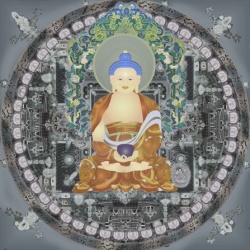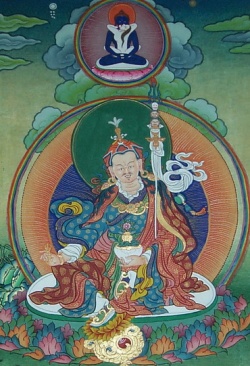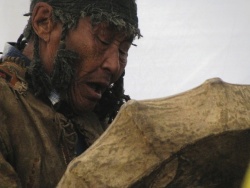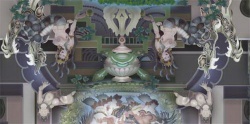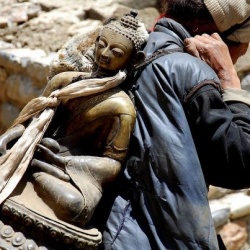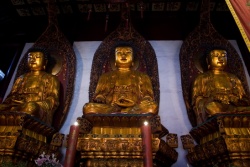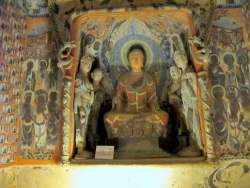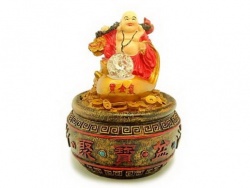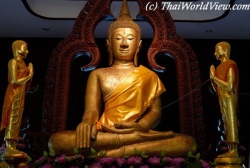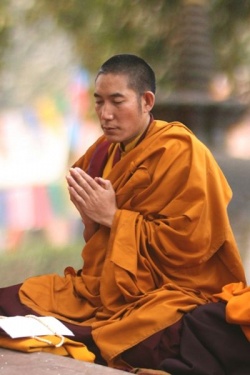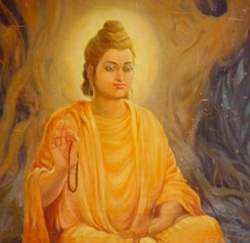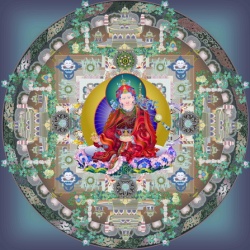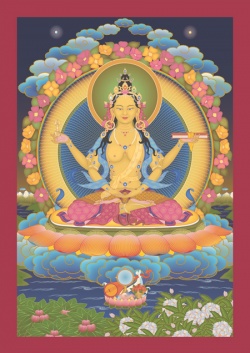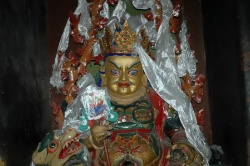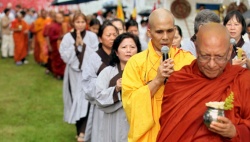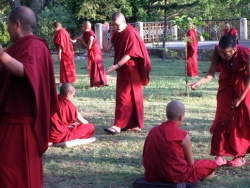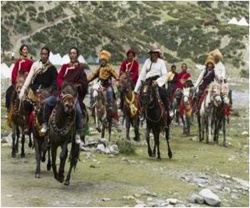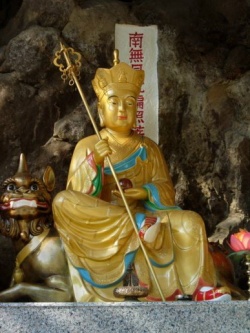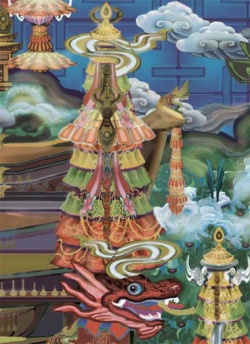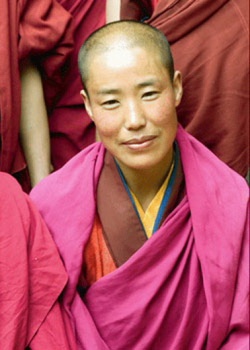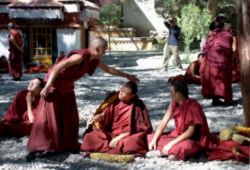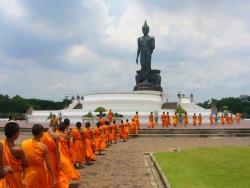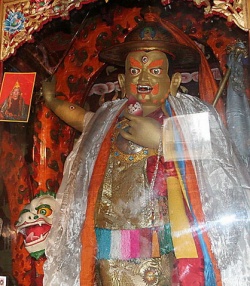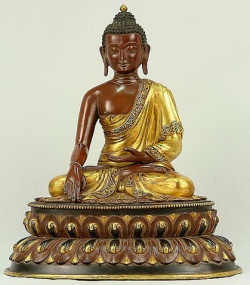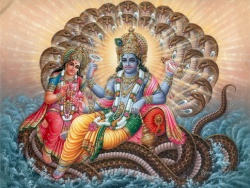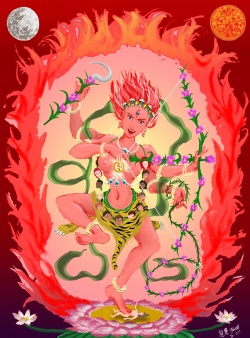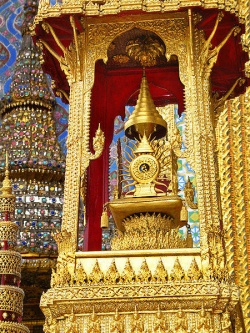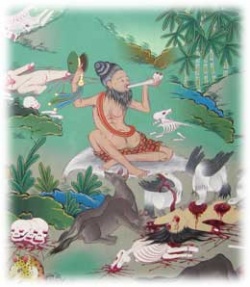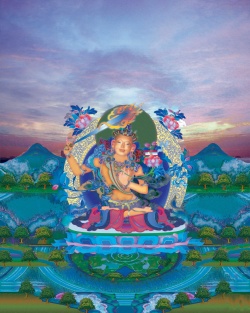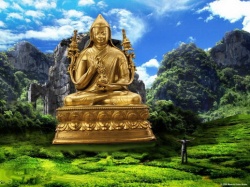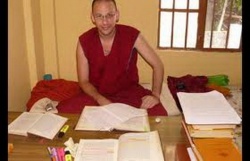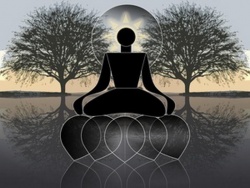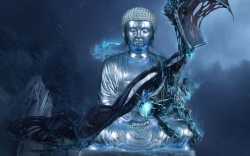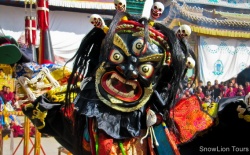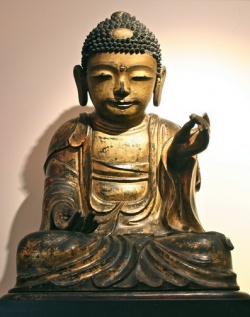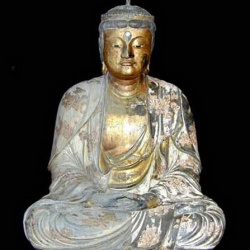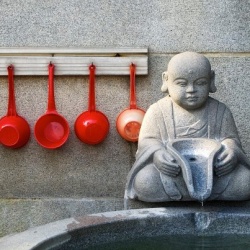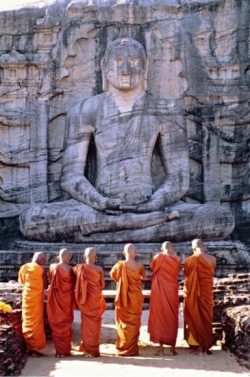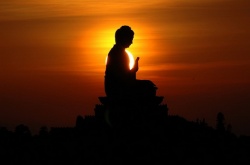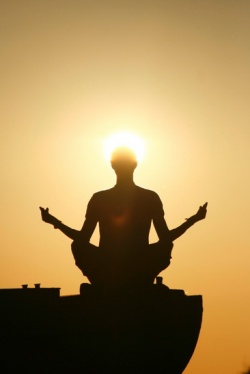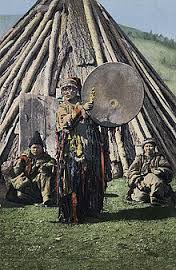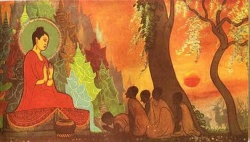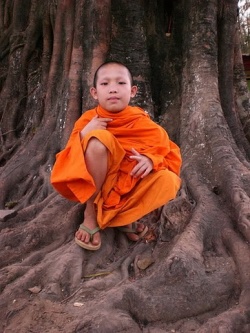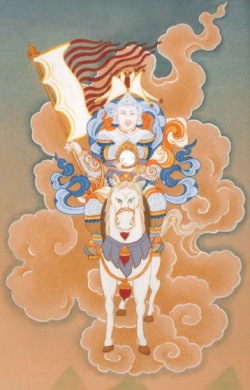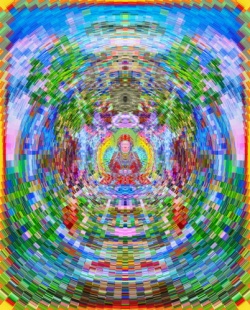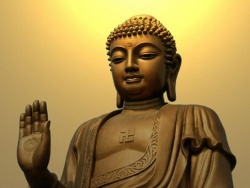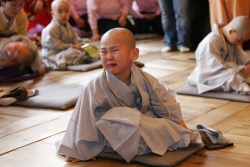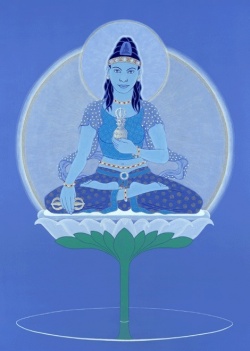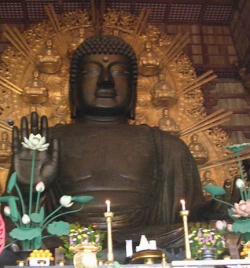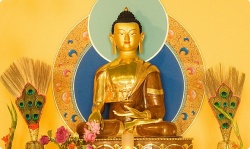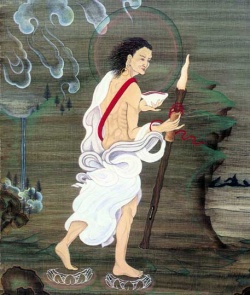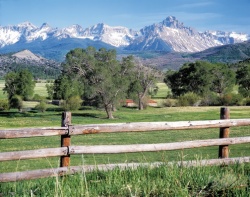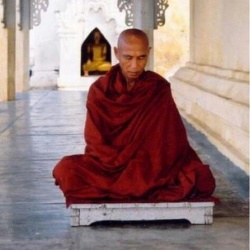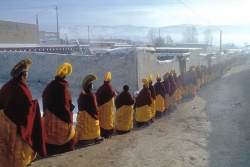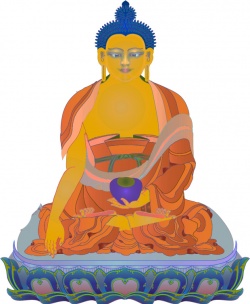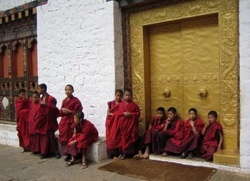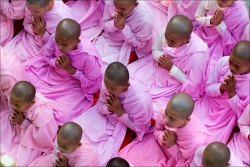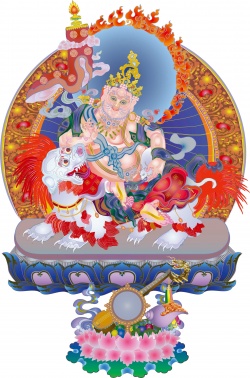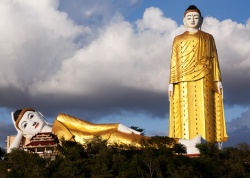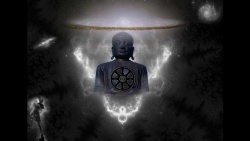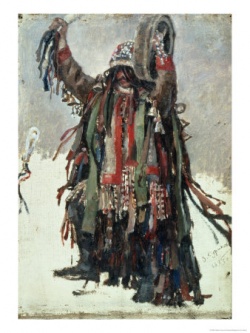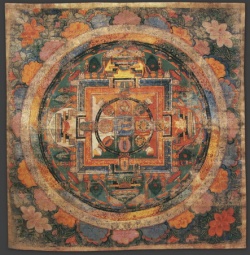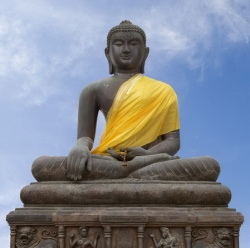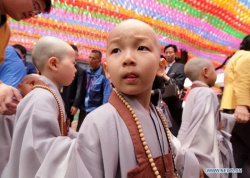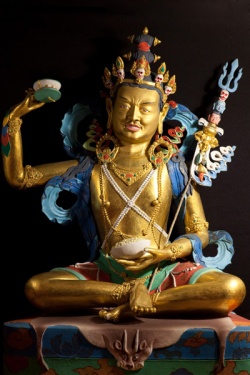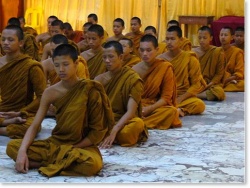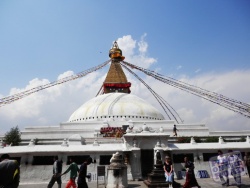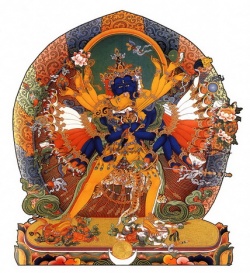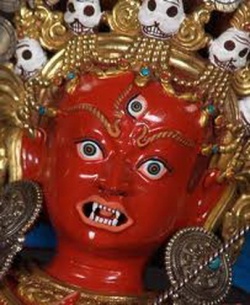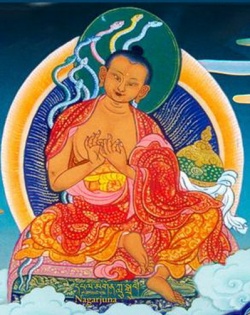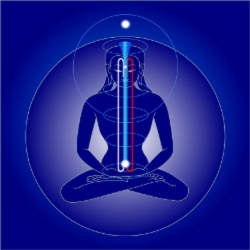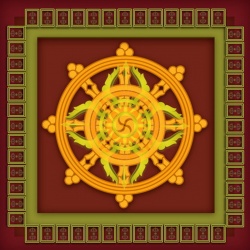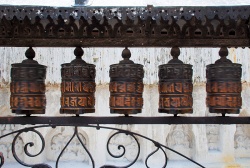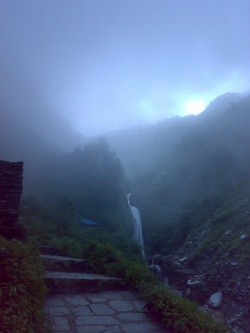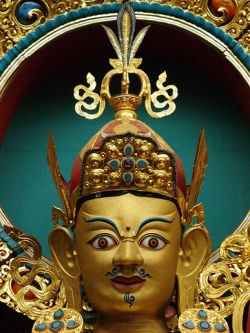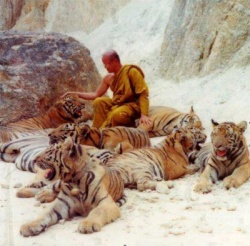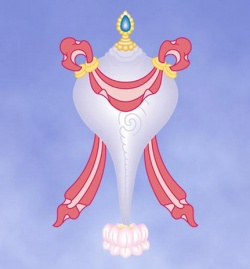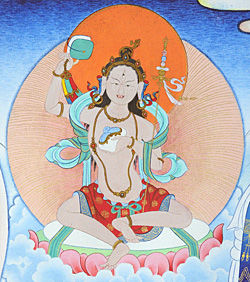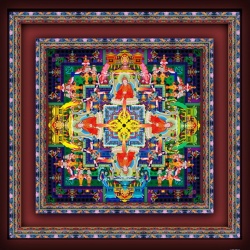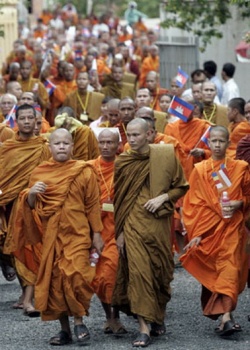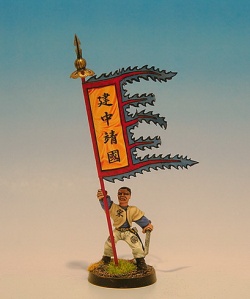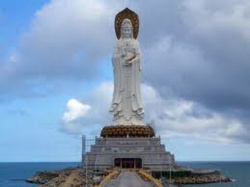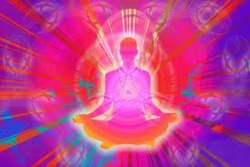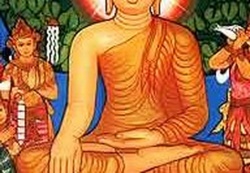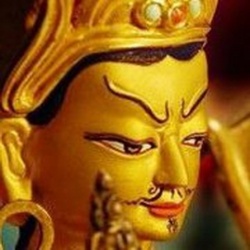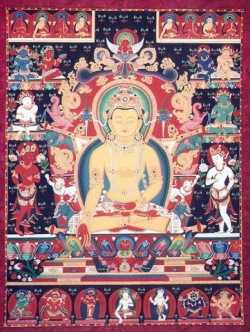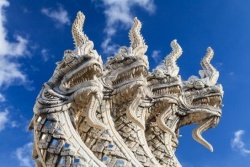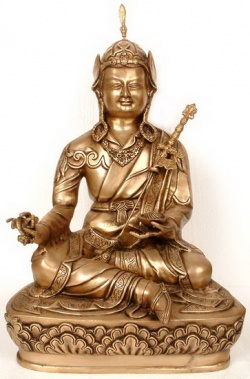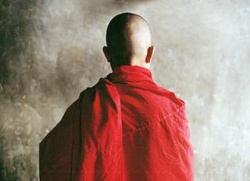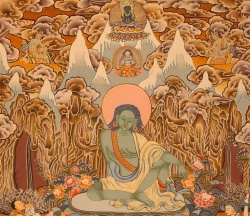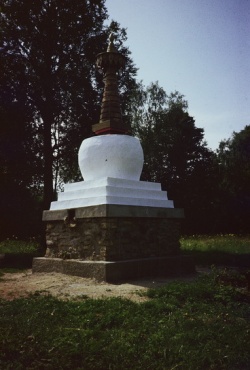Mahayana Mahaparinirvana Sutra: Chapter 22: Bodhisattva Highly-Virtuous King
Mahayana Mahaparinirvana Sutra
Chapter 22: Bodhisattva Highly-Virtuous King
Translated by Kosho Yamamoto from Dharmakshema's Chinese version,
edited and revised by Dr. Tony Page
Copyright for this edition is held by Dr. Tony Page, 2012.
Then the Buddha said to Bodhisattva-mahasattva All-Shining Highly-Virtuous King: "O good man! Any Bodhisattva-mahasattva who practises this great Nirvana Sutra will gain ten virtues. He is not on the same level as the sravaka or pratyekabuddha. This is beyond knowing. Any person who hears this will be surprised. It is neither in nor out, neither difficult nor easy. It is neither outer expression nor non-expression. It is neither secular nor has it any form to represent it. It is not what one comes across in the world.
"What are the ten? The first contains five. What are the five? 1) One who has not heard this can hear it well, 2) having heard it, there is benefit, 3) it well cuts away doubt, 4) the mind of Wisdom is straight and has no bends, 5) one knows the closely-guarded store of the Tathagata. These are the five. How do we hear what we have not heard? This refers to the depths of the closely-guarded doctrine. All beings have the Buddha-Nature. There is no discrimination between Buddha, Dharma and Sangha. The nature and characteristics of the Three Treasures are the Eternal, Bliss, Self, and the Pure. All Buddhas do not, to the very end, enter Nirvana, and are Eternal and Unchanging. The Nirvana of the Tathagata is: not "is" and not "is-not", not that which is created and not that which is not created, not something leakable (defiled) and not something unleakable (undefiled), not matter and not non-matter, not name and not non-name, not phenomenal and not non-phenomenal, not "is" and not "not-is", not substance and not non-substance, not cause and not result, not opposite and not non-opposite, not brightness and not darkness, not appearing and not non-appearing, not eternal and not non-eternal, not disruption and not non-disruption, no begininning and no non-beginning, no past, no future, and no present, no skandha and no non-skandha, no (sense-) sphere and no non-sphere, no (sense-) realm and no non-realm, no 12 links of interdependence and no non-12-links-of-interdependence. All such categorical items are of a nature deep and fine in implication. One can hear what one has not heard before. Also, there are yet things which do not reach one's ear, which are all the sutras of the tirthikas, i.e. the four Vedas, the vyakaranas, the sutras of the Vaisesikas and Kapilas, the works referring to charms, medical arts, handicrafts, the eclipses of sun and moon, the changes in the cycles of the constellations, books and prophecies. In none of these do we hear anything of what is secret. Now, we come to see this in this sutra. Also, there are the eleven types of sutra from which the vaipulya is excluded. And we see no deep and secret things stated there. But such we come to know from this sutra. O good man! That is why we say that we hear what we have not heard before.
"We say that we gain benefit when we hear. If we listen to this great Nirvana Sutra, we come to know all about the depths of what is said in all the vaipulya Mahayana sutras. For example, this is like a mirror, in which a man or woman can clearly see colour and form. It is the same with the great Nirvana Sutra. The Bodhisattva takes this up and clearly sees through all the depths of things stated in the Mahayana sutras. Also, this is like one with a great torch, who is able to see all in a dark room. It is the same with the torch of the Nirvana Sutra. The Bodhisattva takes this up and gains the depths of what is said in the Mahayana sutras. Also, it is like the sun. When it appears, thousands of lights shine over the mountains and gloomy places, and man can clearly see what is far off and distant. It is the same with the pure light of Wisdom of this Great Nirvana. It shines upon all the depths of Mahayana, enabling those of the two vehicles to see the Buddhist teaching. How? Because one hears the all-wonderful doctrine of this Great Nirvana Sutra. O good man! If the Bodhisattva-mahasattva listens to this Great Nirvana Sutra, he will come to know all about the names and letters of all things. If he writes, copies, recites, and explains it extensively to others, and thinks about the meaning, he will know all the significations of all things. O good man! One who hears knows only the name, but not what it signifies. If one truly writes, copies, holds, recites and explains it widely to others, and thinks of the meaning, then one can well know the signification. Also, next, O good man! One who hears this sutra hears that there is the Buddha-Nature, but he cannot easily see it. But if one indeed writes, copies, recites, explains it widely to others and thinks carefully about the meaning, such a one can well see it. A person who listens to this sutra hears about dana, but does not yet see danaparamita. If one indeed writes, copies, recites, explains it widely to others and thinks of the meaning, such a person will well see danaparamita. The same applies to prajnaparamita. O good man! If the Bodhisattva listens well to this Great Nirvana Sutra, he will come to know of Dharma and its meaning; he will become perfect in the two unhinderednesses and will not be afraid of any sramanas, Brahmins, devas, Maras, Brahma, or any of the world. He will expound the 12 types of sutra. There is nothing that differs. Not following and listening to others, he indeed knows and approaches unsurpassed Enlightenment. O good man! That is why we say that we listen and arrive at benefit.
"We say that a person cuts away doubt. Of doubt there are two kinds. One is doubting the name, and the other is doubting the meaning. A person who listens to this sutra does away with the mind that doubts the name; a person who thinks of the meaning cuts away the mind that doubts the meaning. Also, next, O good man! Of doubt, there are five kinds. One is doubting and wondering whether the Buddha truly enters Nirvana or not. The second is doubting whether the Buddha is Eternal or not. The third is doubting and wondering whether the Buddha is true Bliss or not. The fourth is doubting whether the Buddha is truly Pure or not. The fifth is doubting and wondering whether the Buddha is the True Self or not. When one listens to this sutra, one eternally segregates one's self from these four doubts. Also, next, there are three kinds of doubt. First, one doubts whether there is the sravaka or not. Secondly, one doubts whether there is the pratyekabuddha or not. Thirdly, one doubts whether there is the Buddha Vehicle or not. Any person who listens to this sutra eternally excises his self from these three doubts, and no doubt remains. If one writes, copies, recites, and explains it widely to others, and thinks of the meaning, one comes to realise that all beings possess the Buddha-Nature. Also, next, O good man! Any person who does not hear this Great Nirvana Sutra will have much doubt regarding: eternal or non-eternal, bliss or non-bliss, pure or non-pure, Self or non-Self, life or non-life, being or non-being, ultimate or non-ultimate, the other world or the past world, is or nothingness, suffering or non-suffering, cause of suffering or non-cause-of suffering, Way or non-Way, extinction or non-extinction, Dharma or non-Dharma, good or non-good, or Void or non-Void. Any person who hears this sutra will eternally make away with such doubts. Also, next, O good man! Any person who does not hear such a sutra will have various doubts, such as: If matter is the Self? If feeling, perception, volition, or consciousness is the Self? If the eye indeed sees? If the self indeed sees?... down to if consciousness indeed knows? If the Self indeed knows? If matter indeed suffers from karmic results?... down to if consciousness suffers from karmic results? If the Self suffers from karmic results? If matter goes to the other world? If the Self goes to the other world?... down to if consciousness goes to the other world? And such as if the law of birth and death has beginning and end? If it has no beginning and end? Any person who hears this sutra will eternally do away with these kinds of doubt. Or there may be a person who might entertain doubt as to whether the icchantika, those who have committed the four grave offences, those who have enacted the five deadly sins, and those who have slandered Dharma have the Buddha-Nature or not? Any person who hears this sutra eternally does away with all such doubts. Or a person may doubt and wonder if there is a limit to the world or not? Or if there are the ten directions or not? Any person who hears this sutra will eternally do away with any such doubts. This is why we say that it indeed eternally does away with the doubting mind.
"We say that the mind of Wisdom is straight and without bends. If the mind doubts, what is seen cannot be straight. If all beings do not hear this all-wonderful Great Nirvana Sutra, what is seen becomes twisted. This applies down to sravakas and pratyekabuddhas, whose views must also be twisted. Why do we say that what all beings see is twisted? They see the Eternal, Bliss, Self, and the Pure in what is leakable, and impermanence, suffering, impurity, and the non-Self in the Tathagata, and they think that beings have life, and knowing, and seeing. They construe Nirvana as thoughtlessness-non-thoughtlessness, and construe Isvara as having the Noble Eightfold Path. What there is there is the "is" and the "not-is", and all such twisted views. If the Bodhisattva hears this Great Nirvana Sutra and practises the Noble Path, he can make away with all such twisted views. What are the twisted views of the sravakas and pratyekabuddhas? These are thinking that the Bodhisattva descends from Tushita Heaven, that he rides on a white elephant, that he finds himself in the womb of a mother, that the father's name was Suddhodana, and the mother's Maya, that for ten full months he was at Kapilavastu, and was born, that when born and not yet touching the earth Sakrodevendra takes him up, and the naga kings, Nanda and Upananda, shoot out water and bathe him, that the great demon, Manibhadra, holds a gem parasol and stands behind him, that the earth-god holds flowers on which the child places his feet, that he takes seven steps in the four directions, and is satisfied, that as he goes to the temple of the devas, the devas come out and welcome him, that Asita picks him up and prophesies, that having seen the signs he is all sorrow and says: "Woe that I will not be blessed with witnessing the rise of the Buddhist teaching", that he goes to a teacher where he learns writing, reckoning, archery, reading omens, and handicrafts, that living in the royal harem he plays with the 60,000 maids and enjoys himself, that he comes out of the castle and finds himself in the Kapila garden, that on the way he sees an aged man and also a sramana going along the roadside, garbed in a priestly robe, that he returns to the royal palace, where he sees the bodies of the females of the palace looking like white bones, that all the palatial building were now no more to him than graves, that he despises these and renounces home, that at night he slips out of the castle, that he sees such great rishis as Udrakaramaputra and Aradakalama and hears from them about consciousness-boundlessness and thoughtlessness-non-thoughtlessness. Having heard and meditated upon these, he sees that all things are non-eternal, suffering, non-pure, and non-Self. He abandons these, practises penance under a tree and, after six years, sees that penance does not bring him unsurpassed Enlightenment. Then he bathes himself in the waters of River Hiranyavati (Nairanjana) and takes some milk-cooked porridge from the hands of a pasture woman. After taking this, he goes to the Bodhi Tree, where, crushing Marapapiyas, he attains unsurpassed Enlightenment; (then) at Varanasi he turns the Wheel of Dharma and sees that, here at Kusinagara, he enters Nirvana. All such are the twisted views of sravakas and pratyekabuddhas. O good man! The Bodhisattva-mahasattva, when he hears and understands the Great Nirvana Sutra, immediately cuts away all such views. And as he writes, copies, recites, understands, explains to others and thinks about the meaning, he becomes straight-minded and makes away with twisted views. O good man! As the Bodhisattva-mahasattva practises the Way of this Great Nirvana Sutra, he comes to see clearly that the Bodhisattva had never for innumerable kalpas descended from Tushita Heaven into a motherly womb and entered Nirvana at Kusinagara. This is the right view of a Bodhisattva-mahasatttva.
"We say that we well gain the deep meaning of the Tathagata. This is none other than Parinirvana. All beings possess the Buddha-Nature. They repent of the four grave offences, make away with the mind which slanders Dharma, put an end to the five deadly sins, and do away with the icchantika (within themselves). Then they can attain unsurpassed Enlightenment. This is what is meant by the extremely deep and closely-guarded thought. Also, next, O good man! What do we mean by the extremely deep meaning? Beings know that there is no such thing as self. Even so, they cannot make away with the karma fire of the days to come. Though they know that the five skandhas die out here, the karma of good and evil does not die out. Though there are all the actions of karma, there are now no doers. Though there are places to go, there is none who goes (there). Though there is binding, there is no one who is bound. Though there is Nirvana, there is no one who has to die out. That is what is meant by the deepness of meaning."
Then Bodhisattva All-Shiniing Highly-Virtuous King said to the Buddha: "O World-Honoured One! It is difficult for me to arrive at the meaning of what the Buddha says regarding "hearing" and "non-hearing". Why? Because if Dharma is "is", what there must be (there) must be "is"; if it is "not-is", what there must be (there) is "is-not". Nothing can come from nothing; what "is" cannot die out. What is heard must be what is heard. If it is not heard, what there is is what one has not heard. How can one say that what one has heard is what one has not heard? O World-Honoured One! What one cannot hear is what one has not heard. If one has heard it, there is no more of hearing (no longer any yet-to-be-heard). Why not? Because one has already heard it. How can one say that what one has heard is what one has not heard? For example, this is similar to the case where when a person who has gone has come, he is not gone; if he has gone, he has not come. If one is born, there is no being born; if not born, there is no being born. When something has been gained, there is no longer any gaining (of that). If it is not gained, there is no gaining. If not heard, there is no more of hearing; if not heard, there is no hearing any more. The case is like this.
"O World-Honoured One! A person might say that he has heard what he has not heard. As all beings have not yet gained Enlightenment, this can well be had (can well happen). When Nirvana has not yet been gained, one may well gain it. When the Buddha-Nature has not yet been seen, one might well see it. How can one say that the Bodhisattva of the stage of the ten “bhumis” sees the Buddha-Nature, but is not yet quite clear in (his seeing of) it? O World-Honoured One! One may well say that non-hearing is hearing. O Tathagata! From whom did you once hear in the past? If it is said that you did hear, how could you say in the Agamas that you had no teacher? If having not heard is not heard, and if the Tathagata did attain unsurpassed Enlightenment, beings' not having heard must mean the attaining of unsurpassed Enlightenment. O Tathagata! If one can see the Buddha-Nature even without having heard this Great Nirvana Sutra, all beings must also be able to see it, even though they have not heard it.
"O World-Honoured One! Colour is both visible and not visible. The same with sound. It is either audible or non-audible. This Great Nirvana is neither colour nor sound. How can one say that one can well see or hear (it)? O World-Honoured One! If the past is what is already gone, it is not audible. As the future has not yet arrived, one cannot hear it. One can say that one hears now, but one cannot say that one has heard. When heard, the voice dies out and one cannot possess it any longer. This Great Nirvana is not of past, future, or present. If not of the Three Times, there can be no explaining. If inexpressible, there can be no hearing. How can we say that the Bodhisattva practises the teaching of this Great Nirvana Sutra and say that he hears what he has not heard?"
Then the Buddha, praising Bodhisattva All-Shining Highly-Virtuous King, said: "Well said, well said! You now know well that all things are like phantoms, flames, a gandharvan castle, a picture on the surface of water, and also like foam and plantain trees, which are empty and contain nothing therein. All have no life, no Self, no suffering, and no bliss. This is similar to the case of the Bodhisattva of the stage of the ten “bhumis”, who knows and sees things."
Then, of a sudden, there flashed out over the congregation a great light. It was not blue, and yet it was blue; not yellow, and yet it was yellow; not red, and yet it was red; not white, and yet it was white; not a colour, and yet there was colour (there); not bright, and yet it was bright; not visible, and yet it was visible. Then, the great congregation, on encountering this light, felt their bodies and minds all joy and happiness. This was as with a bhiksu who now dwells in the “Lion-King Dhyana”.
Then Bodhisattva Manjushri said to the Buddha: "O World-Honoured One! Who emits this light now?" Then the Tathagata was silent and said nothing. Bodhisattva Kasyapa also asked of Manjushri: "Why does this light shine upon us?" Manjushri was silent and did not reply. Then Bodhisattva Boundless-Body also asked Bodhisattva Kasyapa: "Whose is this light?" Bodhisattva Kasyapa was silent and said nothing. Bodhisattva Pure-Abode Prince asked Bodhisattva Boundless-Body: "Why does this great light appear to all this great congregation?" Bodhisattva Boundless-Body was silent and said nothing. So did it go with the 500 Bodhisattvas. Though asked, there was none there who made reply.
Then the World-Honoured One asked Manjushri: "Why is there this light over this great mass of people?" Manjushri said: "O World-Honoured One! We call this light Wisdom. Wisdom is what eternally is. The Dharma Eternal has no causal relations. Why do you, the Buddha, ask me about this light? This light is the Tathagata. The Tathagata is Eternal. The Dharma Eternal is not grounded on causal relations. How does it come, then, that the Tathagata asks me for the reason?
"This light is Great Loving-Kindness and Great Compassion. Great Loving-Kindness and Great Compassion are Eternal. The Dharma Eternal is not grounded on causal relations. Why does the Tathagata ask me about causal relations? This light is the meditation on the Buddha. The meditation on the Buddha is the Dharma Eternal. The Dharma Eternal is not erected upon the path of causal relations. Why should the Tathagata ask me about causal relations? This light is the Way that does not obtain with any sravakas or pratyekabuddhas. The Way that does not obtain with sravakas and pratyekabuddhas is Eternal. The Dharma Eternal is not built upon the path of causal relations. Why does the Tathagata ask me about causal relations? By doing away with ignorance, one gains the burning flame of unsurpassed Enlightenment."
The Buddha said: "O Manjushri! Do not enter into the all-wonderful depths of the “Paramartha-satya” of all dharmas. Explain things by means of secular truth." Manjushri said: "O World-Honoured One! To the east, beyond worlds as numerous as the sands of 20 Ganges, is a world called "Acala". The site where the Buddha of that country resides is extensive and all-equal and is as large as 12,000 yojanas lengthwise and crosswise. The ground is made of jewels and has no earth or stones. All is flat and soft, and there are no ditches or pits. All the trees are made of the four gems, namely, gold, silver, beryl, and crystal. Flowers and fruits are in abundance, and there is no time when these are not present. As people come into contact with the flowers and their fragrance, their body and mind experience peace and bliss, which can be likened to a bhiksu sitting in the third dhyana. And there are 3,000 great rivers that surround the land. The water is delicate and wonderful and is perfect in the eight tastes. The people who bathe in it experience joy and bliss comparable to the state of a bhiksu in the second dhyana. The rivers contain various flowers, such as the utpala, padma, kumuda, pundarika, the fragrant, the greatly fragrant, the wonderfully fragrant, the nitya, and the bloom that unhinderedly protects all beings. Also, on both banks are numerous flowers, such as the atimuktaka, campaka, pataliputra, varsika, mallika, mahamallika, simmallika, sumana, yukthika, dhanika, nitya, and the bloom that unhinderedly protects all beings. The river-bed is of golden sand, and there are flights of stairs on the four sides, made of gold, silver, beryl, and crystal of mixed colours. Numerous birds fly over these. Also, there live many tigers, wolves, lions, and all kinds of evil birds and beasts (there), all of whom, however, regard one another with the mind of a baby. There is in that land no one who carries out the grave offences, nor are there those who slander Dharma, nor are there any icchantikas, nor those who have committed the five deadly sins. The land is good and fit, so that there is no cold or heat, and no sufferings from famine or thirst; no greed, anger, indolence or jealousy reign there; there is no talk of sun and moon, no day and night, and there are no seasons; all obtains as in Trayastrimsa Heaven. The people of that land shine and have no arrogance in their mind. All are Bodhisattva-mahasattvas; all possess divine powers and great virtues, and their minds look up to Wonderful Dharma. They ride in the Mahayana, love the Mahayana, die for, and protect, the Mahayana. They are accomplished in great Wisdom, are perfect in the Mahayana, and always pity all beings. The Buddha of that land is Tathagata-Full-Moonlight, who is an Alms--Deserving, All-Enlightened One, an All-Accomplished One, a Well-Gone, an All-Knower, an Unsurpassed One, Best Trainer, and Teacher of Gods and Humans, a Buddha-World-Honoured One. He delivers sermons where he resides. And there is not a single land that cannot indeed hear (them). He delivers a sermon on the Great Nirvana Sutra to Bodhisattva Vaiduryaprabha. "O good man! If a Bodhisattva-mahasattva thoroughly practises the Way of the Great Nirvana Sutra, those who cannot actually hear can also hear." This Bodhisattva-mahasattva Vaiduryaprabha questions Buddha Full-Moonlight as Bodhisattva All-Shining Highly-Virtuous King (questions me). All is the same, and there is nothing different.
"Buddha Full-Moonlight said to Bodhisattva Vaiduryaprabha: "O good man! Far out to the west, beyond as many lands as sands of 20 Ganges, there is a land called "Saha". In that, there abound mountains, hills, mounds, sand, gravel, thorns, and poisonous thorns. There are always the sufferings of hunger, thirst, cold, and heat (there). The people of that land do not respect sramanas, Brahmins, parents, teachers, or elders. They greedily cling to unlawful acts, practise wrong actions, and do not believe in Wonderful Dharma. Their life is short. Those who cunningly cheat others are cured (punished) by the king. The king possesses territories, but is not satisfied. He covets what others possess. He calls forth wars and fights, and many meet with untimely deaths. As the king acts thus, the four guardians of the earth and good devas cannot have an easy mind. So calamities and famines come about, and the five cereals do not grow well. People suffer from illnesses and suffering goes on unendingly. There lives a Buddha (there) called Tathagata Shakyamuni, an Alms-Deserving, an All-Enlightened One, an All-Accomplished One, a Well-Gone, an All-Knower, an Unsurpassed One, Best Trainer, Teacher of Gods and Humans, and a Buddha-World-Honoured One. All-compassionate and kind-hearted towards all beings, he is delivering sermons on the Great Nirvana Sutra to all beings, at Kusinagara, between the sal trees. There is a Bodhisattva there called All-Shining Highly-Virtuous King. Already he asks about this and nothing differs (here) from what you ask. The Buddha is now answering. Make haste and go there! You will hear (things) yourself." O World-Honoured One! That Bodhisattva Vaiduryaprabha, on hearing this, is coming with 84,000 Bodhisattva-mahasattvas. Hence this premonition. Because of this, we have this light. That is why. And yet it is not why."
Then Bodhisattva Vaiduryaprabha arrived, accompanied by 84,000 Bodhisattvas and bearing, along with various banners and parasols, incense, flowers, garlands, and various kinds of music, double that which had gone before. All came to Kusinagara, between the sal trees. Offering what they had brought to the Buddha, they touched his feet with their heads, folded their hands together, paid homage, and thrice walked around the Buddha. Having paid homage, they sat down to one side.
Then the World-Honoured one asked that Bodhisattva: "O good man! Have you arrived or not?" Bodhisattva Vaiduryaprabha said: "O World-Honoured One! "Arrived" is not "come", and "not arrived" is also not "come". As I think of this, there is no coming at all. O World-Honoured One! Even if all things were eternal, it would also be not "come"; even if it is "non-eternal", there is no coming. If one thinks that man has a nature, there is coming and no coming. I now do not see any eternally fixed nature in beings. How can I say "to have come" or "not to have come?" With an arrogant person, there can be going and coming; with one without arrogance, there can be no coming and going. With one who is leaving, there can be talk of going and coming; with one without the leaving mind, there is no talk of going and coming. If one thinks that the Tathagata ultimately enters Nirvana now, there is going and coming; if one does not think that the Tathagata ultimately enters Nirvana, there can be no going and coming. If one does not hear of the Buddha-Nature, there can be going and coming; with one who hears of the Buddha-Nature, there can be no going and coming. With one who thinks that there is Nirvana with the sravakas and pratyekabuddhas, there is going and coming; with one who does not see any entering into Nirvana with the sravakas and pratyekabuddhas, there can be no going and coming. If one sees the Eternal, Bliss, the Self, and the Pure with the sravakas and pratyekabuddhas, there is going and coming; if not, there is no going and coming. If one views the Tathagata as not the Eternal, Bliss, the Self, and the Pure, there is going and coming; if one sees the Eternal, Bliss, Self, and the Pure with the Tathagata, there cannot be any going and coming. O World-Honoured One! Leave this matter as it is for the present. I desire to ask more. Please condescend to give ear to me!"
The Buddha said: "O good man! Ask as you wish to ask. It is now time. I shall now makes things clear and explain them to you. Why? Because it is hard to encounter a Buddha, as it is difficult to come across the blooming of the udumbara. It is the same with Dharma. It is difficult to hear it. Of the 12 types of sutra, the hardest to hear is the vaipulya. For this reason, listen with undivided attention."
Then Bodhisattva-mahasattva Vaiduryaprabha obtained permission and also admonition. And he said to the Buddha: "O World-Honoured One! How can a Bodhisattva-mahasattva practise the Great Nirvana Sutra? I wish to hear what I have not heard before."
Then the Tathagata praised him, saying: "Well said, well said, O good man! You now desire to cross the sea of the Great Nirvana of Mahayana. And you rightly encounter my sermon. I shall now become a great doctor and thoroughly extract the poisonous arrows of diverse doubt. You are not yet clear as to the Buddha-Nature. I possess the torch of Wisdom and shall well enlighten you. You now desire to cross the great river of birth and death. I shall now become a mariner for you. You see in me the parent, and I see in you the small child. Your mind is now dying for the treasures of Wonderful Dharma. I have much and can stand giving. Listen clearly to me, listen clearly to me! Bethink yourself well! I shall now make things clear and explain them to you. O good man! It is now time for you to hear Dharma. Having heard it, believe it and gain a respectful mind. Listen with all your mind; venerate what you have heard. Do not seek to pick out something wrong in Wonderful Dharma! Think not of greed, anger, and ignorance. Think not of good and bad or of the caste of the priest. Having heard Dharma, be not arrogant. Do not do things for honour, fame, or profit. Make effort to save the world, and for the interest of sweet Dharma. Also, do not be worried in mind. Hear Dharma, save yourself, and then save others. First, understand yourself, and let others understand. First, ease yourself, and then ease others. First, gain Nirvana yourself, and then let others gain it. See with an equal mind Buddha, Dharma and Sangha. See birth and death as great suffering. See in Great Nirvana the Eternal, Bliss, the Self, and the Pure. First act for others, and then for your own self. Act for Mahayana and not for the two vehicles. Do not cling to anything. Do not cling to the characteristics of any thing. Do not be greedy towards anything. Always try to understand and see Dharma. O good man! If you give ear to Dharma with such an attitude, this is how one hears what one has not heard before.
"O good man! There is a hearing, when one has not heard; there is a non-hearing when one has heard; there is a hearing when one has heard. O good man! There is a birth, without being born; there is no being born, without being born; there is no being born, having been born; there is a being born, having been born. Similarly, there is an arriving, not having arrived; there is no arriving, not having arrived; there is no arriving, having arrived; there is an arriving, having arrived."
"O World-Honoured One! What is being born, not having been born?"
"O good man! Abiding peacefully in secular truth, one first comes out of the womb. This is being born, having not yet been born."
"What is not being born, not having been born?"
"O good man! This Great Nirvana has no aspect of being born. This is not being born, having not been born."
"What is not being born, having been born?"
"O good man! Death comes in secular truth. This is not being born, having once been born."
"What is being born, having been born?"
"O good man! All common mortals are those who are born by having been born. Why? Because there is no disruption in being born and being born, and because all leakings (defilements) follow moment upon moment. This is being born, having been born. The Bodhisattva of the four abodes (“bhumis”) is no being born, having been born. Why? Because he is unmolested in being born. This is a non-being-born, having been born. O good man! This is what obtains within the Buddhist teaching."
"What are: being born, having not yet been born; not yet being born, having not yet been born; not being born, having been born; and being born, having been born, as said in other teachings?"
"O good man! Let us take the case of a seed. When it is not yet born, the great elements conjoin, man acts, and it first burgeons out into a bud. This is being born, having not yet been born."
"What is not being born, having not yet been born?"
"For example, the case of a dead seed and its not meeting with the (necessary) conditions is that of "not born, having not been born."
"What is not born, having been born?"
"This is as when the seed has shot forth its bud, but there is no growth. This is a case of not born, having been born?"
"What is being born, having been born?"
"This is as with the growing of the bud. If what is born does not grow, there is no increase. All such aspects of the leakable (i.e. the defiled) are cases of being born, having been born, as stated in the categories of other teachings."
Bodhisattva-mahasattva Vaiduryaprabha said to the Buddha: "O World-Honoured One! If it is the case that any being is born in what is leakable, is it eternal or non-eternal? If what is born is eternal, then there cannot be any being born in what is leakable. If being born is non-eternal, what is leakable must be the eternal. O World-Honoured One! If what is born can well be born by itself, there cannot be any nature of its own. If it can well call forth another life, why can it not call forth the unleakable (i.e. that which is undefiled)? O World-Honoured One! If there is life when not yet born, how can we speak of being born? When there is no life when not yet born, why do we not call space life?"
The Buddha said: "Well said, well said, O good man! "Born, not having been born" is inexpressible; "born, having been born" is inexpressible; "not born, having been born" is inexpressible; "not born, not having been born" is also inexpressible; being born is also inexpressible; not being born is also inexpressible. As there are causal relations, we can well explain (things).
"How is it that being born, not having been born is inexpressible?
"Not born is born. How can we explain? Why? Because of the fact that there is being born.
"How is it that what is born is born is inexpressible?
"For there is the being born because what is born is born; for there is not being born because being born is born. Hence, inexpressible.
"Why is being born is not being born inexpressible?
"What is born is called born; being born does not come about by itself. Hence, inexpressible.
"Why is not born, not having been born inexpressible?
"Not being born is Nirvana. As Nirvana is not being born, it is inexpressible. Why? Because one gains it by practising the Way.
"Why is being born inexpressible?
"Because being born is emptiness itself.
"Why is not being born inexpressible?
"Because there is the possibility of gaining it.
"Why is it expressible for causal reasons?
"Because the ten causal relations can constitute the cause of being born. Hence, it is possible to explain.
"O good man! Do not get into the deepest depths of the All-Void dhyana. Why not? Because the great mass of people is dull.
"O good man! In what is created, birth is eternal. As it lives in the non-eternal, birth too is non-eternal.
"Abiding, too, is eternal, because being born is being born. Abiding is also non-eternal.
"Difference (i.e. change), too, is eternal. As the law (a dharma) is non-eternal, difference is also non-eternal.
"Breaking up (dissolution) is also eternal. Because it is originally empty, but now exists. Hence, breaking up is also non-eternal.
"O good man! Being born, abiding, difference, and breaking up are all eternal. As there is extinction moment after moment, one must not say eternal. As this Great Nirvana is disrupted and dies out, we say non-eternal. O good man! Whatever is defiled already has the nature of being born, when it is not yet born. For this reason, being born comes about. What is undefiled has from the beginning no nature of being born. Hence, being born cannot come about.
"The original quality of fire calls forth fire when conditions so arise.
"The eye has the nature of seeing and sees by colour, light, and mind. The same applies to the being born of beings. As there is the original nature, it can come about, meeting with the causal relations of karma and by the coming together of the parents, which is life."
Then Bodhisattva Vaiduryaprabha and the 84,000 Bodhisattva-mahasattvas, on hearing this sermon, jumped for joy and remained suspended in the sky seven talas high. With respect and folding their hands, they said to the Buddha: "O World-Honoured One! Having been enlightened by the Tathagata in kindly ways, I now understand what one hears and what one does not hear of Great Nirvana. Also, the 84,000 Bodhisattvas have gained the depths of the being born and the not being born of all things. O World-Honoured One! I now understand all and have done away with all doubts. But among the Bodhisattvas congregated here, there is one called "Fearless". He respectfully desires to ask a question. Please deign to answer."
Then the World-Honoured One said to Bodhisattva Fearless: "O good man! Ask whatever you desire to ask. I shall now state things clearly to you."
Then Bodhisattva Fearless, along with his 64,000 Bodhisattvas, stood up from their seats, put their robes in order, prostrated themselves on the ground and said to the Buddha: "O World-Honoured One! How can the people of this world act and gain birth in that immovable world? By what Wisdom can the Bodhisattva of the land become the elephant king of all men? How can he possess great virtues and practise the Way, and how, with the sharpest of Wisdom, can he understand what he hears?"
Then the World-Honoured One said in a gatha:
"One who does not injure
The life of beings and strongly
Upholds the prohibitions,
And who learns the Buddha's all-wonderful teaching
Gains birth in the land immovable.
Not stealing the wealth of others,
And always giving to all others,
And erecting the catur-desa
(an abode where monks coming from other places can stay and live),
One gains birth in the land immovable.
Not raping others' women,
Not acting unduly towards one's own wife,
And giving bedding to those who uphold sila,
One gains birth in the land immovable.
Not seeking profit for one's own
Or for others' sake,
Not having fear, and guarding one's own mouth,
Not telling lies, one will thus
Be born in the land immovable.
Not hurting a good teacher of the Way,
Keeping evil kindred at a distance,
And using gentle words, one gains
Birth in the land immovable.
Like all Bodhisattvas, one segregates
One's self from evil speech,
And people desire to hear what one says.
Such a person will gain birth
In the land immovable.
Even in a joking way,
No untimely word is used,
And one always speaks at the apt time.
Such a person will gain birth
In the land immovable.
One is always glad when one sees
Others gaining benefit and one has
No jealous mind. Such a person will
Gain birth in the land immovable.
One causes no worries to others,
Is ever compassionate,
And never enacts evil as a means.
Such a person gains birth in the land immovable.
If not evil in mind,
Not saying that there can be no dana,
No parents, no past, and no future,
And if one does not hold such a view of life,
One gains birth in the land immovable.
On the wayside of a wide and extensive stretch of land,
One digs a good well, plants fruit trees,
And makes gardens and always gives food to those who beg.
Such a person gains birth in the land immovable.
If one offers a fragrant lamp or a flower
To the Buddha, the Dharma, and the Sangha,
One gains birth in the land immovable.
If out of fear, or for profit, or for blessings
A person writes even a gatha of this sutra,
Such a one will gain birth
In the land immovable.
If, even for profit, a person in a day
Recites this sutra, that person will gain
Birth in that land immovable.
If one, for the sake of the unsurpassed Way,
For a day or night upholds the eight pure actions,
One gains birth in the land immovable.
If one does not sit together with those
Who commit the grave offences
And reproaches those who slander the vaipulya,
One gains birth in the land immovable.
If one gives even a piece of fruit
To one who is suffering from illness
And looks upon such a person with happy and sweet looks,
Such a one will gain birth in the land immovable.
If one does not spoil (defile) the priestly robe,
Guards well the things that belong,
Or are offered to, the Buddha, and sweeps
The ground where the Buddha and the Sangha live,
Such a person will gain birth in the land immovable.
If one makes statues that are big
And erects Buddhist stupas as large
And if one is glad at heart,
Such a person gains birth in the land immovable.
If one, for this sutra,
Gives one's self or wealth to those who preach,
Such a one gains birth
In the land immovable.
If one gives ear to,
And copies, the undisclosed store of all Buddhas,
Upholds and recites it,
Such a person gains birth
In the land immovable."
Then Bodhisattva-mahasattva Fearless said to the Buddha: "O World-Honoured One! I now see that by what I do I gain birth in that land. If the Tathagata will condescend to explain what Bodhisattva-mahasattva All-Shining Highly-Virtuous King asks for the sake of all beings, this will benefit and give peace to all such as humans, gods, asuras, gandharvas, garudas, kimnaras, mahoragas, and others."
Then the World-Honoured One said to Bodhisattva-mahasattva All-Shining Highly-Virtuous King: "Well said, well said! O good man! Listen well with all your mind. I shall now explain it to you in detail. By causal relations, there can be one not yet arrived, by not arriving; by causal relations, there is one arrived, not arriving; by causal relations, there can be one who has not yet arrived, having already arrived; by causal relations, there can be one who is arrived, having already arrived. How is there one who is not yet arrived, by not arriving?
"O good man! Now, "non-arriving" is Nirvana. Common mortals are not yet arrived, because of greed, anger, and ignorance, because their bodily and oral actions are impure, because a person receives all impure things, because he commits the four grave offences, because he slanders the vaipulya, because of his being an icchantika, because of his enacting the five deadly sins: for all these reasons, a person is one who is not yet arrived at "non-arriving".
"O good man! How is one arrived, having not yet arrived? Non-arriving is Great Nirvana. Why is one arrived? Because one eternally cuts away greed, anger and ignorance, and all evil actions of body and mouth; because one does not receive impure things; because one does not perform the four grave offences; because one does not slander the vaipulya sutras; because one does not become an icchantika, and because one does not commit the five deadly sins. For these reasons, we say that one arrives, having not yet arrived. Now, the srotapanna arrvies after 80,000 kalpas, the sakrdagamin arrives after 60,000 kalpas, the anagamin after 40,000 kalpas, and the arhat after 20,000 kalpas, and the pratyekabuddha after 10,000 kalpas. For this reason, we say that one has arrived, while not yet having arrived.
"O good man! How is a person arrived, having already arrived? "To arrive" corresponds to the 25 existences. All beings are always overshadowed by innumerable defilements and bonds, which come and go, never parting, as with a rotating wheel. This is arriving. Sravakas, pratyekabuddhas and all Bodhisattvas are eternally segregated from these. Hence, "non-arriving". To succour beings, manifestation is enacted amidst them. Hence, "having arrived".
"O good man! Why do we say having arrived by having arrived? "To arrive" relates to the 25 existences. Such are the things of defilement of all common mortals, srotapannas, up to anagamins. Thus we say having arrived, having arrived.
"O good man! The same applies to what one has heard and what one has not heard. These are the instances of "hearing, not having heard", "not hearing, having not heard", "not hearing, having heard", and "hearing, having heard".
"What is "hearing, not having heard"? O good man! "Not hearing" is Great Nirvana. Why "not hearing"? Because of not being created, because it is not a sound, because it cannot be explained. Why "hearing"? Because one can hear the names, which are the Eternal, Bliss, Self, and the Pure. Hence, "hearing, not having heard."
Then Bodhisattva-mahasattva All-Shining Highly-Virtuous King said to the Buddha: "O World-Honoured One! You, the Buddha, say that Great Nirvana cannot be heard. How is it that the Eternal, Bliss, Self, and the Pure cannot be heard? Why not? O World-Honoured One! You say that a person who has made away with defilement is one who has attained Nirvana. One not yet cut free from defilement is one who has not yet gained it. Thus the nature of Nirvana is "what originally was, is not now". If what applies in the world is "what originally was, is not now", this is the non-Eternal. It is as with a pot, which is what originally was, but is not now, and what once was which now returns to not-is, and which is the non-Eternal. If Nirvana is thus, how could we speak of the Eternal, Bliss, Self, and the Pure? Also, next, O World-Honoured One! What can arise by adorning is non-Eternal. If Nirvana is such, it must be non-Eternal. What are the causal relaitons? The 37 elements assisting towards Enlightenment, the six paramitas, the four limitless minds, physiognomical forecasting, the anapana, the six thinkings all crush the six great elements. All these items constitute the cause and condition to call forth Nirvana. Hence, non-eternal. Also, next, O World-Honoured One! Whatever is "is" is non-Eternal. If Nirvana is "is”, Nirvana must be non-Eternal. This is what obtains in the agamas, in which you said that the sravaka, pratyekabuddha, and the All-Buddha-World-Honoured One all have Nirvana. Hence, non-Eternal. Also, next, O World-Honoured One! Whatever is visible is non-Eternal. This is as when the Buddha said before that one who can see Nirvana can well cut away defilement. Also, next, O World-Honoured One! For example, this is like space, which does not molest (hinder) any beings. So, we say Eternal. If Nirvana is Eternal, why are there those who gain and who do not gain? If Nirvana is thus and is partial with beings, how can we call it Eternal? O World-Honoured One! For example, 100 people have an enemy. If this enemy is made away with, all have peace. If Nirvana is impartial, this must mean that if one gains it, many must gain it. If one person cuts off bondage, many persons must be able to cut off bondage. If things are not thus, how can there be the Eternal? For example, a man respects, makes offerings to, honours and praises the king, prince, his parents, teachers and elders, and there is benefit. This is not Eternal. The same is the case. Why? You, the Buddha, said in the agama to Ananda: "If one truly respects Nirvana, one cuts off bondage and perfects immeasurable bliss." So, we do not say Eternal. O World-Honoured One! If there are such as the Eternal, Bliss, Self, and the Pure, we cannot call Nirvana Eternal. If there are no such, how can we explain the matter?"
Then the World-Honoured One spoke to Bodhisattva-mahasattva All-Shining Highly-Virtuous King: "The true quality of Nirvana is not that of something that originally was not but now is. If Nirvana were what originally was not but now is, it could not be anything unleakable (undefiled) and Eternal. The nature and characteristics of the phenomenal Buddha and the noumenal Buddha are Eternal and all-abiding. As defilements spread over beings, they cannot see Nirvana. And they say that is does not exist. As the Bodhisattva makes effort and cultivates his mind with sila, meditation, and Wisdom, and excises defilement, he sees it. Know that Nirvana is what is Eternal. It is not what originally was not but now is. So, we say Eternal.
"O good man! There is a dark room, in which there is a well where there are seven different treasures. Though one knows that they are there, since it is dark, one cannot see them. One who is wise knows the means. He lights a big lamp, carries this (into the room), illuminates the place, and sees all. Now, this person does not think that there were orginally no water and seven treasures, but he thinks that they were there. It is the same with Nirvana. It is not that it originally was not but happens to come about now. Due to the darkness of defilement, beings do not see it. The Great WIsdom, the Tathagata, puts into effect the best expedients, lights the lamp of Wisdom, and enables all Bodhisattvas to see the Eternal, Bliss, the Self, and the Pure of Nirvana. Thus the wise must not say that Nirvana is what originally was not, but now is.
"O good man! You say that Nirvana is made by adornment and that it must be non-Eternal. But this is not so. Why not? O good man! The body of Nirvana is not one that is born, that departs, that is actual, or that is false. It is not one worked out (bodied forth). It is not defiled, not what is created. It is not hearing, nor anything visible, not something fallen: it is no death. It is not a different phase of phenomena, nor is it of the same form. It is no going and no returning. It is no past, no future, and no present. It is not one, not many, not long, not short, not round, not square, not pointed, not bent. It is no phenomenon, no mental image, no name, no matter, no cause, no result, no self, and not what one possesses. For this reason, Nirvana is Eternal and enduring, and does not change. Because of this, one practises good for innumerable asamkhyas of kalpas, one adorns ones's own self, and then one can see.
"O good man! As an example: there is an underground water of eight tastes, and yet no one can get at it. One who is wise devises a means, digs, and gets to it. The case is the same with Nirvana. For example, a blind person cannot see the sun or moon. But when a good doctor effects a cure, he can then see. And it is not that the sun and moon have come about but now. It is the same with Nirvana. It has already existed by itself, and it is not that it is something that happens to come into existence now.
"O good man! A man commits a crime and is chained up in a prison house. After a long time, he is released. Coming back home, he now sees his parents, brothers, wife, children and relatives. The case is the same with Nirvana.
"O good man! You say that Nirvana is non-Eternal due to causal relations. But this is not so. Why not?
"O good man! There are five kinds of cause. What are the five? They are: 1) cause of birth, 2) cause of harmonisation, 3) cause of being as it is, 4) cause of growth, and 5) cause of far out (indirect).
"What is the cause of birth? It is based on karma, defilements, etc., and all such seeds of the external category as plants and grass. These are the causes of birth.
"What is the cause of harmonisation? This is none other than the harmonisation between good and the good mind, non-good and the non-good mind, indefinable (“avyakrta”) and the indefinable mind. This is the cause that can be talked of as harmonisation.
"What is the cause of being as it is? Due to the pillars, the roof does not fall down. The mountains, rivers and trees rest on the great earth. And they can be as they are and stand. Man possesses, within, the four great elements, an innumerable and unending number of defilements. And beings continue to exist. This is the cause of being as it is.
"What is the cause of growth? Clothes, food and drink enable beings to grow. The seed of the external category is not burnt out or eaten up by birds. Hence, growth. The sramanas and Brahmins grow by depending upon the honoured ones (“upadhyaya”), the good teachers of the Way, etc. Or it is like a child that grows up by depending upon its parents. This is the cause of growth.
"What is the cause that is far out? For example, through charms, no demons or poison can cause one harm. Depending and relying on kings, there can be no robbers. Budding rests upon earth, water, fire, and wind. This is as when churning and a person become the far-out (distant, ultimate) cause of butter, or bright colour the far-off cause of consciousness, or dead bodies of parents the far-off cause of beings. Such as the seasons, too, become far-off causes.
"O good man! The body of Nirvana is not one that comes about from these five causes. How could one say that it arises from a cause of the non-Eternal?
"Also, next, O good man! There are two causes. One is the cause of doing and the other that of enlightening. It is as with the rope of the potter's wheel. This is the cause of doing. A lamp illuminates things in the darkness. This is the cause of enlightening. O good man! Great Nirvana does not come about from the cause of doing. It only follows the cause of enlightening. By the cause of enlightening is meant such as the 37 elements of the Way assisting to Enlightenment and the six paramitas. These constitute the cause of enlightening.
"O good man! Dana (generous giving) is the cause of Nirvana, but not the cause of Great Nirvana. Danaparamita (perfected giving) is the cause of Great Nirvana. The 37 elements can be the cause of Nirvana, but not of Great Nirvana. The innumerable asamkhyas of assisting elements can be the cause of Great Nirvana."
Then, Bodhisattva-Mahasattva All-Shining Highly Virtuous King said to the Buddha: "O World-Honoured One! In what way can dana not be danaparamita, and in what way can dana be danaparamita? And also, in what way can prajna (Wisdom) not be prajnaparamita, and in what way can it be so called? In what sense do we speak of Nirvana and of Great Nirvana?"
The Buddha said: "O good man! When the Bodhisattva-mahasattva practises the Vaipulya-Mahaparinirvana, he does not hear or see dana; nor does he hear or see danaparamita. Nor does he hear or see prajna; nor does he hear or see prajnaparamita. Nor does he hear or see Nirvana. Nor does he hear or see Great Nirvana. When the Bodhisattva-mahasattva practises Great Nirvana, he knows and sees the universe and he realises that the real state is all-void and that there is nothing that one possesses, and that there is nothing that has any mode of harmonisation or perception. And what he gains is such a phase (state of realisation) as the unleakable (i.e. undefiled), non-doing, the phantomic, the burning flame of the hot season, and the all-empty phase of a gandharvan castle. Then the Bodhisattva sees such a phase and has no greed, malevolence and ignorance. He does not hear or see. This is what we mean when we say that the Bodhisattva-mahasattva himself knows that this is dana, this danaparamita, this prajna, this prajnaparamita, this Nirvana, this Great Nirvana.
"O good man! What is dana, and what is not danaparamita? One sees one who begs, and one gives. This is giving, but not paramita. When there is none that begs, but one opens up one's heart and gives of one's own accord, this is danaparamita. One gives according to the time. This is giving, but not paramita. One practises eternal giving - this is danaparamita. One gives to others and later regrets it. This is giving, but not paramita. One gives and does not regret it. This is danaparamita.
"The Bodhisattva-mahasattva gains four fears in things. To the king, robber, water and fire, he is pleased to give. This is danaparamita. If one gives, expecting a return, this is giving, but not danaparamita. If one gives, but does not look for any recompense, that is danaparamita. One gives when one fears; one gives for fame and profit, for a family legacy, for satisfying the five desires in heaven, for pride, for the pride of being superior to others, for knowledge, for recompense in the life to come, all of which is like doing trade.
"O good man! This is like a person who plants trees to gain cool shade and flowers, fruit and wood. If one practises such giving, this is giving, but not any paramita.
"The Bodhisattva-mahasattva who practises Great Nirvana does not see giver, recipient, or thing given, nor time given, nor any field of blessings nor non-field of blessings, nor any cause, condition, result, doer, receiver, nor many nor less in number, nor purity nor non-purity. He does not belittle the recipient, himself, or the thing given. He does not care about who sees or who does not see. He makes no distinction between himself and others. He only practises dana for the sake of the Eternal Dharma of the vaipulya Mahaparinirvana. He gives to benefit all beings. He gives to cut off the defilements of all beings. He practises dana without seeing giver, recipient, or thing given.
"O good man! As an example: a man falls into the great sea, but as he holds on to a dead body, he is indeed able to be saved. When the Bodhisattva-mahasattva practises the Way of Great Nirvana and performs dana, things are as in the case of the dead body.
"O good man! There is a man, for example, who is shut up in prison. The gate is strongly guarded, but there is a hole in the privy. Through this, he gains an unhindered place (i.e. his freedom). So does it obtain with the Bodhisattva-mahasattva as he practises Great Nirvana and performs giving.
"O good man! This is, for example, like unto a nobleman who has fear, feels unsafe, and has no one upon whom to rely, and who asks for help from the hand of a candala. So does it stand with the Bodhisattva-mahasattva when he practises Great Nirvana.
"O good man! This is like the situation of a sick person, who, in order to eliminate the pain of illness, partakes of what is unclean. So do things stand with the Bodhisattva when he practises Great Nirvana and performs giving.
"O good man! If the Brahmins come across a rise in the price of cereals, they will partake of dog's meat, for the sake of their life. It is the same with the Bodhisattva when he practises Great Nirvana and performs giving. O good man! Nothing like this relative to Great Nirvana has been heard for innumerable kalpas past, and yet we hear it. As for sila, silaparamita, prajna, and prajnaparamita, things are as stated in the Avatamsaka Sutra.
"O good man! How does a Bodhisattva-mahasattva practise the Way of Great Nirvana and hear what has not been heard? What the 12 types of sutra state is profound in meaning, unheard since of old. Now, solely in this sutra, we fully hear well. We heard about this before. But what was heard was the name only. Only in this Great Nirvana Sutra do we hear about the meaning. Sravakas and pratyekabuddhas only hear the names of the 12 types of sutra, but not about the menaing. Now, in this sutra, we hear fully. This is why we speak of hearing what has not been heard (before).
"O good man! “In the sutras of the sravakas and pratyekabuddhas, we did not hear that the Buddha was the Eternal, Bliss, the Self, and the Pure, and that there is no extinction; that there is no difference between the Three Jewels and the Buddha-Nature, and that the Buddha-Nature is even in those who have performed the four grave offences, the slanderers of the vaipulya, and those who have committed the five deadly sins. But now, in this sutra, we hear this." This is what we call hearing what has never been heard before.
Bodhisattva-mahasattva All-Shining Highly-Virtuous King said to the Buddha: "If those who have performed the grave offences, those who have slandered the vaipulya sutras, those who have committed the five deadly sins, and the icchantika (all) have the Buddha-Nature, why then do they fall into hell? O World-Honoured One! If they have the Buddha-Nature, why do we say that there is no Eternal, Bliss, Self, and Purity (with them)? O World-Honoured One! If one who has cut off the root of good is an icchantika, why is it that, when cutting off the root of good, the root of the Buddha-Nature is not cut off? If the Buddha-Nature is cut off, how can we talk of the Eternal, Bliss, Self, and the Pure? If there is no such cutting off, why do we speak of the "icchantika"? O World-Honoured One! Those who have committed the four grave offences are called persons not fixed. Those slanderers of the vaipulya sutras, those who have committed the five deadly sins, and the icchantika are termed those who are not fixed. If such as these are to become fixed, how can they attain unsurpassed Enlightenment? Even those who have attained such stages as srotapanna up to pratyekabuddha are likewise called persons not fixed. Even if those who are at the stages of srotapanna up to pratyekabuddha can indeed become fixed, they can never attain unsurpassed Enlightenment. O World-Honoured One! If those persons who have committed the four grave offences are those not fixed, those of the stages of srotapanna up to pratyekabuddha are also those not fixed. If they are to be called non-fixed, the All-Buddha-Tathagata must also be non-fixed. If the Buddha is one not fixed, the body and nature of Nirvana, too, must be called not-fixed. Even all laws (dharmas), too, must be called not-fixed. Why not-fixed? When the icchantika makes away with the icchantika (within), he can attain Bodhi (Enlightenment). The same must be the case with all Buddhas. Even though entering Nirvana, they might come back and not enter Nirvana. If things proceed thus, we can say that the nature of Nirvana is not fixed. Not being fixed, there can never be the Eternal, Bliss, Self, and the Pure. How can we say that the icchantika and others can reach Nirvana?"
Then the World-Honoured One said to Bodhisattva-mahasattva All-Shining Highly-Virtuous King: "Well said, well said! To benefit and give peace to innumerable beings, to pity all the world, to augment the practice of the Way of all Bodhisattvas who aspire to Bodhi, you put these questions. O good man! You have, in your past, already drawn near to an innumerable number of all Buddhas and have cultivated, at the places of all Buddhas, all good deeds. You have long accomplished the virtue of Bodhi, subdued and driven away all Maras. You have already taught innumerable beings and enabled them to attain unsurpassed Bodhi. You have for a long time fathomed the very deep and closely-guarded store of Dharma of the All-Buddha-Tathagata, and you have put such questions to all the Buddha-Tathagatas of the past as many as the sands of innumerable and boundless Ganges. I have never until now met any human, god, sramana, Brahmin, Mara, or Brahma who has put such questions to the Tathagata. Now, listen carefully, listen carefully. I shall now explain clearly.
"O good man! The icchantika is not fixed. If fixed, he could not gain unsurpassed Enlightenment. As he is not yet fixed, he can indeed gain it.
"You say that unless he has cut off the Buddha-Nature, how could an icchantika cut off the root of all good?
"O good man! There are two kinds of root of good. One is internal, and the other external. The Buddha-Nature is neither internal nor external. Because of this, there is no cutting off of the Buddha-Nature. Also, there are two kinds. One is defiled, and the other undefiled. The Buddha-Nature is neither defiled nor non-defiled. Because of this, there is no cutting off. Also, there are two kinds. One is eternal, and the other is non-eternal. The Buddha-Nature is neither eternal nor non-eternal. Because of this, there is no cutting off. If cut, it will come back again and be gained again. If it comes back and cannot be gained, this is non-cutting. If what is gained is cut off, this is an icchantika. A person who performs the four grave offences is also one not fixed. If fixed, one who has performed the four grave offences could not gain unsurpassed Bodhi. One who slanders the vaipulya is also not fixed. If fixed, the slanderer could not attain unsurpassed Bodhi. One who has committed the five deadly sins is also not fixed. If fixed, such a one would not be able to attain unsurpassed Bodhi. Matter and the characteristics of matter, too, are both not fixed. The characteristics of smell, taste, touch, those of birth, up to those of ignorance, those of the five skandhas, the 12 spheres and 18 realms (of sensory experience), those of the 25 existences, the four lives, even down to all existences, are not fixed either. O good man! For example, a conjuror can present to the eyes of the people the four military forces of infantry, chariots, elephants, and horses; he conjures up all kinds of garlands, body adornments, castle-towns, villages, mountains, forests, trees, springs, ponds, rivers and wells. Of the onlookers, the little children who have not much intellect will think that all these are real, but those of intelligence will know that all is sheer untrue illusory allure, which cheats a person's eyes. O good man! It is the same with all common mortals up to sravakas and pratyekabuddhas, who think that there are fixed states in all things. All Buddhas and Bodhisattvas do not see any fixed state in any thing. O good man! For example, it is as with children who, in the mid-summer months, see a mirage of hot times and say that it is water, whereas one with discernment will never entertain in this mirage any thought of water, knowing that this is nothing but a mirage that cheats men's eyes and that it is not water. The same is the case with all beings, sravakas and pratyekabuddhas, who see all things and say that they are all real. All Buddhas and Bodhisattvas do not see any fixed state in anything. O good man! For example, in the mountain valleys, the human voice generates an echo. A child hears this and says this is an actual voice, whereas one with intelligence will say that there is nothing real therein; what there is there is merely the characteristics of a voice which cheats the ear consciousness. O good man! It is the same with all beings, sravakas, and pratyekabuddhas, who see fixed characteristics in all things, whereas all Bodhisattvas and others think that all things have no fixed states and that all are non-eternal, void, and all-equal and have no birth or death. Hence, the Bodhisattva sees that all things are non-eternal.
"O good man! “There are also fixed states. How fixed? These are the Eternal, Bliss, the Self, and the Pure. Where are they? There where there is Nirvana."
"O good man! The fruit of attainment of the srotapanna, too, is not one that is fixed. Being not fixed, only after 80,000 kalpas can he attain unsurpassed Bodhi. The state of sakrdagamin is not fixed either. Not being fixed, such a person attains unsurpassed Bodhi after 60,000 kalpas. That of anagamin is also not fixed. Not being fixed, such a one attains unsurpassed Bodhi after 60,000 kalpas. That of the arhat, too, is the same. Not being fixed, he gains the unsurpassed Bodhi mind after 20,000 kalpas. It is the same with the fruition of the pratyekabuddha. Not being fixed, he attains the unsurpassed Bodhi mind only after 10,000 kalpas.
"O good man! The Tathagata now reclines at Kusinagara between the twin sal trees, in the posture of a lion, and shows himself as entering Nirvana, and all those disciples of his who have not yet attained arhatship and all Mallas are smitten with great apprehension and sorrow. Also, devas, humans, asuras, gandharvas, garudas, kimnaras, mahoragas, and others make great offerings. All people are now ready to burn him with 1,000 “tans” (one “tan” = either 16, 20, or 60 feet) of finely woven woolen cloth, in which to wrap his body and lay him in a coffin of seven gems, embalmed with fragrant oil and covered over with all kinds of fragrant wood. Only two tans cannot be burnt off. One is that which is closest to the body, and the other is what is outermost. Among all the people, his remains are to be divided into eight parts. All his sravakas say that the Tathagata now enters Nirvana. Know that the Tathagata definitely does not enter Nirvana. Why not? Because the Tathagata is Eternal, and there is No Change that comes about (with Him). Hence, the Tathagata's Nirvana is also not fixed. O good man! Know that the Tathagata, too, is not fixed. The Tathagata is no deva. Why not? There are four heavens, namely: 1) worldly heaven, 2) sentient's heaven, 3) purity heaven, and 4) meaning heaven. The worldly heaven is as in the case of the king. The sentient's heaven is like that of the four guardians of the earth up to Thoughtlessness-non-Thoughtlessness Heaven. Purity Heaven is for those from srotapanna up to pratyekabuddha. The Heaven of Meaning is for the Bodhisattva-mahasattvas of the stage of the ten abodes (“bhumis”). Why do we call the Bodhisattva of the ten abodes the Heaven of Meaning? Because he well grasps the meaning of all things. What do we mean by meaning? Meaning here betokens seeing that all things are void.
"O good man! The Tathagata is no king, nor of the class of the four guardians of the earth, nor of that of Thoughtlessness-non-Thoughtlessness Heaven, nor of the class of srotapanna, pratyekabuddha, or the Bodhisattva of the stage of the ten abodes. Thus the Tathagata is no deva. But all beings call the Tathagata the deva of devas. Hence, the Tathagata is no deva, no non-deva, no human, no non-human, no demon, no non-demon, no hell-dweller, animal or hungry ghost; nor is he no hell-dweller, animal or hungry ghost. He is no being; he is no dharma, and not no dharma. He is not matter (“rupa”) and not non-matter. He is not tall, not non-tall, not short, not non-short. He is non-phenomenal, not non-phenomenal, not mind, not non-mind. He is not anything defiled, nor is he non-defiled. He is uncreated, and not uncreated. He is non-Eternal, not non-Eternal, no phantom, not no-phantom. He is no name and is not no name; not fixed, and not non-fixed. He is not "is", nor "is-not", not a sermon, nor a non-sermon. He is no Tathagata, and not no Tathagata. Hence, the Tathagata is not one fixed.
"O good man! Why do we not call the Tathagata "worldly deva"? The worldly deva is the king. The Tathagata has for innumerable kalpas abandoned the kingly state. So he is no king. We say that he is not a non-king. He was born in the royal house of Kapilavastu. So, he is not a non-king. He is no sentient-heaven deva. For he has long since renounced any form of existence. So he is no sentient-heaven deva. He is not no sentient-heaven deva. Why not? He ascended to Tushita Heaven and came down to Jambudvipa. So the Tathagata is not no sentient-heaven deva. He is no purity deva. Why not? Because the Tathagata is no srotapanna up to pratyekabuddha. The Tathagata is not no purity deva. Why not? Because he is not one defiled by the eight things of the world (i.e. profiting; weakening; breaking up; honour; praising; slandering; pain; and pleasure) and is like the lotus, which is not tainted by muddy water. Hence, the Tathagata is not no purity deva. Also, he is no deva of meaning. Why not? Because the Tathagata is no Bodhisattva of the grade of the ten abodes. For this reason, the Tathagata is no deva of meaning. Nor is he not a deva of meaning. Why not? Because the Tathagata always practises the meanings of the 18 shunyatas (emptinesses). Hence, the Tathagata is not no deva of meaning. “The Tathagata is not a human. Why not? Because he has been far removed from existence as a human for innumerable kalpas. Hence, he is no human. He is no non-human. Why not? Because he was born in Kapilavastu. The Tathagata is no devil. Why not? Because he does not cause any harm to any being. Because of this, he is no devil. Also, he is not no devil. Why not? For he teaches beings, transformed as a devil. The Tathagata is also no hell-dweller, animal, or hungry ghost. Why not? Because the Tathagata has long been segregated from all evil deeds. Hence, he is no hell-dweller, animal or hungry ghost. Also, he is not no hell-dweller, animal or hungry ghost. Why not? Because the Tathagata also transforms himself into the three unfortunate realms and saves beings. Hence, he is not no hell-dweller, animal or hungry ghost. Also, he is not of beings. Why not? Because he has long since abandoned the nature of beings. Thus he is not of the beings. Nor is he a non-being. Why not? For, at times, he speaks of “(i.e. assumes)” the characteristics of a being. Hence, the Tathagata is not a non-being. The Tathagata is not any dharma. Why not? Because all existences have different characteristics. It is not thus with the Tathagata. He has one characteristic. Hence, he is no dharma and no non-dharma. Why not? Because the Tathagata is the Dharma-World. Hence, he is not any non-Dharma. The Tathagata is not a body. Why not? Even the ten categories of the body (i.e. the five sense-organs and the five sense-fields) cannot take him in “(encompass him)”. That is why he is not a body. And he is not no body. Why not? Because he has on his body the 32 signs of perfection and the 80 minor marks of excellence. Hence, he is not no body. The Tathagata is not tall. Why not? Because he stands above all kinds of form. Hence, he is not what is tall. Nor is he not-tall. Why not? Because the world cannot see such a characteristic as the knot of hair on his head. For this reason, he is not not-tall. The Tathagata is not what is short. Why not? He is long segregated from the bond of arrogance. Hence, he is not what is short. Also, he is not not-short. Why not? Because he manifested before the rich man, Kokila, a body of three feet “(i.e. the body of a child said to have been projected so as to teach Kokila)”. Hence, he is not not-short. The Tathagata is not of the phenomenal. Because he is long segregated from any phenomenal aspect. Hence, not phenomenal. Also, he is not non-phenomenal. Why not? Because he thoroughly knows all phenomena. Hence, he is not non-phenomenal. Why not? Because he is like space. Hence, no mind. Also, he is not no-mind. Why not? Because he has the 10 mental powers (“dashabala”). And also because he can thoroughly fathom what is in the mind of any being. Hence, he is not no-mind. The Tathagata is not one created. Why not? Because of the Eternal, Bliss, the Self, and the Pure. For this reason, he is not one who has been created. Also, he is not one-not-created. Why not? Because he manifests himself as coming, going, sitting, lying, and in Nirvana. Hence, he is not not-created. The Tathagata is not Eternal. Why not? Because he has parts in body (a physical body and its parts). Hence, non-eternal. Why is he non-eternal? Because he has intellect. What is Eternal does not have intellect, as in the case of space. The Tathagata has intellect. So, he is not eternal. How is he not eternal? Because he has language and speaks. What is Eternal has no language; it is like space. The Tathagata has language. Hence, non-eternal. He has a family name. So he is non-eternal. What possesses no family name is the Eternal. Space is eternal, as it has no family name. The Tathagata has the family name of Gautama. Hence, he is not eternal. As he has parents, he is not eternal. That without parents is Eternal. Space is Eternal, so it has no parents. The Buddha has parents. Hence, non-eternal. He has four deportments (postures, i.e. lying, sitting, standing, walking). Hence, non-eternal. What has no four deportments is Eternal. Space is Eternal, as it has no four deportments. The Buddha has four deportments. Hence, non-eternal. What is Eternal has no (confined) direction or place to dwell. Space is Eternal, so it has no direction or place to tell of. The Tathagata appeared in East India and lived in Sravasti and Rajagriha. Hence, he is non-eternal. For this reason, the Tathagata is not eternal. Also, he is not non-eternal. Why not? Because he has eternally cut off life. What has life is non-eternal; what has no life is Eternal. The Tathagata has no life. Hence, Eternal. What is Eternal has no family name; what has a family name is non-eternal. The Tathagata has no life and no family name. With no life and family name, he is Eternal. “What is Eternal fills all places as in the case of space, which has no place where it does not exist. The same is the case with the Tathagata. He exists everywhere. Hence, He is Eternal.” What is non-eternal calls this "is" and the other "not-is". The case of the Tathagata is not so. We cannot speak here of "is" and there of "not-is". Hence, Eternal. With the non-eternal, things at times obtain as "is" and at times as "not-is". With what applies to the Tathagata, there is no saying, at times, of "not-is". Hence, Eternal. What is Eternal has no name and no form. Since space is Eternal, it has no name or form. The Tathagata, too, is nameless and formless. Hence, Eternal. What is Eternal has no cause and no result. As space is Eternal, it has no cause and no result. The Tathagata, too, has no cause and no result. Hence, Eternal. What is Eternal is not related to the Three Times. It is the same with the Tathagata. He has nothing to do with the Three Times. Hence, Eternal. The Tathagata is no phantom. Why not? He is eternally segregated from any thought of deceiving. Hence, he is no phantom. Also, he is not a non-phantom. He at times splits up one body into innumerable bodies and (merges) innumerable bodies into one. He passes through mountain walls and nothing can obstruct him. He walks upon water as if on (solid) ground. He goes down into the ground as though into water, and he moves through the air as if on the ground. His body emits fire like a great fire-ball. Cloud and thunder shake, and fearful is the sound. At times, he becomes like a castle-town, a village, a house, a mountain, a river or a tree. At other times he manifests himself in a big body, or at times in one small. He becomes a male, a female, a male or female child. Hence, the Tathagata is also not a non-phantom. The Tathagata is not one fixed. Why not? Because he manifests himself here at Kusinagara between the twin sal trees as (about to) enter Nirvana. Hence, he is not fixed. “Also, he is not non-fixed. Why not? Because he is the Eternal, Bliss, the Self, and the Pure.” For this reason, the Tathagata is also not non-fixed. The Tathagata is not one who leaks out defilement. Why not? Because he is segregated from the three defilements. The three defilements are: 1) defilements of the kamadhatu (Realm of Desire), except for ignorance, which are the defilements of desire, 2) defilements of the rupadhatu and arupadhatu (Realm of Form, and Realm of Formlessness), excepting ignorance, which are called "is"-defilements, 3) ignorance of the three worlds, which is the defilement of ignorance. The Tathagata is eternally segregated from these. Hence, he leaks out no defilement.
"Also, next, all beings do not see the defilement of "is". Why do all beings not see the "is" defilement? All beings have doubts regarding things to come in the future, namely: Will they have a body or not in the future? Was there a body or not in the past? Do they have a body or not in the present life? If there is the Self, is it a form or non-form? Is it form-non-form? Is it non-form and not-non-form? Is it perception or non-perception, or perception and non-perception? Is it non-perception and non-non-perception? Does this body belong to any other person or does it not? Is it that which belongs to others or that which does not belong to others, or is it that which does not belong to others, or is it one that does not belong to others. Is it one with life, but not a carnal body? Is it one that is a carnal body, but without life? Is it one that has a carnal body and life? Is it one that has no body and no life? Is it a carnal body, life, and one that is eternal? Or is it one that is non-eternal? Is it non-eternal, or eternal and non-eternal? Is it one that is non-eternal and not non-eternal? Are the body and life the works of Isvara? Or are they the work of time? Are they a work without cause? Are they the work of the “prakriti” (primordial matter, or world-nature)? Are they the work of motes? Are they the work of law or non-law? Are they the work of man? Are they the work of illusion? Are they the work of father and mother? Does it (the Self) live in one's own mind? Or does it dwell in the eye? Or does it fill the whole body? Where does it come from and where does it go to? Who is it indeed that is born and who is it who dies? Was one in the past a Brahmin, a Kshatriya, a Vaishya, or a Sudra? What caste will one gain in the future? Was my body in the past that of a male, female, or an animal? Do I commit a sin if I take life, or is it nothing of the kind? Is it a sin if I drink alcohol, or is it nothing of the kind? Is it the case that it (karma) is one's own making, or is it what is done by others? Do I receive karmic results, or do I contract them in my carnal self? Such doubts and innumerable illusions spread over beings' minds. From these doubting views there come the six minds, which think: 1) Self definitely exists, 2) Self definitely does not exist, 3) temporary Self is the true Self, 4) no Self exists other than the temporary Self, 5) the true Self exists other than the temporary Self, 6) the Self which is the skandhas does, receives and knows. All of these are twisted views of life. The Tathagata has long since extracted the innumerable roots of views and defilements. Hence, he leaks out no defilement. O good man! The Bodhisattva-mahasattva who practises the holy actions of Great Nirvana is able eternally to make away with all such defilements. The All-Buddha-Tathagata always practises holy actions. Hence, no defilements exist (with him).
"O good man! Common mortals cannot easily suppress the five sense-organs. So there are the three defilements, by which they are drawn to evil and go to unwelcome places. O good man! A bad horse, for example, twisted in its nature, carries a person on its back to unsafe places. It is the same with the man who does not have good control of his five sense-organs and who departs from the good Way to Nirvana and gains birth in all kinds of unfortunate realms. For example, an evil-minded elephant not yet broken in will not carry the rider to where he desires to go, and will leave the castle-town and seek the wilderness. It is the same with the person who does not have good control over the five sense-organs. This carries him away from the castle-town of Nirvana into the great stretch of wasteland of birth and death. O good man!This is as in the case of a minister of twisted mind who makes the king do evil. It is the same with the minister of twisted mind of the five sense-organs. He always teaches people to do innumerable evil things. O good man! This is similar to a bad son, who, if not taught by teachers, elders and parents, will always commit evil deeds. So do things obtain with one who does not have control over the five sense-organs. Such a person does not give ear to the good injunctions of teachers and elders, and there is no end of evil he will not do. O good man! Common mortals do not have control over their five sense-organs and always suffer from the robbers of hell, animals, and hungry ghosts. Also, the (manifold) harm of the malignant robbers extends even to good people. O good man! As common mortals do not have control over the five sense-organs, the storms of the five dusts (i.e. of the five sense-fields) overtake them. For” “example, if pasture cows are not well guarded, they will ravage the seedlings and plants that have been cultivated. Common mortals do not have control over their five desires and suffer variously.
"O good man! When the Bodhisattva-mahasattva practises Great Nirvana and holy actions, he always guards his five sense-organs well. He fears greed, anger, ignorance, arrogance and jealousy, because he has to arrive at all good dharmas. O good man! One who guards well the five sense-organs guards well the mind. One who guards well the mind guards well the five sense-organs. For example, when men guard the king, the land is well protected. One who protects the land well guards the king. It is the same with the Bodhisattva-mahasattva. On hearing this Great Nirvana Sutra, one gains Wisdom. Through Wisdom, one gains the exclusive mind. If the five sense-organs are loose-set, the mind ceases to act. Why? Because of the Wisdom of mindfulness. O good man! This is as in the case of the pastor (pasture-keeper) who checks his cows from going east and west and damaging the crops. It is the same with the Bodhisattva-mahasattva. Working up mindfulness Wisdom, he guards the five sense-organs, so that they will not get out of control. His mindfulness Wisdom sees no form of Self, what comes out of Self, beings or what they enjoy. He sees all things as when he sees “Dharmata” (Essence of Reality), and what he sees is all like the earth, stones, tiles, and gravel. For example, a house comes about by various combinations of elements and not by any fixed nature of its own. He sees that all beings are no other than combinations of the four great elements and the five skandhas and that they have no fixed nature. As there is no fixed nature, the Bodhisattva does not greedily cling. All common mortals think that they exist. So they have the worry of defilement. When the Bodhisattva-mahasattva practises Great Nirvana and has mindfulness Wisdom, he does not cling to any being. Also, next, the Bodhisattva-mahasattva, practising the Great Nirvana Sutra, does not cling to any being or the diverse external forms of things. O good man! For example, a painter uses various colours and paints pictures of men, women, cows, horses, etc. Common mortals, devoid of intelligence, see these and take them to be (real) men, women, etc. But the painter knows that they are not men and women. It is the same with the Bodhisattva-mahasattva. In the various aspects of things, he sees only the aspect, but never many forms of beings, right to the end. Because he has mindfulness Wisdom. The Bodhisattva-mahasattva, as he practises Great Nirvana, might see a beautiful woman. But, to the end, he does not gain a clinging thought. Why not? Since he thoroughly looks into what meets his eye. O good man! The Bodhisattva-mahasattva knows that there resides no pleasure in the five desires and that joy never endures (there). This is like a dog that bites at a dead bone; like a man holding fire against the wind; a cask of venomous serpents gained in a dream; fruit-trees on the wayside which easily get struck by many people; a piece of meat for which many birds compete; foam on water; the warp of a woven piece of cloth which has now come to an end; a prisoner having to go to a prison citadel - or whatever is temporary and cannot endure long. Thus, desires are meditated upon and (it is seen) that there is much that is wrong.
"Also, next, the Bodhisattva meditates on all beings. Connected with colour, smell, taste and touch, there has always been worry for innumerable kalpas. The size of the bodies and bones which each being heaps up during a kalpa is as great as Vipula Hill in Rajagriha; the milk taken is as much as the water of the four seas. And the blood shed is much more than this. The tears shed by parents, brothers, wife, children and relatives at the moment of death is more than the waters of the four oceans. We could cut all the plants of the earth and make counting sticks of an inch long and count the number of parents, and yet we would not be able to reach the end of counting. It is not possible fully to count the sorrows experienced in the realms of hell, animals, and hungry ghosts. We could cut the great earth into pieces as small as dates. Yet birth and death proceed unendingly and cannot be counted. The Bodhisattva-mahasattva meditates deeply on the unending sorrows which all beings experience in life because of desires. The Bodhisattva-mahasattva does not lose (his) mindfulness Wisdom, because of the sorrows of birth and death. O good man! As an example: people fill an area of 25 square “lis” (1,894 ft). The king commands a minister: "Carry a pot full of oil, go through the crowd, but do not let a drop fall to the ground. If a drop does fall, you will forfeit your life." Also, a man follows behind with an unsheathed sword, to frighten him. The minister, strictly observing the royal injunction, passes through the great crowd of people. When he sees the objects of the five desires, he always says to himself: "If I am indolent and cleave to wrong desires, I shall certainly drop what I am holding in my hands and lose my life." Due to this fear, the man does not spill even a single drop of oil.” “It is the same with the Bodhisattva-mahasattva. Amidst birth and death, he does not lose (his) mindfulness Wisdom. Not losing this, his mind does not greedily adhere to the five desires, even when he sees them. He sees a pure colour, but no colour appears there; what he sees is a scene of suffering. This extends down to consciousness. He does not see birth, extinction, or cause. What he sees is a phase in the process of elements conjoining. The five sense-organs of the Bodhisattva are pure. As his sense-organs are pure, those sense-organs are fully protected. The sense-organs of common mortals are not pure. So upholding (of moral purity) cannot proceed well. Therefore, we say that the root secretes defilement. With the Bodhisattva, such secretions are eternally done away with. So we speak of "non-secretion". With the Tathagata, this (secretion of defilement) has been eternally excised. Hence, non-secretion.
"Also, next, O good man! There is a segregation of secretion. The Bodhisattva wishes to substantiate the Buddha Realm of unsurpassed amrta (immortality) and abandons evil secretions. How does he segregate (them)? He thoroughly practises the Great Nirvana Sutra, writes, copies, upholds, recites and expounds it, and thinks over its meaning. This is segregation. Why? O good man! I have not encountered a case of the 12 types of sutra, as with this vaipulya Great Nirvana Sutra, where one so thoroughly segregates oneself from evil secretions. O good man! As an illustration: a learned teacher teaches his disciples. One amongst them learns well what is taught and is not evil in mind. It is the same with the Bodhisattva who practises the all-wonderful Sutra of Great Nirvana and who has no evil in his mind. O good man! For example, there is a wonderful charm. Once employed, it renders one immune to poison for 20 years, and a serpent cannot sting one. If one recites the charm, one will have no occasion to suffer from it (i.e. any poison) for the duration of one's life. It is the same with this Great Nirvana Sutra. If one once gives ear to it, for seven kalpas to come one will not fall into the unfortunate realms. If one copies, recites, expounds it, and meditates on its meaning, one will unfailingly attain unsurpassed Enlightenment. This is like the case of a Chakravartin who arrives at amrta (immortality) when he sees the pure state of the Buddha-Nature. O good man! There are such innumerable virtues in this Great Nirvana. O good man! Anyone who copies, recites, expounds and explains it to others, and meditates on the meaning is, you should know, my true disciple. And he follows my Way well. This is what I see and what I pray for. Such a person clearly knows that I do not enter Nirvana. Thus, in all places where such a person lives, such as a castle-town, village, mountain, forest, field, house, farmhouse or palace, I shall always find myself and I shall not move. I always receive offerings from such a person. I shall become a bhiksu, bhiksuni, upasaka, upasika, Brahmin, Brahmacarin or a poor alms-beggar. How can I get this person to know that the Tathagata receives offerings from him? O good man! This person might see, at night, a Buddha statue in a dream, or the forms of all devas, sramanas, kings, a Chakravartin, lion-king, lotus flower, or udumbara; or he might see a big mountain, a great stretch of sea-water, the sun or moon, a white elephant, a white horse, or the parents. He gains flowers or fruit, or such precious things as gold, silver, beryl, crystal, or the five kinds of cow-product. Know that the Tathagata at (such) times receives what is offered to him. The person awakes, feels happy, and receives what he needs. He thinks no evil and practises good. O good man! This Great Nirvana thoroughly accomplishes such innumerable asamkhyas of all-wonderful virtues. O good man! Believe now what I say. All good men and women desire to see me, to respect me, to see me in “Dharmata” (the Essence of Reality), to gain the Void Samadhi, to see the Real Nature, to practise the “surangama-samadhi”, “simharaja-samadhi”, and to destroy the eight Maras. By the eight Maras is meant the so-called four Maras, and the non-Eternal, non-Bliss, non-Self, and the non-Pure. Any person who desires to be blessed with the bliss of heaven should go and befriend and associate with those who possess, copy, recite, explain to others, and meditate on the meaning of the Great Nirvana Sutra, ask, make offerings, respect, praise wash the hands and feet, set up the seat, have the four things well supplied, so that nothing is lacking. If such people come from far-distant places, go 10 yojanas and receive them. Because of this sutra, give whatever is precious and welcome any such people. If one does not have any such things to offer, sell yourself. Why? Because it is hard to encounter this sutra, much harder than encountering the udumbara.
"O good man! I recall to myself: Innumerable, boundless nayutas of kalpas past, when there was a world called "saha", there was a Buddha-World-Honoured One named Tathagata Shakyamuni, the Alms-Deserving, the All-Enlightened One, the All-Accomplished One, the Well-Gone, the All-Knower, the Unsurpassed One, the Best Trainer, the Teacher-of-Gods-and-Humans, and the Buddha-World-Honoured One. For the sake of all people, he delivered the sermon of the Great Nirvana Sutra. I, at that time, heard from a good friend that that Buddha would, for the sake of all people, deliver the sermon of the Great Nirvana Sutra. On hearing this, joy welled up within me. I desired to make offerings, but I was so poor that I could not offer anything. So I went round, intending to sell myself. But I was so sterile in my fortune that I could not sell (i.e. could not find a buyer). I was on my way home, when I met a man. I said: "I intend to sell myself. Will you not buy me?" The man said: "I don't have anyone at home who can stand the work. If you can, I shall certainly buy you." I asked: "What is this work which no one can stand?" The man replied: "I have a bad disease. A good doctor tells me that I have to take three liangs (i.e. a Chinese unit of weight) of human flesh a day. If you can supply me with three liangs of human flesh every day, I shall give you five gold coins." On hearing this, I greatly rejoiced and said: "Give me the money, and in addition seven days. Having done what I desire to do, I shall come back and do what I must do." The man said: "Not seven, but one day, to be clear." O good man! I then took the money, went back, went to the Buddha, prostrated myself on the ground, offered what I had and, later, with my whole heart, listened to this sutra. At that time I was dull. Though I heard this sutra, I could only uphold (i.e. remember, practise) one gatha:
"The Tathagata enters Nirvana
And eternally cuts off birth and death.
If one listens with a full heart,
One will gain unending bliss."
"Having gained this gatha, I went to the house of the sick person. O good man! I then daily gave him three liangs of flesh. Because of the virtue of meditating on the gatha, I had no pain. Not a day did I fail (to give my flesh), and a month passed. O good man! As a result of this, the disease was cured. I regained the former state of my body and had no wounds. With my body fully in order, I aspired to unsurpassed Bodhi. The power of a single gatha is such. How much more would it have been if I had fully upheld and recited this sutra? Seeing such virtue in this sutra, my aspiration doubled (and I prayed): "I pray that in days to come I shall attain Bodhi and be called Shakyamuni." O good man! Due to this single gatha I am now with this congregation, fully addressing gods and men. O good man! Thus is this Great Nirvana Sutra so utterly wonderful. It is perfect in countless virtues. This is none other than the all-wonderful, closely-guarded store of all Buddhas. For this reason, anyone who uphold this well eliminates hateful defilements. What do I mean by evil? This is none but the evil elephant, the evil horse, the evil cow, the evil dog, and the land where venomous snakes live, the land of thorns, precipices, precipitous banks, rushing waters, whirlpools, evil people, evil lands, evil castles, evil houses, evil friends and others. If all such become the cause of defilement-secretions, the Bodhisattva forsakes them. If not, he does not forsake them. If the secretions increase, he forsakes them; if not, he does not. If evil dharmas arise, he forsakes them. If any good dharmas arise, he does not forsake them. What is meant by "forsaking"? This means not possessing the sword or staff, but with right Wisdom and means always forsaking such. This is having right Wisdom and forsaking. To arrive at Good Dharma, one forsakes what is evil. The Bodhisattva-mahasattva meditates on his own self (ego) and thinks that it is like an illness, the pox, a carbuncle, an enemy, the arrow that hits a man and gets into his body, that this is a great house of suffering, and that all are the roots of all good and evil. Although this body is so impure, the Bodhisattva-mahasattva carefully looks after and nourishes it. Why? It is not to begrudge one's own body, but to care for Good Dharma. This is for the sake of Nirvana, not for birth and death. It is for the sake of the Eternal, Bliss, the Self, and the Pure. It is not (for) the non-Eternal, non-Bliss, non-Self, and the non-Pure. It is for the sake of Enlightenment, but not for "is" existence. It is for the one vehicle (“ekayana”), not for the three vehicles (“triyana”). It is to gain the body of the 32 signs of perfection and the 80 minor marks of excellence, not for the body of Thoughtlessness-non-Thoughtlessness. It is for the sake of the King of the Dharma-Wheel, not for the body of a Chakravartin. O good man! The Bodhisattva-mahasattva should always guard his self. Why? If not, life will not be safe. If life is not whole, he cannot copy, uphold, recite, explain widely to others, and meditate on the signification of this sutra. For this reason, the Bodhisattva must protect his own self well. That is why the Bodhisattva can truly segregate his own self from all evil secretions. O good man! One who desires to crosss water takes care of the ship or raft. One who is travelling well looks after good horses. The farmer who cares for his seedlings attends to dung and manure. To protect oneself from scorpion poison, once takes care of venomous serpents. For the safety of man and treasure, one keeps candalas. To overcome robbers, one employs strong soldiers. One protects the fire when cold bears down upon one, and a leprous patient seeks poisonous medicine. It is the same with the Bodhisattva. He knows that this body is full of impurities. But to uphold the Great Nirvana Sutra, he thoroughly aids and protects (his body), and does not allow its strength to diminish. The Bodhisattva-mahasattva sees both the evil elephant and the evil friend as one and not two. Why so? Because both destroy one's own self. The Bodhisattva never fears the evil elephant, but fears the evil friend. Why? The evil elephant only harms the body, not the mind. The evil friend destroys both. The evil elephant destroys only one single body, but the evil friend destroys innumerable good bodies and innumerable good minds (i.e. good states of mind). The evil elephant only destroys the impure and foul-smelling body, but the friend who is bad destroys the pure body and the pure mind. This evil elephant only destroys this carnal body, but the friend who is bad destroys (i.e. makes one lose) the Dharma Body. Even when one is killed by an evil elephant, one does not fall into the three unfortunate realms. But when one is killed by a friend who is bad, one falls into the three unfortunate realms. The evil elephant is only the enemy of the carnal body, but the evil friend is the enemy of Wonderful Dharma. For this reason, the Bodhisattva must always segregate himself from evil friends. The common mortal does not segregate himself from such secretions. So these secretions come about. As the Bodhisattva makes away with these, there is no secretion (of defilement) with him. Acting thus, there is no secretion with the Bodhisattva. How could there be with the Tathagata? For this reason, he does not secrete defilement.
"How do we come into the vicinity of the secretions? All common mortals receive clothing, food, bedding and medicine. They receive all of these for the ease of body and mind. They do various evil things, do not know what is wrong, and advance towards the three unfortunate realms. Hence, we say that there is secretion. The Bodhisattva, since he sees, keeps himself away from such things. When a robe is offered, he receives it. He does this not for the body, but for Dharma. He has no arrogance. His mind is always in a surrendering mood. It is not for adornment, but out of a feeling of shame. It (i.e. the robe) keeps out the cold and heat, bad wind, bad rain, bad worms, mosquitoes, gadflies, flies, fleas and scorpions. He receives food and drink, but there is no greed there. He does this not for himself, but for the good of Dharma; not for the carnal body, but for the good of all beings; not out of pride, but for physical strength; not out of malignancy or to harm others, but out of hunger and to cure the pox. He gains good food, but does not have a greedy mind. He might receive a house. But the same is the case. No defilement of greed ever dwells in his mind. For the sake of the house of Enlightenment, he rejects the robber of defilement. In order to keep away bad winds and rain, he receives a house. One who receives does not have a greedy mind. This is only (done) for Wonderful Dharma. It is not (done) for life, but for Eternal Life. O good man! A person suffering from the pox smears butter and roasted barley-flour on it. For this reason, he covers it with his robe. As the pus and blood come out, he applies butter and roasted barley-flour. To cure the pox, one employs medicine. To guard against evil winds, one lives deep inside a house. It is the same with the Bodhisattva-mahasattva. He sees the pox(-like) body. So he covers it with clothing. As things leak out from the nine holes (i.e. the nine outlets in the human body), he takes food and drink. On account of the bad wind and rain, he receives a house. When the four poisons appear, one seeks a doctor's medicine. The Bodhisattva-mahasattva receives the four kinds of offerings. This is for the sake of Enlightenment, not life. Why? The Bodhisattva-mahasattva thinks: "If I do not receive these four things, my body will wear out and will not be strong. If it is not strong enough, it cannot stand the suffering, and one cannot practise Wonderful Dharma." If one can thoroughly bear down on the suffering, one can easily practise innumerable good things. If one cannot stand the suffering, anger raises its head as (various) sufferings press down upon one, and on encountering happiness, a mind of greed arises. One looks for happiness. If it does not come, ignorance raises its head. Because of this, the common mortal generates a secreting mind in the face of the four offerings. The Bodhisattva-mahasattva meditates well and does not engender any secretion. So we say that the Bodhisattva does not secrete (defilement). How could one say that the Tathagata is one who secretes? For this reason, we do not call the Tathagata one who secretes.
"Also, next, O good man! All common mortals protect their body and mind. Yet they have the three evil sensings. Thus, though they may well shake off defilements and gain the place of Thoughtlessness-non-Thoughtlessness, they fall back and gain the three unfortunate realms.
"O good man! There is, for example, a man who desires to cross a great sea and who has almost reached the other shore, when he drowns and dies. So do things go with the common mortal. He means to cross the three worlds, but falls back into the three unfortunate realms. Why? Because there is no good sensing (with him).
"What is "good sensing"? It is none other than the six thinkings. The good mind of the common mortal is lowly; evil burns (within him). When the good mind weakens, the mind of Wisdom weakens. When the good mind is in a weak state, secretions increase. The sense-organ of the eye of the Bodhisattva-mahasattva is pure, and it sees the evils of the three sensings. He knows that these three sensings possess variegated worries and that they always become for beings the enemies of the three vehicles. The workings of the three sensings bar an innumerable number of common mortals and beings from encountering the Buddha-Nature. For innumerable kalpas, they abide in an upside-down state of mind and say that the Buddha-World-Honoured One has nothing of the Eternal, Bliss, and the Self, but only Pureness, and that the Tathagata enters Nirvana for good. All beings have none of the Eternal, Bliss, Self, and the Pure. (But) with an upside-down mind, they say that they are the Eternal, Bliss, the Self, and the Pure. Truth to tell, they do not have three vehicles, but with their upside-down minds they say that there are the three vehicles. The Way of One Truth is true and is not false. Abiding in an upside-down state of mind, they say that there is no oneness of Truth. These three evil sensings are always reproached by all Buddhas and Bodhisattvas. These three sensings always harm oneself and also others. Around all these three sensings always foregather all evils in a train and become the three fetters which chain beings to birth and death. The Bodhisattva-mahasattva always views the three sensings thus. On occasion, the Bodhisattva has the sensing of desire, but is silent and does not respond. For example, this is like a person of right and pure mind who refuses all that is foul and impure. It is like a burning, hot iron ball, which no one can indeed grasp hold of. It is like the Brahmin, who will not eat beef, like a person who is well fed and who will not take bad food, or a chakravartin who will not share his seat with a candala. Thus the Bodhisattva-mahasattva despises the three sensings and does not take (what is impure). The case is thus. Why? The Bodhisattva thinks: "All beings know me to be a good field of weal. How can I receive this evil thing? If I gain an evil sensing, I cannot be a field of weal to beings. I myself do not say that I am a good field of weal. But beings see me and say that I am so. If I expose myself to a bad sensing, this will cheat beings. In days past I repeated birth and death over innumerable kalpas in the three unfortunate realms because of cheating. If I receive the offerings of the faithful with an evil mind, all devas and the rishis with the five divine powers will know and reproach me. If I receive the offerings of the faithful, when I myself have evil sensings, this will cut short or annul the recompense due to the one who gives. If I receive the offerings of a danapati, I will purchase regret. Like a loving child, all danapatis always look up to me. How can I cheat them and buy regret? Why? Because this annuls or makes small the recompense. Or one might always say that one has renounced home. Now, the sramana must not do evil. If evil is done, there can be no priesthood. With no oneness, they are not sramanas. I have left my parents, brothers, sisters, wife and child, relatives and teachers, and practised Bodhi. When one practises all the sensings, there can be no occasion to practise the non-good sensings. For example, a person goes into the sea to gain gems. This is like picking up crystal instead of pearl, or throwing away all-wonderful music and playing in dung, or abandoning heavenly women to love menial servants, or abandoning a vessel of gold to take up an earthenware bowl, or abandoning ambrosia (“amrta”) and partaking of poison, or abandoning the familiar, old, wise and good doctor, but accepting one who bears one ill will, or geting medicine and trying to cure oneself by one's own hand. The case is the same with me. Abandoning the ambrosial taste of Dharma of the great teacher, Tathagata-World-Honoured One, I partake of various evil sensings from Mara. It is hard to be born a human. This can be compared to the coming into bloom of the udumbara flower. But now I have gained it (i.e. the human state). It is hard to meet the Tathagata, but now I have met him. It is hard to see and hear the pristine treasure of Dharma, but I now hear it. This is like a blind tortoise chancing to hit the hole in a piece of floating wood. Life is much more fleeting than the rushing water of a mountain stream. One lives today, but one cannot be sure of the morrow. How can one abandon one's mind to what is wrong? The prime of life slips away as swiftly as a running horse. How can one depend on (what is transient) and be arrogant? It is like the situation where a devil sits in wait of a man's performing wrong actions. It is the same with the devils of the four great elements. These always come and try to seek out some fault with one. How can one give occasion to evil sensings? For example, this is as in the case of a crumbling house which is about to fall down. Life, too, is the same. How can one do evil? I am a sramana. What a sramana does is awaken good. If I awaken to non-good, how can I be called a sramana? I am one who has renounced the world. The world-fleeing sramana is one who follows the path of good. Should I now perform evil, how could I be called a world-fleeing sramana? I am now a true Brahmin. A Brahmin is one who practises pure actions. If I now commit impure acts and evil sensings, how can I be called a Brahmin? I am of the great clan of the Kshatriyas. The Kshatriyas defeat the enemy. If I now fail to defeat the enemies of evil, how can I be worthy of the name of Kshatriya? I am now a bhiksu. A bhiksu is a person who destroys defilement. If I cannot now destroy the evil sensing of defilement, how am I now worthy of the name of bhiksu? There are six things which it is difficult to encounter. I have now gained these. How can I allow the occasion to arise where evil sensings enter my mind? What are these six? The first is that it is difficult to be born into the world where the Buddha is present. The second is that it is difficult to hear Wonderful Dharma. The third is that it is difficult to call forth a fearing mind. The fourth is that one cannot easily gain birth in the Middle Country (“madhyadesa”). The fifth is that it is difficult to be born as a human. The sixth is that it is difficult to have perfect and complete sense-organs. These six things are thus difficult to gain. And now I possess these. For this reason, I must not give occasion for evil sensings to arise. The Bodhisattva, then, practising the Great Nirvana Sutra, always meditates on all these evil minds (i.e. evil states of mind). All beings fail to see the ills of such evil minds. They thus gain the three sensings and so engender the secretions. The Bodhisattva sees these, does not cling to them, abandons them, and does not protect them. He allows the Noble Eightfold Path to push them away, to kill them and cut them off. Hence the Bodhisattva has no occasion to be subject to the secretions. How could one say that the Tathagata possesses any such? For this reason, the Tathagata-World-Honoured One does not belong to the class of those who have the secretions of defilement.
"Also, next, O good man! The common mortal performs various evil deeds when he encounters physical and mental worries. A person becomes ill in body and mind and does various evil things with his body, mouth and mind. By doing evil, one gains life in the three unfortunate realms, suffering there in various ways. Why? Because the common mortal does not possess mindfulness Wisdom. Thus he contracts various defilements. This is mental defilement. The Bodhisattva-mahasattva always thinks: "I have, for innumerable kalpas past, committed various evil deeds on account of my body and mind. For this reason, I have repeated birth and death and fully undergone various worries in the three unfortunate realms. This has kept me away from the right paths of the three vehicles. For these causal reasons, the Bodhisattva greatly fears his body and mind, and abandoning all evil things, he takes to good paths."
"O good man! As an illustration: there is a king who keeps four vipers in a casket and has a man feed them, take note of the serpents' waking and sleeping and rub and wash their bodies. It is made known that if any of the serpents becomes angry, the man in charge will have to, by law, be executed in the city. On hearing of the king's strict orders, the man is afraid. He abandons the casket and runs away. The king then sends five candalas after him. The candalas, brandishing their swords, intend to force the man to follow the king's orders. Looking back, the man sees the five candalas and runs away. Then the five candalas resort to evil means. They hide their swords. One of them goes to the man and, feigning a friendly attitude, says: "Let us go back!" The man does not trust him. Reaching a village, he intends to hide himself. On arriving there, he sees that the houses are all empty, with no one inside. The pots are all empty, there being nothing in them. There is no one to see and nothing to be obtained. So the man sits down on the ground. A voice comes from nowhere: "O man! This village is empty; no one lives here. Tonight, six robbers will come. On encountering them, you cannot be sure of your life. How can you hope to get out of this fix?" Then the man's fear grows and he abandons the place and leaves it. On his way, there is a river. The water rushes down, but there is no boat or raft to carry him across. Afraid, he gathers wood and grass and makes a raft. Again, he thinks to himself: "If I stay here, I will be attacked by vipers, by the five candalas, by the man who deceptively tried to befriend me, and by the six great robbers, all of whom will harm me. If this raft cannot be trusted, I shall drown and die. Oh, let me die in the water rather than be harmed by poisonous snakes!" He pushes the raft of grass out onto the water and rides in it, paddling with his hands and legs, and thus crosses the river. When he reaches the further shore, peace awaits him there, and there is no worry. He is unmolested (i.e. not constricted, at ease) in mind, and his fear has gone. Such is the case. The Bodhisattva-mahasattva hears the Great Nirvana Sutra, upholds it, and meditates on the body, and he sees it as the casket, and that the earth, water, fire and wind are the four poisonous serpents, and that all beings encounter the four poisons of seeing, touch, breath, and stinging. So they lose their lives. It is the same with the four great elements of beings. So some do evil by seeing, some through touch, some through the breath, and some by stinging. Consequently they depart from all good deeds.
"Also, next, O good man! The Bodhisattva-mahasattva meditates on the four poisonous serpents. These are the four castes, namely: Kshatriya, Brahmin, Vaishya, and Sudra. It is the same with the serpents of the four great elements. These possess the four natures of hardness, moisture, heat, and movement. For this reason, the Bodhisattva-mahasattva takes it that the four great elements belong to the same clan as the four poisonous serpents.
"Also, next, O good man! The Bodhisattva-mahasattva views these four great elements as being like the four poisonous serpents. How does he regard things? These four poisonous serpents always watch a man's movements: when to look at him, when to touch, when to throw their breath upon him, and when to sting. It is the same with the four poisonous serpents of the four great elements. They always watch beings and await their chance, seeking to catch hold of their shortcomings. A person who loses his life from the four serpents does not fall into the three unfortunate realms. But one who loses his life from the four great elements unfailingly falls into the three unfortunate realms. These four poisonous serpents will kill a man even if given food and looked after. It is the same with the four great elements. Though things are always supplied, these always lead a man towards all evil deeds. If any of these four serpents should once get angry, it will kill the man. The same is the case with the nature of the four great elements. If one element starts up, it easily harms a man. These four poisonous serpents may live in the same place, but their four minds are different from one another. It is the same with the four great poisonous serpents. Though living in the same place, their nature is different. Although these four poisonous serpents pay respect, one cannot come near them. It is the same with the four great poisonous serpents. Though they pay respect, one must not go near them. When these four poisonous serpents cause harm to a man, we have sramanas and Brahmins. With charms and medicines, we can indeed gain a cure. When the four great elements kill a man, (however), the charms and medicines of sramanas and Brahmins cannot cure him at all. A person who is contented and comes into contact with the four unpleasing evil smells will keep himself away (from them). Thus do all Buddhas and Bodhisattvas act. On encountering the smells of the four great elements, they depart from them. Then the Bodhisattva, as he thinks about the poisonous serpents of the four great elements, experiences great fear. He runs away and practises the Noble Eightfold Path.
"The five candalas are none other than the five skandhas. In what way does the Bodhisattva view the five skandhas as candalas? A candala severs a man from his obligations and love, and spawns increasing hatred. It is the same with the five skandhas. They make a man covet what draws him towards evil and keep him away from all that is good.
"Also, next, O good man! A candala decks himself out with various weapons and harms people with his sword, shield, bow, arrow, armour or halberd. It is the same with the five skandhas. They arm themselves with all kinds of defilement and harm the ignorant and make them repeat lives.
"O good man! A candala gets news of one with faults and causes him harm. So, too, do the five skandhas. Hence the Bodhisattva deeply sees and realises that the five skandhas are like candalas.
"Also, next, the Bodhisattva regards the five groups as candalas. The candala lacks a sympathetic heart and causes harm irrespective of whether the man hates or loves. The same with the five skandhas. They have no pity and cause harm both to those who are good and those who are evil. The candala causes worry to all people; so do the five skandhas. Through various defilements, they cause worry to all people who are subjected to birth and death. That is why the Bodhisattva regards the five skandhas as candalas.
"Also, next, the Bodhisattva further regards the five skandhas as candalas. A candala is always minded to cause harm. It is the same with the five skandhas. All fetters are always minded to cause worry. If one lacks a leg, a sword, a staff, or a follower, know that one will unfailingly be killed by candalas. It is the same with beings. If one lacks a leg, a sword, and a follower, one will be killed by the five skandhas. The leg is the moral precepts, the sowrd is Wisdom, and the follower is none other than all teachers of the Way. Not possessing these three things, one is harmed by the five skandhas. That is why the Bodhisattva regards the five skandhas as candalas.
"Also, next, O good man! The Bodhisattva-mahasattva regards the five skandhas as worse than candalas. Why? Beings may be killed by candalas. But when killed by them, the beings do not fall into hell. But when killed by the five skandhas, they gain hell. That is why the Bodhisattva regards the five skandhas as worse than candalas. Having meditated thus, he prays: "I would sooner be born near a candala when life ends than even for a moment befriend the five skandhas." The candala harms the ignorant of the world of desire. But these robbers of the five skandhas cause harm to common mortals and the beings of the three worlds.
"The candala indeed kills criminals, but the robbers of the five skandhas make no distinction between criminals and non-criminals. They kill everyone. The candala does not harm the weak and the old, women and children. But the robbers of the five skandhas make no distinction between old, young and women: they harm anyone. For this reason, the Bodhisattva regards the five skandhas as worse than candalas. Hence he prays: "I might well be born near a candala when life ends, but I shall not befriend the five skandhas."
"Also, next, O good man! A candala only causes harm to other people, but not to himself. The five skandhas harm themselves and also others. We might well escape the clutches of the candala through pleasing words, money and jewels, but not the five skandhas. One cannot escape from the five skandhas through flattery, money or jewels. The candala does not unfailingly kill all through the four seasons. But with the five skandhas it is otherwise. They kill moment after moment. The candala stays in one place; ways of escape (from him) are possible. It is not so with the five skandhas. They fill all places and there is no escape. The candala causes harm, but after causing harm, he does not follow one. It is not thus with the five skandhas. After killing beings, they follow them and do not leave them. Hence, not even for a moment will the Bodhisattva draw near to the five skandhas, though he might his whole life long draw near to candalas. One possessed of Wisdom and employing the best of expedients can evade the five skandhas. These best expedients are none other than the Noble Eightfold Path, the six paramitas, and the four immeasurable minds. Through these he reaches Emancipation, and his body and mind are not spoiled by the five skandhas. Why not? Because his body is now Adamantine and his mind like the Void. Thus it is difficult to destroy his body and mind. For this reason, the Bodhisattva sees that the skandhas fully accomplish all evil things, fears them greatly, and practises the Noble Eightfold Path. This is like the man who fears the four poisonous serpents and the five candalas, who keeps on walking and never looks back.
"By "feigning friendliness" is meant greedy craving. The Bodhisattva-mahasattva meditates deeply upon the bond of craving and sees that it is nothing but an enemy that comes, befriends and cheats one. With a person who knows Truth, it can do nothing. A person who knows nothing unfailingly gets harmed. The same is the case with craving. Its nature once known, it can do nothing to cause beings to repeat the pains of birth and death. Those who know nothing transmigrate through the six evil realms and must suffer minutely from various pains. Why? Because they get captured by the illness of craving, which can never be got rid of. This is like the enemy who cheats one with his feigned friendship, and from whom it is hard to part.
"By "enemy who beguiles and befriends" is meant that there is always seeking after news of one and making one part from that which one loves and encounter that which one hates. It is the same with craving. It causes one to part from all good things and to befriend all evil things. For this reason, the Bodhisattva-mahasattva always meditates deeply on the beguilements of craving. Because one cannot see, try as one may, and one cannot, try as one may. Common mortals try to see the beguilements of birth and death. They may have wisdom. But because of overshadowing ignorance, they cannot ultimately see well. So do things stand with sravakas and pratyekabuddhas. They may try to see, but cannot. Why not? Because of their craving minds. Why? Seeing the ills of birth and death does not lead one to unsurpassed Enlightenment. Because of this, the Bodhisattva-mahasattva regards this bond of craving as an enemy who beguilingly feigns friendliness.
"What is the characteristic of this feigned and beguiling friendliness of the enemy? The enemy is not genuine, beguiles and presents things, and although he is not one who wishes to be friendly, displays friendliness. And yet, this is what is not good. But he beguiles and displays goodness; without love, he displays love. Why? Because he spies upon a person's movements, intending to cause harm. It is the same with craving. Dissembling non-truth always presents itself as truth; non-friendliness displays itself as friendliness; non-good appears as good; non-love presents itself as love. And all beings are deceived and ride on the wheel of birth and death. That is why the Bodhisattva regards craving as an enemy who feigns friendliness.
"We say that the enemy feigns friendliness. This is made possible because we see the body and not the mind. So cheating can come about. It is the same with craving. What there is is falseness; what is true cannot be gained there. Thus all beings lose their way. We can speak of "friendly beguilements". If there is a beginning and an end, it is easy to segregate. With craving, the case is otherwise. There is no beginning and no end. It is difficult to segregate (oneself from craving). We say "friendly beguilements". If things are far away, it is hard to know (of them); if near, it is easy to see. Craving is not like that. Even when near, it is difficult to know. And how can one know (of it) when it is far away? For this reason, the Bodhisattva regards craving as that which supercedes (i.e. surpasses) friendly beguilements. “Due to the bond of craving, all beings part far from the Great Nirvana Sutra and approach birth and death. They part from the Eternal, Bliss, the Self, and the Pure, and associate with the non-Eternal, non-Bliss, non-Self, and the non-Pure." “For this reason, I refer here and there in the sutras to the three defilements. Because of ignorance as regards what one now sees, one cannot see and abandon what is wrong. The friendly beguilements do not, to the very end, harm a person of Wisdom. For this reason, the Bodhisattva meditates deeply on this craving. Having great fear (of it), he practises the Noble Eightfold Path. This is like the man who fears the four poisonous snakes, the five candalas, and the man who is deceitfully friendly (i.e. the candala), and he goes on and does not take roundabout ways.
"We speak of an "empty village". This is none other than the six sense-organs. The Bodhisattva-mahasattva meditates on these six spheres and sees that all is empty, as with an empty village. The man who is afraid gets into the village and sees that there is not one single living being therein. This person picks up an earthenware pot, but cannot find anything inside it. The case is analogous. It is the same with the Bodhisattva. He looks clearly into the six spheres and sees that there is nothing in them. Hence, the Bodhisattva sees that what there is in the six spheres is voidness and that there is nothing to possess, as with the empty village.
"O good man! The group of robbers sees this empty village from far off and does not, to the end, gain the thought that it is empty. It is the same with common mortals. They do not gain the thought of voidness in the village of the six sense-organs. Not gaining any thought of emptiness, they repeat birth and death, suffering thereby an innumerable number of sorrows.
"O good man! On arriving, the robbers gain the thought of the all-void. The same with the Bodhisattva. Looking into the six spheres, he always arrives at the thought of the All-Void. Gaining this thought of the All-Void, he does not repeat birth and death, not suffering thereby. The Bodhisattva-mahasattva never has any upside-down (notions) regarding these six spheres. Not having any upside-down (notion), there is no more repetition of birth and death.
"Also, next, O good man! The robbers, when they enter this village, reach peace and bliss. It is the same with the robbers of defilement. On entering this empty village, they have peace and bliss in the six spheres. The robbers of defilement, living in an empty village, have no fear in their six spheres. So do things proceed with the group of robbers of defilement. This empty village is where various evil (i.e. harmful) beasts live, such as lions, tigers, wolves, and others. It is the same with the six spheres. These are the abodes of all evils and the evil beasts of defilement. For this reason, the Bodhisattva deeply considers these six spheres to be empty within, with nothing in them to be possessed, and that they are nothing but places where all that is not good dwells.
"Also, next, O good man! The Bodhisattva regards these six sense-organs as empty inside, with nothing there to be possessed, and like an empty village. Why? Because of falseness and untruth. Though empty and having nothing to possess, people think that there is such. Though without bliss, people think that there is bliss. Though no one lives there, people think that it contains people. It is the same with the six sense-organs. Though truly empty and with nothing that can be possessed, people think that there are things inside. Though without bliss, people think that there is bliss there. Though truly there is no man within, people think that there is a man there. Only one who is wise truly knows this and arrives at Truth.
"Also, next, O good man! At times people live in an empty village, and at times no one lives there. It is not thus with the six sense-fields. No one lives there at all. Why not? Because they are, by nature, always empty. Only one who is wise knows this; no eye can see it. Hence, the Bodhisattva sees that the six sense-organs are peopled full of enemies. Thus, he incessantly practises the Noble Eightfold Path. This is like the man who fears the four poisonous serpents, the five candalas, the beguilingly friendly man, and the six great robbers, and follows the right path.
"We say "six great robbers". These are none other than the six sense-fields. The Bodhisattva-mahasattva regards these six sense-fields as six great robbers. Why? Because they truly rob one of all good things. Just as the six great robbers thoroughly plunder all the treasures of all people, so do these six sense-fields. They rob all people of all good treasures. When the six great robbers get into a man's house, they make no distinction between good and bad, but take away what there is in the house in a moment, and even very rich people suddenly become poor. So do things proceed with the six sense-fields. All good people die out, if they get into the sense-organs of a man. When good has been wholly pilfered, a person becomes a poor, lonely icchantika. For this reason, the Bodhisattva clearly views the six sense-fields as six great robbers.
"Also, next, O good man! When desiring to rob a man, the six great robbers unfailingly attack a man who is in. If there is no man in, they will turn back half-way. The same with these six sense-fields. When they mean to plunder what is good, this always arises when there are within such phases of knowing or seeing the Eternal, Bliss, Self, and the Pure, the non-Void, etc. (in the six senses). If there are not such within, the evil robbers of the six sense-fields cannot plunder anything that is good. One who is wise does not have these within, whereas common mortals have them. Because of this, the six sense-fields always come and rob one of what is good. Not being well protected, plundering comes about. "Being protected" means Wisdom. One who is wise guards things well. So nothing is taken away. Thus the Bodhisattva considers these six sense-fields as equal to, and as in no way different from, the six great robbers.
"Also, next, O good man! Just as the six great robbers cause worries to the body and mind of all beings, in the same way do things obtain with these six sense-fields. They always cause worries to the body and mind of all beings. In contrast with the six great robbers, who only pilfer the wealth that a man has, these robbers of the six sense-fields always plunder what is good in beings of the Three Times. At night the six great robbers are immersed in pleasures. So are the robbers of the six sense-fields. Overspread by the gloom of ignorance, pleasure reigns. These six great robbers are reigned over by kings, who can well put a check (to their activities). The same is the situation with these six evil robbers of the sense-fields. Only the Buddha and the Bodhisattvas can truly check them. When robbing, these six great robbers make no distinction as to rectitude, caste, intellectuality, learning, erudition, nobility or poverty. It is the same with the evil robbers of the six sense-fields. When desiring to rob a person of what is good, they make no distinction as to rectitude down to poverty. Kings may cut off the hands and feet of the six great robbers, and yet they cannot hope to stop the mind from working. The same with the evil robbers of the six sense-fields. Even the srotapanna, the sakrdagamin, and the anagamin may cut off their hands and feet. Even then, it is not possible to prevent the good dharmas (qualities) from being stolen away. Just as the brave and strong can defeat these six great robbers, so too can all Buddhas and Bodhisattvas subdue the evil robbers of the six sense-fields. For example, there are people who are of many castes. If there is burning faction spirit , they cannot be robbed by these six robbers. The same is the case with beings. If there is a good teacher of the Way, the evil robbers of these six sense-fields cannot do any plundering. If these six great robbers see men, they steal them away. It is not thus with the six sense-fields. They rob a man of all seeing, knowing, smelling, touching, and seeing. What these six great robbers do is merely rob a man of his wealth, but not anything of the world of matter and non-matter. The case is otherwise with the evil robbers of the six sense-fields. They thoroughly plunder all that is good in the three worlds. Because of this, the Bodhisattva sees that the six sense-fields supercede (i.e. surpass) the six robbers. Meditating thus, he practises the Noble Eightfold Path, advances straight on and never turns back. This is like those who fear the four poisonous serpents, the five candalas, the man simulating friendliness, and the robbers of the six great elements, and like the man who abandons the empty village and presses on along the road.
"We say that the man comes across a river on his way. This is nothing but defilement. In what way does the Bodhisattva consider defilement a great river? Just as a running river causes a gandhahastin to loose his footing, so do things proceed with defilement. It truly catches hold of the feet of the pratyekabuddha. That is why the Bodhisattva strongly regards defilement as a running river. It is deep, and it is difficult to gain its bottom. So it is likened to a river. It is hard to gain its boundary line (margin). Hence, "great". Various evil fish live in the water. The same is the case with the river of defilement. Only the Buddhas and Bodhisattvas can truly reach its bottom. So we say "extremely deep". Only the Buddhas and Bodhisattvas gain the boundary line, and we say "very wide". Various kinds of harm are always caused to all ignorant beings, and so we speak of "evil fish". Hence, the Bodhisattva regards such defilement as a great river. A great river truly nurtures all that is of plants and forests. So does it obtain with the great river of defilement, where grow the 25 existences of all beings. Thus the Bodhisattva considers defilement to be a great river. For example, a man falls into the waters of a great river and does not repent. Things go the same with beings. Falling into the waters of defilement, they do not repent. A person who falls into water will die before reaching the bottom. So it is with one who falls into the river of defilement. He will not gain the bottom, but will ride on the wheel of the 25 existences. The so-called "bottom" is none other than the phase of the Void. One who does not practise this Void cannot get out of the 25 existences. Beings do not practise the Void and formlessness, and they always flounder in the swiftly flowing waters of defilement. This great river can only destroy the body, not drown all good dharmas. It is otherwise with the river of defilement. It thoroughly destroys the good of body and mind. That great swirling river only drowns the man of the world of desire. The great river of defilement drowns the devas and the people of the three worlds. The great river of the world can be crossed, and one can reach the other shore by paddling with one's hands and feet. As against this, the great river of defilement can only be crossed by a Bodhisattva, as he practises the six paramitas. It is difficult to cross a great river. The same applies to the great river of defilement. It is difficult to cross. Why is it hard to cross? Even the Bodhisattva up to the ten abodes cannot yet cross it. Only all Buddhas can ultimately cross it. That is why we say "difficult to pass over to the other shore". For example, there is a man who flounders in a river, when he cannot practise the Way one whit. Thus do things proceed with beings. As they flounder in the river of defilement, they are unable to practise good. When a person falls into a river and when he flounders, another person of power can indeed grasp hold of such a person and save him. If a person falls into the river of defilement and thereby becomes an icchantika, even the sravakas, pratyekabuddhas and all the Buddhas cannot save him. The great river of the world dries up at the time when the kalpa ends, with only seven days of the sun; but things do not happen thus with the great river of defilement. Even though the seven Bodhi elements (“saptabodhyanga”) may be practised, the sravakas and pratyekabuddhas cannot dry up (the river of defilement). That is why the Bodhisattva meditates and considers that all defilements are like the madding waters of a river. For example, this is like the person who fears the four poisonous serpents, the five candalas, the begulingly friendly man, and the six great robbers, and who abandons the empty village, proceeds further along the way, reaches the river, takes up grass and makes a raft. Thus does the Bodhisattva act. Fearing the serpents of the four great elements, the candalas of the five skandhas, the friendly beguilings of craving, the empty village of the six spheres, the evil robbers of the six sense-fields, he comes up to the river of defilement and practises the ways of sila, samadhi, Wisdom, Emancipation, and the knowledge of Emancipation, the six paramitas, the 37 Bodhi elements, and makes these into a boat or raft, rides on them and crosses over the river of defilement.
"When the further shore has been gained, there is Nirvana, which is Eternal and Bliss. As the Bodhisattva practises Great Nirvana, he thinks: "If I cannot stand the sufferings of body and mind, I cannot enable all beings to cross the river of defilement." Thinking thus, he does not say a word and bears the sorrows of body and mind. Because of this endurance, no defilement arises. How could the Buddha-Tathagata have such? So we do not call any Buddhas those with defilements.
"How is it that the Tathagata is not non-secreting of defilement? Because he always acts amidst all defilement-secretions. What secretes defilement is the 25 existences. For this reason, common mortals and sravakas say that the Buddha has secretions of defilement. But in truth, the All-Buddha-Tathagata has no secretion of defilement.
"O good man! In consequence, the All-Buddha-Tathagata has no fixed form of existence. O good man! Thus all those who have committed the four grave offences, the slanderers of the vaipulya sutras, and the icchantikas are not in any fixed state."
Then the All-Shining Bodhisattva-Mahasattva Highly-Virtuous King said: "It is thus, it is thus! It is just as you, Holy One, say. All existences have no fixed states. As they are not fixed, we know that the Tathagata also does not ultimately enter Nirvana. This is as has already been stated by the Buddha. The Bodhisattva-mahasattva, when he practises the Great Nirvana Sutra, hears what he has not heard before and is told that there is a Nirvana and a Great Nirvana. What is Nirvana and what is Great Nirvana?"
Then the Buddha, praising the All-Shining Bodhisattva-Mahasattva Highly-Virtuous King, said: "Well spoken, well spoken, O good man! If the Bodhisattva gains mental grasping, things proceed as you say. O good man! In worldly life, we say: sea, great sea; river, great river; mountain, great mountain; earth, great earth; castle, great castle; being, great being; king, great king; man, great man; god, god of gods; Way, great Way. It is the same with Nirvana. There is Nirvana, and there is Great Nirvana.
"What is Nirvana? This is as when one who is hungry has peace and bliss after he has taken a little food. Such ease and bliss is also called Nirvana. It is as when an illness is cured, the person gains peace and bliss. Such peace and bliss are also Nirvana. This is as when a person with fear gains peace and bliss on reaching a refuge. Such peace and bliss are also Nirvana. When a poor person obtains the seven jewels, he gains peace and bliss. Such peace and bliss are also Nirvana. A person sees a bone and gains no greed. And this, too, is Nirvana."
"Such Nirvana cannot be termed "Great Nirvana". Why not? Because of the greed that raises its head through hunger, illness, fear, or poverty. That is why we say that such Nirvana is not Great Nirvana.
"O good man! When a common mortal and sravaka cut off, in ways secular and holy, the bond of the world of desire, they gain peace and bliss. Such peace and bliss may well be called Nirvana, but not Great Nirvana. When a person cuts off the fetter of defilement of the first dhyana or the Heaven of Thoughtlessness-non-Thoughtlessness, he gains peace and bliss. Such peace and bliss can well be termed Nirvana, but not Great Nirvana. Why not? Because there is the return of defilement and the presence of retaining taints.
"What are the retaining taints of defilement? Sravakas and pratyekabuddhas have the retaining taints of defilement, such as saying: "my body, my cothing, I go, I come, I speak, I listen."
"The All-Buddha-Tathagata enters Nirvana. The nature of Nirvana has no Self, and no Bliss; what there is is that which is Eternal and True. Thus, we speak of the retaining taints of defilement. In the Buddhist doctrine and in the Buddhist Sangha are phases of discrimination; the Tathagata ultimately enters Nirvana. “The Nirvana of sravakas, pratyekabuddhas, and the All-Buddha-Tathagata is all-equal, without any difference. For this reason, what the two vehicles gain is not Great Nirvana. Why not? Because there are not there the Eternal, Bliss, Self, and the Pure. When there exist the Eternal, Bliss, the Self, and the Pure, we can speak of Great Nirvana”.
"O good man! What a place easily takes in all rivers, we say "great sea". The case is like this. As there is a place where sravakas, pratyekabuddhas, Bodhisattvas, and the All-Buddha-Tathagata enter, we say Great Nirvana.
"As the four dhyanas, the three samadhis, the eight emancipations, the eight superior places, and the ten-all-places thoroughly take in innumerable good things, they are called Great Nirvana.”
“"O good man! For example, there is a river, and since the foremost gandhahastin cannot gain the bottom of it,” “we say "great". If sravakas, pratyekabuddhas and the Bodhisattva of the ten abodes do not see the Buddha-Nature, we say "Nirvana". It is not "Great Nirvana". If they clearly see the Buddha-Nature, there is Great Nirvana. This bottom can well be attained by the King of Great Elephants. The King of Great Elephants refers to all Buddhas.
"O good man! If there is a place where the mahanaga, the great wrestler, Praskandi, and others cannot climb up and reach the summit after much time, such is worthy of the name, "great mountain". That place which the mahanagas and great wrestlers of the sravakas, pratyekabuddhas, and Bodhisattvas cannot reach is that which is worthy of the name of Great Nirvana.
"Also, next, O good man! The place where a minor king lives is called "small castle". The place where a Chakravartin lives is called "great castle". All those places where 80,000, 60,000, 40,000, 20,000, and 10,000 sravakas and pratyekabuddhas live fall under the rubric of 'Nirvana'. The abode of the unsurpassed Dharma Lord, the Holy King, accordingly is given the name of 'Great Nirvana'. For this reason, we say Great Nirvana.
"O good man! For example, there is a man who does not feel frightened on seeing the four military forces. Know that he is a great being. If a being is not afraid of the evil actions of defilement of the three unfortunate realms and yet within those (realms) saves beings, know that this person will gain Great Nirvana. If a man makes offerings to his parents, pays homage to sramanas and Brahmins, practises good, is truthful in his speech, and if there is no falsehood (with him), if he well endures all evils, gives to the poor, such a person is a great man. It is the same with the Bodhisattva. Out of great compassion, he pities all beings and is like a parent to all people. Thoroughly passing all beings across the great river of birth and death, he shows all beings the single path of Truth. This is Mahaparinirvana (i.e. Great Nirvana).
"O good man! "Great" means "all-wonderful". All-wonderful is that which all beings cannot believe in. This is "Mahaparinirvana". Being seen only by the Buddha and Bodhisattvas, it is called Great Nirvana. Why do we say "Great Nirvana"? Because one can only attain it through innumerable causal relations. So we say "Great".
"O good man! Just as people say "great" when things are gained by the working together of many causal relations, so do things stand with Nirvana. As it can be gained by the conjoint working of many causal relations, we say "Great". “And why do we say "Great Nirvana"? As there is the Great Self, we speak of "Great Nirvana". As Nirvana is selflessness (i.e. non-ego) and Great Sovereignty” “(i.e. great freedom from all restrictions; unlimited autonomy; the ability to do as one wills), we speak of 'the Great Self'. What do we mean by 'Great Sovereignty'? “If there are eight sovereignties, we speak of 'the Self'.
"What are these eight?
"Firstly, a single body can be manifested as many. The number of bodies is like the number of dust-motes. They fill the innumerable worlds in all directions. The body of the Tathagata is not a mote. (But) due to this sovereignty, it can project a mote-body. Such sovereignty is the 'Great Self'.
"Second, we see that a mote-body fills the 3,000 great-thousand worlds. The Tathagata's body does not, in truth, fill the 3,000 great-thousand worlds. Why not? Because of unhinderedness. Due to sovereignty, it fills the 3,000 great-thousand worlds. Such sovereignty is called the 'Great Self'.
"Third, with this body that well fills the 3,000 great-thousand worlds, he lightly flies through the air, passing Buddha-lands as innumerable as the number of grains of sand of 20 Ganges, and there is nothing that obstructs him. The body of the Tathagata cannot, truth to tell, be designated as possessing light or heavy weight. (His) sovereignty decides the lightness or heaviness. Such sovereignty is the 'Great Self'.
"Fourthly, because of sovereignty, sovereignty is acquired. What is sovereignty? The Tathagata abides (calmly) with one-pointedness of mind, without wavering. (Yet) he is able to manifest countless kinds of forms and endows each of them with a mind. On some occasions, the Tathagata might create a single phenomenon and bring about the needs of each being. Though the Tathagata's body abides in a single land, he causes all those in other lands to behold him. That manner of sovereignty is called the 'Great Self'.
"Fifth, he is sovereign over his sense-organs. How is he sovereign over his sense-organs? One sense-organ of the Tathagata can indeed see colours, hear sounds, register smell, know taste, feel touch, and know dharmas. Because of (his) sovereignty, he is sovereign over his sense-organs. Such sovereignty is called the 'Great Self'.
"Sixthly, due to (his) sovereignty, (he) acquires all dharmas (all things) and yet there is no concept of attainment in the Tathagata's mind. Why is that? Because there is nothing to be acquired. If there were something (to be acquired), then one could call it 'acquiring', but because there is nothing actually to be acquired, how can it be called 'an acquiring'? If one were to suppose that the Tathagata had the notion of acquiring, then Buddhas would not acquire Nirvana. Since there is (no notion of) acquiring, one can say that they acquire Nirvana. Due to sovereignty, he acquires all dharmas. Because he attains all dharmas, he is called 'the Great Self'.
"Seventh, we speak of sovereign. The Tathagata expounds all meaning. And for innumerable kalpas, the meaning has no end, and this meaning is: the moral precepts, samadhi, giving, and Wisdom. At such times, the Tathagata has no sense or thought such as : 'I say', 'they listen'. Also, there is no single thought of a single gatha (verse). People of the world speak of a gatha made up of four verse lines. This is merely to accord with the way of the world, and we speak of a 'gatha'. The natures of all things also possess nothing of which one can speak. Due to sovereignty, the Tathagata expounds (Dharma). For this reason, we say 'the Great Self'.
"Eighthly, the Tathagata pervades all places, just like space. The nature of space cannot be seen; similarly, the Tathagata cannot really be seen, and yet he causes all to see him through his sovereignty. Such sovereignty is termed 'the Great Self'. That Great Self is termed 'Great Nirvana'. In this sense it is termed 'Great Nirvana'.
"Moreover, Noble Son, a treasury, for example, contains many different kinds of rare things and is thus called a great treasury. The extremely profound treasury of the Buddha-Tathagatas is like that: since it contains wondrous (things), without any deficiency, it is termed 'Great Nirvana'.
"Moreover, Noble Son, a thing which is unbounded is called 'Great'. Since Nirvana is also unbounded, it is termed 'Great'.
"Also, next, O good man! As there is Great Bliss, we say Great Nirvana. Nirvana has no bliss. Because of the four blisses, we say "Great Nirvana".
“"What are the four? Firstly, it is segregated from all blisses. If bliss is cut out, we have suffering. If there is suffering, we do not say "Great Bliss". When bliss is cut out, there is no suffering there. What has no suffering and no bliss is Great Bliss. The nature of Nirvana is non-suffering and non-bliss. Thus we say that Nirvana is Great Bliss. For this reason, we speak of Great Nirvana.
"Also, next, O good man! There are two kinds of bliss. One is that of the common mortal, and the other that of the Buddhas. The bliss of the common mortal is not eternal - it collapses. Hence, no” “bliss. With all Buddhas, bliss is eternal. There is no change. So we call it Great Bliss.
"Also, next, O good man! There are three feelings. One is that of suffering; the second is that of bliss; and the third is of non-suffering and non-bliss.
"What obtains in Nirvana is the same as non-suffering and non-bliss. Yet we call it Great Bliss. Because of (this) Great Bliss, we say Great Nirvana.
"Second, we say Great Bliss because of the Great Silence. The nature of Nirvana is Great Silence. Why? Because it is removed from all that is noisy. The Great Silence is called Great Nirvana.
"Third, we say Great Bliss because of All-Knowledge. If there is not All-Knowledge, we do not say Great Bliss. As the All-Buddha-Tathagata is All-Knowledge, we say Great Bliss. On account of (this) Great Bliss, we say Great Nirvana.
"Fourth, we say Great Bliss because the body does not break up. If the body breaks up, we do not say "bliss". The body of the Tathagata is Adamantine and Indestructible. It is not a body of defilement, nor one of the non-eternal. Hence, Great Bliss. Because of Great Bliss we say Great Nirvana.
"O good man! The names that are current in the world either have, or do not have, any circunstantial bearings connected with them. The case in which circumstantial bearings exist is as in that of Sariputra, where the name of his mother, "sari", comes down to him, and we say "Sariputra" (i.e. "son of Sari"). The way-goer (i.e. wayfarer), Mayura, is so called because he was in the land called "Mayura". Being based on the name of the land, his name is as in Maudgalyayana. Maudgalyayana is the family name. From the family name, we now have Maudgalyayana. I ,now ,was born into the Gautama clan. So I am Gautama, based on the clan name. This is as in the case of the way-goer, Visakha. Visakha is the name of a star. From the name of a star, we here have the name of a person, Visakha. If a person has six fingers, we call him one with six fingers. We say “Butsunu” (i.e. "Buddha-servant") and “Tennu” (i.e. "heaven-servant"). When a thing comes about from moisture, we say “Shissho” (i.e. "born of moisture"). Based on the voice, we say “Kakala” (i.e. voice of a bird), “Kukuta “ (i.e. voice of domestic fowl), and “Tatara” (i.e. voice of a pheasant). All these names come from the causal bearings that exist there. Those which are not based on causal bearings are: lotus, earth, water, fire, wind, and space. “Mandapa” (i.e. scum of boiled rice+drinking) refers to two things. Firstly, it means "palace", and secondly, "to drink juice". Although the building does not drink juice, we speak thus. “Sappashata” means "serpent parasol". But in no way is it a serpent's parasol. A name is merely coined for something with which it has no connection. “Teirabai” means "edible oil". But actually, oil is not eaten. A term is merely coined, and it says "edible oil".
"O good man! It is the same with this Great Nirvana. With no direct connection, the name is coined.
"O good man! For example, space is called "great", but it is not so called based on "small space". It is the same with Nirvana. We do not say "Great Nirvana" based on what is small in size.
"O good man! Dharma cannot be appraised or thought about. Hence, we say "Great". It is the same with Nirvana. Because it cannot be appraised or thought about, we speak of "Mahaparinirvana".
"Because of its being pure, we say "Great Nirvana". How is it pure? Of pureness, there are four kinds. What are the four?
"First, we call the 25 existences non-pure. When these have been eternally done away with, we speak of "Pure". What is Pure is Nirvana. Such Nirvana can well be called "is". But this Nirvana is, truth to tell, not any "is" existence. The All-Buddha-Tathagata follows the way of the world and says that Nirvana is "is". For example, the people of the world call one who is no father father, no mother mother, and no parents parents. It is the same with Nirvana. Following the way of the world, we say that all Buddhas have Great Nirvana.
"Second, action is pure. With all common mortals, action is not pure. So there cannot be Nirvana. As the action of the All-Buddha-Tathagata is pure, we speak of Great Purity. Because of Great Purity, we say Great Nirvana.
"Third, the body is pure. If the body is non-eternal, it is not pure. The body of the Tathagata is Eternal. Hence, Great Purity. Because of Great Purity, we say Great Nirvana.
"Fourth, the mind is pure. If the mind is defiled, we say non-pure. The Buddha's mind is non-defiled. Hence, Great Nirvana.
"O good man! This is how good men and women practise the Way of the Great Nirvana Sutra and accomplish the first part of virtue."
"Also, next, O good man! How does the Bodhisattva-mahasattva practise the Way of Great Nirvana and accomplish the second virtue? O good man! The Bodhisattva-mahasattva practises the Way of Great Nirvana and now gains what he could not gain in the past, now sees what he could not see in the past, now hears what he could not hear in the past, attains what he could not attain in the past, and knows what he was not able to know in the past.”
“"How does one now gain what one was unable to gain in the past? This is none other than the great miraculous power which one could not gain in the past, but which one now gains. Of power, there are two kinds. One is interior, the other exterior. We say "exterior". This refers to tirthikas. Of the interior, there are again two kinds. One is of the two vehicles, and the other is of the Bodhisattva. This is the divine power which the Bodhisattva gains by practising the Great Nirvana Sutra. It is not the same as that which obtains with sravakas and pratyekabuddhas. The divine power gained by the two vehicles is one gained by one mind; it is not many. This is not so with the Bodhisattva. In one mind, he gains five kinds of body. Why? Because he gains the divine power of the Great Nirvana Sutra. This is what one now obtains which one did not gain in the past.
"And, also, how does one now get what one did not get in the past? This refers to one's gaining unmolestedness (i.e. unimpededness) in body and mind. Why? The body and mind which common mortals possess are not unmolested. On some occasions, the mind follows the body, and on others, the body the mind.
"In what way does the mind follow the body? For example, this is as with an intoxicated person. When there is liquor in the body, the mind also moves. Also, it is as when the body feels lazy, the mind also feels so. This is an instance of the mind's following the body.
"Also, it is as with a child. As the body is small, the mind, too, is still small. With a grown-up, as the body is big, the mind, too, is big.
"Or there might be a man whose body is rough and unwieldy, and who thinks of rubbing in oil so that his body can become soft and flexible. The case is like this. This is an instance of the mind's following the body.
"How does the body follow the mind? This is when one enacts going and coming, sitting and lying, giving, upholding the precepts, practising patience and effort.
"A person possessed of worry has a body which is weak and wasted, whereas one who is happy has a body full in flesh and joy.
"A person who is frightened shakes; if, with an undivided mind, one gives ear to Dharma, one's body brightens with joy. A person with sorrow sheds plentiful tears. This is what we mean when we say that the body follows the mind. The case of the body of the Bodhisattva is not thus. He has unmolestedness in body and mind. This is what we call having what one did not possess in the past.
"Also, next, O good man! The bodily appearance of the Bodhisattva-mahasattva is like a dust-particle, a mote. With this mote-sized body, he easily travels unhinderedly to the worlds of all the Buddhas as numerous and boundless as the sands of innumerable Ganges, and his mind never moves. This is what we mean when we say that the mind does not follow the body. This is why we say that one now arrives at what one had not reached in the past.
"Why do we say that what one had not arrived at is now arrived at? What all sravakas and pratyekabuddhas were unable to arrive at is now gained by the Bodhisattva. This is why we say that what one had not arrived at is now gained. Sravakas and pratyekabuddhas may transform their bodies into the size of a mote, and yet they are unable to travel to the worlds of all the Buddhas, whose number is as countless as the sands of the Ganges. With the sravakas and pratyekabuddhas, their minds also move when their bodies move about. It is not thus with the Bodhisattva. His mind does not move, but there is no case where his body does not move. This is the sense in which we speak of the mind of the Bodhisattva not following his body.
"Also, next, O good man! The Bodhisattva transforms his body and makes it as big in size as the 3,000 great-thousand worlds, and this large-size body can (also) turn into a mote-size body. The Bodhisattva's mind does not grow small at such times. Sravakas and pratyekabuddhas may transform themselves into something as great as the 3,000 great-thousand worlds. But they cannot make their bodies the size of a mote. Here, they fail. And how could their minds not shake as their bodies move about? This is the sense in which we speak of the Bodhisattva's mind not following his body.
"Also, next, O good man! The Bodhisattva-mahasattva causes his single voice to be heard by the beings of the 3,000 great-thousand worlds. Yet he does not pray that his voice might fill all worlds. He enables beings to hear now what they had not heard in the past. Yet he does not say that he has so contrived things that beings can now hear what they had not heard in the past. If a Bodhisattva said that he enabled people to hear now his sermons which they had been unable to hear in the past, such a person would not attain the unsurpassed body. Why not? The mind that thinks that as beings do not hear what I now speak is none but the mind of the world of birth and death. All Bodhisattvas have done away with such a mind. Thus the body or mind of the Bodhisattva does not now follow the other in this way. O good man! With the body and mind of all beings, each follows the other. It is otherwise with the Bodhisattva. In order to save beings, he may transform his body and mind, but his mind is not small. Why not? The mind of all Bodhisattvas is by nature always big. Hence, even though he manifests a large body, his mind does not become big. How big is his body? His body is like the 3,000 great-thousand worlds. How is his mind small? It enacts what a small child does. Thus his mind is not drawn by his body. The Bodhisattva, for innumerable asamkhyas of kalpas, has been segregated from alcohol. Yet his mind moves. Though his mind does not have suffering and pain, his body yet emits tears; though his mind has no fear, his body shakes. For this reason, know that unmolestedness obtains in the body and mind of the Bodhisattva, and one does not follow the other. The Bodhisattva-mahasattva already manifests himself in a single body, and yet all beings see him differently.
"O good man! How does a Bodhisattva-mahasattva practise the Way of the Great Nirvana Sutra and now hear what he has not heard in the past? The Bodhisattva-mahasattva first takes up (i.e. listens to, directs his mind to) the sound of such as the elephant, horse, vehicle, man, shell, drum, hsiao, flute, singing, and weeping, and these he learns. By practising, he indeed hears all the sounds of the hells of the innumerable 3,000 great-thousand worlds. Also, changing his angle, he practises and gains the different sense-organ of the ear (i.e. different sensory powers of the ear). And this differs from the heavenly sense-organs of sravakas and pratyekabuddhas. How? These are none but the pure divine powers of the two vehicles. If one takes up the case of the four great elements of the first dhyana, one only hears of the first dhyana, not of the second. So does it proceed up to the fourth dhyana. One well hears the sounds of all the 3,000 great-thousand worlds, yet one cannot hear the sounds of worlds as numerous as the sands of innumerable and boundless Ganges. For this reason, we can say that what is gained by the Bodhisattva is different from the aural sense-organs of sravakas and pratyekabuddhas. Due to this difference, one now hears what one has not head in the past. Although one hears sound, there is no sensing of "is", the Eternal, Bliss, Self, and the Pure, master, depending, doing, cause, samadhi, and result. That is how all the Bodhisattvas now hear what they have not heard in the past."
Then, the All-Shining Bodhisattva-mahasattva Highly-Virtuous King said: "You the Buddha say that there is no sense of samadhi and result. This cannnot be. Why not? The Tathagata earlier said: "If one hears a line or letter of this Great Nirvana Sutra, one unfailingly attains unsurpassed Bodhi." In contrast, the Tathagata now says that what there is is non-samadhi and non-result. If one gains unsurpassed Bodhi, this is none other than a definite form of samadhi and result. How can you say that what there is is no other than non-samadhi and non-result? When one hears an evil voice, one gains an evil mind. Gaining an evil mind, one falls into the three unfortunate realms. If one falls into the three unfortunate realms, this is none other than a definite result. How can you say that there is no samadhi and no definite result?"
Then the Tathagata expressed his praise and said: "Well said, well said, O good man! You do well to put this question. If there is any form of fixedness in the result of their voice, such cannot be what there is of the All-Buddha-World-Honoured One. All such are what obtain with the king of Maras, the form of birth and death, and one far away from Nirvana. Why? What all Buddhas speak about has no fixed form of result.
"O good man! For example, a sword reflects the human face. The vertical shows the length and the horizontal the width. If there is any fixed form, how could one see the length in the vertical and the width in the horizontal? For this reason, there cannot be any fixedness in what the All-Buddha-World-Honoured One says.
"O good man! Nirvana is no fruition of voicing (i.e. speaking). If Nirvana were the fruition of voice, know that Nirvana would not be anything Eternal.
"O good man! For example, what obtains in the world is that a result comes about from a cause, and that if there is no cause, there is no result. As the cause is non-eternal, the result, too, is non-eternal. Why? Because cause can become result, and result, too, can become cause. Thus there is not anything that is fixed in all things. If Nirvana comes from a cause, this implies that as the cause is non-eternal, the result, too, must be non-eternal. But this Nirvana is not something that has arisen from a cause; the body of Nirvana cannot, therefore, be a result.
"O good man! For this reason, the body of Nirvana has no fixedness and no result.
"O good man! Nirvana is fixed and is the result. So might we say. How is it fixed? “The Nirvana of all Buddhas is the Eternal, Bliss, Self, and the Pure. For this reason, we say fixed. There is no birth, age, or dissolution." "Hence, fixed. When we do away with the original mind of the icchantika, the four grave offences, slandering the vaipulya, and the five deadly sins, we unfailingly reach Nirvana. Hence, fixed."
"O good man! You say that if one hears one line or one letter of my Great Nirvana (Sutra), one will gain unsurpassed Bodhi. But this indicates that you do not fully understand the meaning. Listen carefully! I shall now make it clear for you.
"If any good man or good woman, on having heard a letter or line from (the) Great Nirvana (Sutra), does not entertain the notion of a letter or line, of having heard it, of the look of the Buddha, of an element of his sermon, such is a form of non-form. Due to non-form, one attains unsurpassed Bodhi.
"O good man! You say that by hearing an evil voice one gains life in the three unfortunate realms. This is not so. One does not gain the three unfortunate realms from an evil voice. Know that this results from an evil mind. Why?
"O good man and good woman! There can be instances where one hears an evil voice, and yet one does not gain evil in one's mind. Because of this, know that one does not gain life in the three unfortunate realms. And yet, as all beings have the bond of defilement and much evil in their mind, they do gain life in the three unfortunate realms. This is not from a voice that is evil. If the voice had a fixed state, all who heard it would have to gain an evil mind. There are situations where that comes about and where it does not. Hence, know that there is no fixed state regarding the voice. As there is no fixed state, it is possible that no evil thought will come about, though one may well hear it."
"O World-Honoured One! If there is no fixed state with the voice, how can a Bodhisattva hear what he had not heard before?"
"O good man! The voice has no fixed state. It certainly enables one to hear what one has not heard in the past. Hence, I say that one hears what one has not heard in the past.
"O good man! How can one see what one has not seen in the past? The Bodhisattva-mahasattva practises the All-Wonderful Great Nirvana Sutra and first gains brightness. Such light is like that of the sun, moon, constellation, camp fire, lamplight, the light of a gem, or the light of a medicinal herb. By practice, he gains difference in sense. It differs from that of sravakas and pratyekabuddhas. How is it different? It is the pure Heavenly Eye of the two vehicles. Based on the sense-organs of the four great elements of the world of desire, one cannot see the first dhyana. If one is grounded in the first dhyana, one cannot see what obtains in the stages above. Or one cannot see one's own eyes. One may desire to see much, but the limit is the 3,000 great-thousand worlds. The Bodhisattva-mahasattva, not having practised the Heavenly Eye, sees, of the all-wonderful body, only the bone. He may well see what obtains in the outer forms of the things of the 3,000 great-thousand worlds of the other world-spheres as numerous as the sands of the Ganges, and yet he gains no sense of having seen any concrete form, no sense of eternity, no form of "is", of matter, name, letter, no thought of cause and effect, no sense of having ever seen. This eye does not say that what there is there is all-wonderful and pure; what it sees is the causal and the non-causal. What is the causal? Colour is the result of the by-cause (i.e. condition) of the eye. If the causal relation of colour does not come in, no common mortal can gain a sense of colour. Hence, we say that colour constitutes causal relations. We say non-causal relation. The Bodhisattva-mahasattva may see colour. But he does not gain any sense of colour. Hence, it forms no by-cause. Thus we say that the pristine Heavenly Eye of the Bodhisattva differs from what the sravakas and pratyekabuddhas possess. Due to this difference in quality, he sees at one time all Buddhas of the ten directions. This is why we say that he sees now what he has not seen in the past. Due to this difference, he can well see a mote, which the sravakas and pratyekabuddhas cannot. Due to this difference, he may well see his own eyes, and yet he gains no sense of having first seen, and no sense of the non-eternal. He sees the 36 impure things which common mortals possess, just as he would see an amalaka (emblic mycrobalan fruit) in the palm of his hand. For this reason, we say that he now sees what he has not seen in the past. If he sees the colour of beings, he can tell whether they are Mahayana or Hinayana; on once touching their clothing, he sees the good or bad, and the differences of all the sense-organs. For this reason, we say that the person now knows what he did not know in the past. Due to this power of knowledge, he now sees what he did not see in the past.
"O good man! How does the Bodhisattva know now what he did not know in the past? The Bodhisattva-mahasattva knows the minds of greed, anger, and ignorance of common mortals, and yet he does not see the mind and the mental functions. He does not have any form of beings or things. He practises “Paramartha-satya” (Ultimate Reality) and the Ultimate Void. Why? Because all Bodhisattvas always thoroughly practise the natures and characteristics of the Void. By practising the Void, he can now know what he did not know in the past. What does he know? He knows that there is no self and what one possesses. All beings have the Buddha-Nature. He knows that by reason of the Buddha-Nature, even the icchantika, when he abandons the mind that he possesses, can indeed attain unsurpassed Enlightenment. Such is not what sravakas and pratyekabuddhas can know. The Bodhisattva knows this well. Hence, one can know what one did not know in the past.
"Also, next, O good man! How can one know now what one did not know in the past? Having practised the All-Wonderful Sutra of Great Nirvana, the Bodhisattva-mahasattva thinks of all sources of birth, caste, parents, brothers, sisters, wife, children, relatives, friends, and enemies. In the flash of a moment he gains diverse knowledge, which differs from that of sravakas and pratyekabuddhas. How does it differ? The wisdom of sravakas and pratyekabuddhas thinks of the caste, parents, and enemies of all beings of the past. What it sees is nothing but enemies and friends. It is not so with the Bodhisattva. He may think of caste, parents, and enemies of the past. But he gains no forms of caste, parents, and enemies. What he sees is the law (dharma) that obtains and the Void. This is why we say that the Bodhisattva now knows what he did not know in the past.
"Also, next, O good man! How does one know what one did not know in the past? The Bodhisattva-mahasattva practises the All-Wonderful Sutra of Great Nirvana and gains what is different from what has been attained by sravakas and pratyekabuddhas who can read other people's minds. How does it differ? The sravaka and pratyekabuddha can read, in the flash of a moment, the minds of other persons. But they cannot read the minds of those in such realms as hell, animals, pretas, and heaven. But this is not so with the Bodhisattva. In the flash of a moment, he can read the minds of the beings of the six realms. This is why we say that the Bodhisattva now knows what he did not know in the past.
"Also, next, O good man! There is a different kind of knowing. The Bodhisattva-mahasattva, in the flash of a moment, sees all grades of mind of the sakrdagamin that proceeds from the first stage up to the sixteenth. Thus he now knows what he did not know in the past. This is why we say that he practises the Way of Great Nirvana and accomplishes the second virtue.
"Also, next, O good man! How does the Bodhisattva-mahasattva practise the Way of Great Nirvana and accomplish the third virtue? O good man! The Bodhisattva-mahasattva practises the Way of Great Nirvana. He abandons loving-kindness (“maitri”) and gains it. When gaining loving-kindness, things do not follow the course of causal relations. How does he abandon loving-kindness and gain it? O good man! Loving-kindness belongs to secular dharma. The Bodhisattva-mahasattva abandons the loving-kindness of secular dharma and gains that of “Paramartha-satya”. The loving-kindness of “Paramartha-satya” does not actualise following the dharma of by-cause.
"Also, next, how does he abandon loving-kindness and gain it? If loving-kindness can be abandoned, the common mortal calls this loving-kindness. If it is gained, the Bodhisattva calls this the loving-kindness without causal relations. He abandons the loving-kindness of the icchantika, of those who are guilty of the five grave offences, those who have slandered the vaipulya, and of those who have committed the five deadly sins. He gains the loving-kindness of pity, the loving-kindness of the Tathagata, that of the World-Honoured One, that of non-causal relations.
"Why do we say that he abandons loving-kindness and gains it? He abandons the loving-kindness of those of imperfect genital organs, of those with no genital organs, of those with dual genital organs, of women, butchers, hunters, those who keep fowl and raise pigs, and others such as this. He also abandons the loving-kindness of sravakas and pratyekabuddhas and gains the loving-kindness of no causal relations of all Bodhisattvas. He does not see his own loving-kindness, that of others, or the upholding of sila, or the breaking of sila. He sees his own compassion (“karuna”), but not the beings. He sees suffering, but not the person who wriggles in suffering. Why not? Because he practises the truth of “Paramartha-satya”. This is why we say that the Bodhisattva practises the Way of Great Nirvana and accomplishes the third virtue.
"Also, next, O good man! How does a Bodhisattva practise the Way of Great Nirvana and accomplish the fourth virtue?
"O good man! There are ten things when the Bodhisattva-mahasattva practises the Way of Great Nirvana and accomplishes the fourth virtue. What are the ten?
"Firstly, it is deep-rooted and is difficult to uproot.
"Secondly, there comes about the thought of self-decision.
"Thirdly, he does not feel any sense of a field of weal or non-field-of-weal.
"Fourthly, he practises the Way of the Pure Buddha-Land.
"Fifth, he cuts off what yet remains to be cut off.
"Sixth, he cuts off karma relations.
"Seventh, he practises the way of the pure body.
"Eighth, he grasps all causal relations.
"Ninth, he segregates himself from all enmity.
"Tenth, he severs himself from the two phases of existence.
"Why is it deep-rooted and difficult to uproot? The "root" referred to refers to non-indolence. What does the root belong to? It is none other than the root of unsurpassed Enlightenment.
"O good man! The root of all Buddhas and all good deeds is grounded in non-indolence. Due to non-indolence, all other good roots increase by degrees. As all good increases, this is the most superb of all good deeds.
"O good man! Of all footprints, that of the elephant is the best. So is the dharma of non-indolence.
"O good man! Of all lights, the light of the sun is the greatest. So is the dharma of non-indolence. Of all good dharmas, this is the most superior.
"O good man! Of all kings, the Chakravartin is the greatest. So is non-indolence. Of all good dharmas, it is the foremost.
"O good man! Of all rivers, the four are the greatest. So is the dharma of non-indolence. It is the highest of all good dharmas.
"O good man! Of all water-flowers, the utpala is the best. So is the dharma of non-indolence. It is the best of all good dharmas.
"O good man! Of all flowers that bloom on land, the varsika is the best. So is the dharma of non-indolence. Of all good dharmas, it is the best.
"O good man! Of all animals, the lion is the best. So is the dharma of non-indolence. Of all good dharmas, it is the best.
"O good man! Of all flying birds, the garuda is the best. So is the dharma of non-indolence. It is the best of all good dharmas.
"O good man! Of all great bodies, King Rahulasura is the best. So is the best dharma that of non-indolence.
"O good man! Of all beings, the two-footed, the four-footed, the multi-footed, and the non-footed, the Tathagata is the best. So is the dharma of non-indolence. It is the best of all good dharmas.
"O good man! Of all beings, the Buddhist monk is the best. So is the dharma of non-indolence. Of all good dharmas, it is the best.
"O good man! Of all the teachings of the Buddha, that of the Great Nirvana Sutra is the best. So is the dharma of non-indolence. It is the highest of all good dharmas.
"O good man! Thus the root of non-indolence is deep-rooted and difficult to uproot.
"Why does non-indolence increase? There are the roots of faith, shila, Wisdom, cognition, hearing, effort, remembrance, samadhi, and the good teacher of the Way, the roots of all of which increase through non-indolence. Due to (this) increase, it is deep-rooted and hard to uproot. For this reason we say that the Bodhisattva-mahasattva practises the Way of Great Nirvana and that it is deep-rooted and difficult to uproot. In what sense do we say that he gains a mind of decision and thinks: "I shall, with this body, unfailingly attain, in the days to come, a state in which I shall awaken to unsurpassed Enlightenment." His mind thinks thus. It does not become narrow-minded, change, gain the mind of a sravaka or pratyekabuddha, the mind of Mara, the mind of self-pleasure, or that which is pleased with birth and death. He always seeks to be compassionate to all beings. This is the sense in which we say that the Bodhisattva gains in himself the mind of decision, thus to attain in the life to come unsurpassed Bodhi. Hence, the Bodhisattva-mahasattva practises the Way of Great Nirvana and gains in himself a decided mind.
"In what way does the Bodhisattva not see any field of weal or non-weal?
"What is a field of weal? All upholding of sila, from that of the tirthika up to that of all Buddhas, falls under the category of a field of weal. If all such is the field of weal, know that the mind is low and deteriorated. The Bodhisattva-mahasattva sees all innumerable beings as nothing other than a field of weal. Why? Because he indeed practises a different mental sphere. With one who practises this different mental sphere, there can come about no upholding or non-upholding of sila as one looks upon beings; what one sees is what is said by the All-Buddha-World-Honoured One.
"There are four kinds of giving. And all evoke pure recompenses. What are the four?
"First, the giver is pure, and the recipient is not pure.
"Second, the giver is not pure, but the recipient is pure.
"Third, both the giver and the recipient are pure.
"Fourth, both are not pure.
"In what way is the giver pure and the recipient not pure? The giver is perfect in sila, listening, and Wisdom, and knows that there are giving and recompense. The recipient violates sila and lives amidst twisted views. He does not give, and there is no recompense. This is why we say giving is pure but the recipient is impure.
"Why do we say that the recipient is pure, but the giver impure? The giver transgresses sila and has twisted views and says that there cannot be any such thing as giving and recompense. The recipient upholds sila, has listened much, has Wisdom, knows (that it is important) to give, and knows the recompense thereof. This is why we say that the giver is impure, but the recipient pure.
"In what sense do we say that both giver and recipient are pure? Both giver and recipient observe sila, listen much, have Wisdom, know (about) giving, and know that there is recompense to giving. This is how we can say that both giver and recipient are pure.
"How can we say that both are impure? Both giver and recipient abide in twisted views and say that there cannot be any giving and recompense. If the situation is thus, how can we say that the recompense is pure? When there is no (sense of) giving and no (sense of) recompense, we say pure.
"O good man! If there is a person who does not see giving and its recompense, know that we do not say that such a person has violated sila or clings exclusively to twisted views. If, heeding the words of a sravaka, a person does not see giving and its recompense, we call this a violation of sila and abiding in twisted views.
"If a person, abiding in the Great Nirvana Sutra, does not see giving and the recompense thereof, this is the upholding of sila and abiding in right views. The Bodhisattva-mahasattva abides in a different mental sphere and, through practice, does not see beings upholding or violating sila, any giver, recipient, or recompense. Hence this is upholding sila and abiding in the right view. Thus the Bodhisattva-mahasattva does not meditate on the field of weal or the non-field of weal.
"What do we mean by "Pure Buddha-Land"? The Bodhisattva-mahasattva practises the Way of the Great Nirvana Sutra and saves beings so as to attain unsurpassed Enlightenment, and segregates himself from any thought of killing or harming others. He prays that, by this act of good, he and all beings will gain a long life and great divine power. Due to this prayer, all the beings of the Land where he attains Buddhahood in the life to come will be blessed with a long life and great divine power.
"Also, next, O good man! The Bodhisattva-mahasattva practises the Way of the All-Wonderful Sutra of Great Nirvana, saves beings so as to attain unsurpassed Bodhi, and segregates himself from all thought of stealing. He prays that he will share the virtue of this good act with all beings, and that all Buddha-Lands will be adorned with the seven treasures, that beings will be rich, and that they will be unmolested (i.e. unhindered) in all that they desire to possess. On account of this power of prayer, the Land where he gets reborn and attains Buddhahood in the future will be blessed with wealth and unmolestedness (i.e. unhinderedness) regarding what beings desire to possess.
"Also, next, O good man! The Bodhisattva-mahasattva segregates himself from lustful thoughts as he practises the Way of the All-Wonderful Sutra of Great Nirvana and saves beings so as to attain unsurpassed Enlightenment. He prays that he will share the merit of this good act with all beings, that all beings of all Buddha-Lands will not have thoughts of greed, anger and ignorance, and that there will not be the pain of hunger. Due to the power of this prayer, all the beings of the Land where he attains Buddhahood in the days to come will be far removed from greed, lust, anger and ignorance, and from all the pains of hunger.
"Also, next, O good man! As the Bodhisattva-mahasattva practises the Way of the All-Wonderful Great Nirvana (Sutra) and saves beings so as to attain unsurpassed Enlightenment, he parts from unrooted words. He prays that he might share with all beings the virtue of that good, that the Lands of all Buddhas will have flowers, fruits, luxuriant forest trees and fragrant trees, and that all beings will gain all-wonderful voices. Due to the power of prayer, all Lands, when he attains Buddhahood in the days to come, will have flowers and fruits, and fragrant trees, and all the people of those lands will have pure, all-wonderful voices.
"Also, next, O good man! The Bodhisattva-mahasattva practises the All-Wonderful Sutra of Great Nirvana, parts from a double-tongue, and saves beings, so as to attain unsurpassed Enlightenment. He prays that he may share the virtue of this good deed with all beings and that the beings of all Buddha-Lands will always unite together in peace and preach Wonderful Dharma. Due to this power of prayer, all the beings of all (Buddha)-Lands will, when he attains Buddhahood, unite together in peace, and preach the essence of Dharma.
"Also, next, O good man! As the Bodhisattva-mahasattva practises the All-Wonderful Sutra of Great Nirvana, he segregates himself from ill-speaking, and saves beings so as to attain unsurpassed Bodhi. He prays that he will share the merit of this good deed with all beings, that all Buddha-Lands will be as smooth as one's palm, that there will be no sand, stones, thorny plants or hateful thorns, and that the minds of all beings will be all equal. Due to the power of this prayer, when he attains Buddhahood in the days to come, all the (Buddha)-Lands will be as smooth as one's palm, and there will be no sand, stones, thorny plants or hateful thorns, and the minds of all beings will be all equal.
"Also, next, O good man! As the Bodhisattva-mahasattva practises the Way of the All-Wonderful Sutra of Great Nirvana and saves beings so as to attain unsurpassed Bodhi, he will segregate himself from meaningless words and pray that he can share with all beings the virtue of this good deed and that the beings of all Buddha-Lands will have no suffering. Due to the power of this prayer, all beings of the (Buddha)-Lands will not have any suffering when he attains Buddhahood in the days to come.
"Also, further, O good man! The bodhisattva-mahasattva practises the Way of the All-Wonderful Sutra of Great Nirvana and saves all beings so as to attain Buddhahood in the days to come, and segregates himself from greed and jealousy. He prays that he might share the virtue of this good deed with all beings and that the beings of all Buddha-Lands will have no greed, jealousy, worry, or twisted views. Due to this prayer, when he attains Buddhahood in the days to come all beings of the (Buddha)-Lands will have no greed, jealousy, worry, or twisted views of life.
"Also, further, O good man! The Bodhisattva-mahasattva practises the Way of the All-Wonderful Sutra of Great Nirvana and saves all beings and segregates himself from worries so as to attain unsurpassed Enlightenment. He prays that he will share the merit of this good deed with all beings and that in the Lands of all Buddhas the beings will practise Great Loving-Kindness and Great Compassion, and thus attain the soil of the single son (i.e. will view all beings as if they were their own son). Due to the power of this prayer, all the beings of all the (Buddha)-worlds, when he attains Buddhahood in the days to come, will practise Great Loving-Kindness and Great Compassion, and will gain the soil of the single son.
"Also, further, O good man! The Bodhisattva-mahasattva practises the Way of the All-Wonderful Sutra of Great Nirvana and saves beings and segregates himself from twisted views, so as to attain unsurpassed Bodhi. He prays that he will share the virtue of this good deed with all beings and that the beings of all (Buddha)-Lands will gain mahaprajna (i.e. Great Wisdom). Due to this prayer, when he attains Buddhahood in the days to come, all the beings gain mahaprajna. That is why we say that the Bodhisattva practises the Way of the Pure Buddha-Land.
"How does the Bodhisattva-mahasattva make away with what yet remains to be made away with? Here there are three kinds of things to be made away with, namely: 1) the remnant karmic consequences of defilement, 2) remnant karma, and 3) what remains behind.
"O good man! Why are the remnant karmic consequences of defilement? If a being learns and draws near to greed, he will, when the time comes for the karmic consequences to activate, fall into hell. When he comes out of hell, he will gain life as an animal, such as a dove, sparrow, mandarin duck, parrot, jivamjivaka, sarika, blue sparrow, fish, turtle, monkey, reindeer, or deer. It he happens to get a human form, he will gain a form having such things as imperfect genital organs, the female form, a form with dual genital organs, one with no genital organs, or that of a lustful woman. Even if born as a priest, he will commit the first grave offence. This is the case of remnant karmic consequences.
"Also, next, O good man! If a person direly seeks to learn to draw near to anger, he will fall into hell when the time comes for his karma to work out its effect. And on coming out of hell, he will gain an animal body which will be perfect in the four kinds of poisoning which characterise the viper. These are: poisoning from its look, poisoning by its touch, poisoning from stinging, and poisoning by sobbing. And the animals are: lion, tiger, wolf, bear, brown bear, cat, raccoon, hawk, and sparrow hawk. Even if born as a human, he will have 12 kinds of evil manners; even if born as a priest, he will commit the second grave offence. This is remnant karmic consequences.
"Also, next, O good man! A person who practises ignorance falls into hell when the time comes for the karmic effects to actualise. And when his life in hell ends, he comes out of it and gains life as an animal, such as: elephant, pig, cow, sheep, flea, louse, mosquito, gadfly, or ant. If he happens to gain life as a human, such imperfections of bodily form and sense-organs will come about as: deafness, blindness, dumbness, retention of uring, being a hunchback, and he will be barred from coming close to Dharma. Even if he gets ordained, all the workings of his carnal organs will be dull, and he will take pleasure in committing the (third) grave offence. He will pilfer even five pennies. This is the case of remnant karmic consequences.
"Also, next, O good man! If there is a person who practises arrogance, such a one, when his karma comes to work out its effect, will fall into hell. And again, on his coming out of hell, he will gain life as an animal, such as: dung worm, camel, donkey, dog or horse. If he gains life as a human, he will be a menial servant and be oppressed by poverty and may have to beg for alms. Even if he gets ordained, he will always be looked down upon and will commit the fourth grave offence. Such are remnant karmic consequences. All such are the remnant consequences of defilement. The Bodhisattva-mahasattva does away with all such things, because he practises the Way of Great Nirvana.
"What is remnant karma? This is the karma of all common mortals, and of all sravakas, the karma by which one receives the seven existences of those of the stage of srotapanna, the karma by which one receives the two existences of those of the stage of sakrdagamin, the karma by which one receives the rupa (i.e. bodily) existence of those of the stage of anagamin. These constitute remnant karma. The Bodhisattva-mahasattva, as he practises the Way of Great Nirvana, wholly extirpates such remnant karma.
"Why do we say "remnant existence"? The arhat gains the fruition of arhatship and the pratyekabuddha gains the fruition of pratyekabuddhahood. There is no karma and there is no bond, and yet they attain the two fruitions. This is the sense in which we speak of "remnant existence".
"There are three kinds of remnant existence. The Bodhisattva-mahasattva, as he practises the Way of the Mahayana Sutra of Great Nirvana, annihilates these. This is why we say that he extirpates remnant existence.
"How does the Bodhisattva practise the way of the pure body?
"The Bodhisattva-mahasattva practises the sila of non-killing. Of this, there are five kinds, namely: low, middle, top, top-middle, and topmost. The same with right view. These five kinds of ten minds are called the first stage of aspiration. When one is perfect and fixed in mind, and when one accomplishes the five kinds of ten minds, this is satisfaction. The 100 such minds are 100 virtues. With the 100 virtues perfected, a phase is accomplished. Thus do things proceed one after the other, and the 32 signs of perfection are attained. When all this is accomplished, we say "pure body".
"Also, the Bodhisattva practises the way of the 80 minor marks of excellence. This comes from the fact that the world's beings worship these 80 kinds of devas. What are the 80? They are: Twelve Days , Twelve Great Devas, Five Big Stars, Great Bear, Horse Deva, Circumambulating Deva , Bhadradvaja, Gunadeva, Twenty-Eight Constellations, Earth Deva, Wind Deva, Water Deva, Fire Deva, Brahma, Rudra, Indra, Kumara, Eight-Elbow Deva, Mahesvara, Panjara, Hariti, Four Guardians of the Earth, Book Deva, and Vasu. These are the 80. For the sake of all beings, he practises the ways of the 80 characteristics and adorns his own body. This is the pure body of the Bodhisattva. Why so? Because all these 80 gods are what all beings greatly trust in. That is why the Bodhisattva practises the ways of these 80 characteristics, and his body does not suffer change. He so contrives matters that all beings see him, each according to what that being believes in. Having seen thus, they gain respect, and each aspires to unsurpassed Enlightenment. For this reason, the Bodhisattva-mahasattva practises the way of the pure body. O good man! For example, there is a man who wishes to invite a great King to his home. He will doubtless adorn his own abode, make it extremely clean, and have 100 varieties of beautiful dishes prepared, and then the King will accept the invitation. It is the same with the Bodhisattva-mahasattva. When he wishes to invite the Dharma-Raja of unsurpassed Enlightenment, he first practises the Way and cleanses and purifies his body. And the unsurpassed Dharma-Raja will then take his seat. Thus the Bodhisattva-mahasattva must first make his own body clean and pure.
"O good man! For example, if one desires to partake of amrta (ambrosia), know that one will makes one's body clean. It is the same with the Bodhisattva-mahasattva. When he deisres to partake of prajna, the unsurpassed taste of the amrta of Dharma, he needs to make his body clean with the 80 minor marks of excellence.
"O good man! For example, if one puts water into a precious vessel of gold or silver, all will look pure and clean, in and out. It is the same with the Bodhisattva-mahasattva whose body is pure. Within and without, he is clean, because the water of unsurpassed Enlightenment has been poured inside him.
"O good man! It is just as the white cloth of varanabusa is easy to dye. Why so? Because is is, by nature, white and clean. The same with the Bodhisattva-mahasattva. When his body is pure and clean, he gains unsurpassed Enlightenment. For this reason, the Bodhisattva-mahasattva practises the Way and makes his body clean.
"How does the Bodhisattva-mahasattva know all the factors of causal relations? The Bodhisattva-mahasattva does not see the outward appearances of a thing, the causal relations of a thing, the thing itself, how it has come to be, how it dies out, how it is one, how it is different, who sees, what it looks like, or who receives it. Why not? Because he knows all about causal relations. The same applies to everything. This is why we say that the Bodhisattva perceives all about causal relations.
"How does the Bodhisattva segregate himself from enemies? All defilements are enemies to the Bodhisattva. The Bodhisattva-mahasattva always keeps away from these. This is the sense in which we say that the Bodhisattva crushes all his enemies.
"The Bodhisattva of the fifth abode does not regard all defilements as enemies. Why not? Because he stands on defilement (bases himself on defilements). He has come to be because of defilements. Born, he well moves on from one to the other, and enlightens beings. For this reason, we do not speak of an enemy.
"What is an enemy? This is no other than one who slanders the vaipulya sutras. The Bodhisattva is not afraid of following others and being born in the realms of hell, animals, or hungry ghosts. He only fears the person who slanders the vaipulya (i.e. the lengthy sutras of the Mahayana).
"There are eight kinds of Maras to all Bodhisattvas. These are the enemies. When segregated from these eight Maras, we say of that person that he is segregated from his enemies. This is the sense in which we speak of the Bodhisattvas' segregating themselves from their enemies. How do the Bodhisattvas become segregated from the two aspects of existence (i.e. the one-sided views of "is" and "non-is" regarding existence)? The two aspects are the 25 existences and the defilement of craving. This is the sense in which we speak of the Bodhisattva's segregating himself from the two aspects. This is what we mean when we say that the Bodhisattva-mahasattva practises the Way of Great Nirvana and is perfect and fully accomplished in the fourth virtue."
Then Bodhisattva-mahasattva All-Shining Highly-Virtuous King said: "Just as the Buddha says, when the Bodhisattva practises the Way of Great Nirvana, all these ten virtues come about. Why does the Tathagata only practise nine things and not the Way of the Pure Land?"
The Buddha said: "O good man! In the past, I always practised the ten things fully. There are no Bodhisattvas and Tathagatas who do not practise these ten ways. There cannot be any such thing as saying that when the world is full of defilement there appears the All-Buddha-World-Honoured One. O good man! Do not say that the Buddha appears in a world of defilement. Know that a mind like this (i.e. this way of thinking) is not good and is low in grade. Know that I do not appear in Jambudvipa, truth to tell. For example, a man might say: "Only this world has a sun and moon. There are no sun and moon in other worlds." Such talk has no sense. If the Bodhisattva says that this world is defiled and not pure, but that other Buddha-Lands are pure and adorned, this amounts to the same thing (i.e. this is wrong).
"O good man! Far out to the west of this world of Saha (i.e. west of our world of "Endurance"), beyond as many Buddha-Lands as sands of 32 Ganges, there is a world called "Unsurpassed". Why do we say "Unsurpassed"? There, all things are equal, with no difference in adornment. It is as with the "World of Peace and Happiness in the West". Also, it is as with the "Land of the Full-Moon in the East". There, in that world, I (once) gained birth. In order to guide beings towards the Way, I turn the wheel of Dharma in this world of Jambudvipa (i.e. our world). It is not only I who turn the wheel of Dharma; all Buddhas turn the wheel of Dharma here. For this reason, it is not the case that all Buddhas do not practise these ten things. O good man! Bodhisattva Maitreya, by dint of the vows he has taken, in time to come will adorn and make this world all pure. Thus it is not the case that there is a land of all Buddhas that is not strictly pure.
"Also, next, O good man! How does the Bodhisattva practise the Way of the All-Wonderful Sutra of Great Nirvana and perfect and accomplish the fifth virtue? O good man! There are five (requisite) things for the Bodhisattva-mahasattva to practise the Way of Great Nirvana and perfect and accomplish the fifth virtue. What are the five? They are: 1) all his sense-organs are perfect; 2) he does not gain birth in the border-lands; 3) all devas lovingly pray for (him); 4) he is respected by Marapapiyas, sramanas, Kshatriyas, Brahmins, and others; 5) he can read (i.e. remember, or see) his past lives. Due to the causal relations of this Sutra of Great Nirvana, he perfects these five virtues."
Bodhisattva All-Shining Highly-Virtuous King said: "According to the Buddha, a good man and good woman can perfect the virtues of the five things by practising giving. How can you say that they attain the five things by Great Nirvana?"
The Buddha said: "Well said, well said, O good man! The meaning varies in what is said. I shall, for your sake, now analyse and explain.
"Five things are attained by giving, namely: being not fixed, non-eternal, non-pure, non-superior, non-different, and not non-secreting of defilement. But none of this can benefit, give peace to, or pity all beings. The five things which one gains from the Sutra of Great Nirvana are: being fixed, eternal, pure, superior, different, and not secreting defilement. This gives benefit, peace and puty to all beings.
"O good man! Now, by giving, one can part from hunger. The Sutra of Great Nirvana truly enables all beings to segregate themselves from the defilement of the burning craving of the 25 existences.
"Giving makes birth and death continue their existence, as against which the Sutra of Great Nirvana destroys the chain of birth and death, so that it no longer continues to exist.
"By giving, the common mortal receives Dharma; by means of the Sutra of Great Nirvana, one becomes a Bodhisattva.
"Giving indeed cuts away poverty and worry; by means of the Sutra of Great Nirvana, there cannot any longer be those who are poor as regards Wonderful Dharma.
"Giving has its own part to play and its fruition; by the Sutra of Great Nirvana, one arrives at unsurpassed Enlightenment, and there is no longer any part to play, and no fruition thereof.
"This is the sense in which we speak of the bodhisattva practising the Way of the All-Wonderful Sutra of Great Nirvana and being perfect in, and accomplishing, the fifth virtue.
"Also, further, O good man! How does the Bodhisattva practise the All-Wonderful Sutra of Great Nirvana and become perfect and accomplished in the sixth virtue? The Bodhisattva-mahasattva practises the Way of Great Nirvana and gains the Diamond Samadhi. Abiding in this, he crushes and disperses all dharmas. All these dharmas are impermanent and mobile (i.e. in a state of flux). The causal relations of fear, the pain of illness, the plunderings of the robber visit one moment after moment, and there is no Truth. All (this) is the world of the Maras; what there is is what cannot be seen. The Bodhisattva-mahasattva abides in this samadhi and performs giving to all beings; yet there is not a single being that truly is. The same is the case when he makes effort and practises silaparamita or prajnaparamita. Should the Bodhisattva see even one single being, he cannot be perfect in danaparamita and prajnaparamita.
"O good man! There is no instance in which a diamond fails to crush whatever comes against it. And yet, it does not collapse or minimise its size. So do things obtain with the Diamond Samadhi. It thoroughly crushes whatever it encounters. Yet the samadhi itself does not get crushed or destroyed.
"O good man! Of all gems, the diamond is the most superb. It is the same with the Diamond Samadhi. It is the foremost of all samadhis. Why? When the Bodhisattva-mahasattva practises this samadhi, all samadhis come to it. It is just as all small kings foregather under the banner of a Chakravartin (i.e. world-ruler). So is the case with all (other) samadhis. They all come and become one with the Diamond Samadhi.
"O good man! For example, there is a man who is an enemy of the state. He is hated by the people. If any person kills him, all the people will speak highly of the person who kills this man. It is the same with this samadhi. The Bodhisattva practises this samadhi and destroys all the enemies of all beings. For this reason, it is looked up to by all samadhis.
"O good man! For example, there is a man whose physical strength is so great that there is no one who can oppose him. The there comes along a man who brings this man down. The people praise the man. It is the same with the Diamond Samadhi. It thoroughly subdues whatever is difficult to subdue. Due to this, all samadhis come under its banner.
"O good man! On Mount Gandhamadana there is a spring called Anavatapta. The water of this spring possesses eight tastes. If one drinks this water, all the pains of defilement die away. It is the same with this Diamond Samadhi. It is perfect in the Noble Eightfold Path. The Bodhisattva practises the Way, and it cures all the serious illnesses of defilement, the pox, and warts.
"O good man! If one makes offerings to Mahesvara, know that this equates with having made offerings to all devas. It is the same with the Diamond Samadhi. If one practises this, know that this equates with having practised all other samadhis.
"O good man! If any Bodhisattva abides in this samadhi, he sees all, without any obstruction. This is like seeing the amalaka that is in the palm of one's hand. The Bodhisattva enjoys such seeing. But he does not gain any sense of having ever had such an experience.
"O good man! For example, there is a man who sits at a crossroads and sees all comings and goings, sittings and lyings. It is the same with the Diamond Samadhi. One sees all the comings and goings of all things.
"O good man! There is a high mountain, and a man goes up it and looks all around, and sees everything as clearly as anything. It is the same with the Diamond Samadhi. The Bodhisattva ascends this (samadhi) and sees all things, and there is nothing that is not clearly seen.
"O good man! For example, in the month of spring, the heavens let fall sweet rain. The drops are small and minute, and they fill the space (around), and there is no space that is not filled. Pure eyes can see this well. It is the same with the Bodhisattva. With the pure eyes of the Diamond Samadhi, he sees far into the worlds to the east and sees all that is wholesome or broken (i.e. in a bad condition? destroyed) of the lands and sees everything clearly, without obstruction. The same applies to all the lands of the ten directions.
"O good man! If Yugamdha (i.e. one of the seven mountains of Mount Sumeru) appears all at once in seven days, all the trees and grass of the mountain will catch fire and burn. It is the same when the Bodhisattva practises the Diamond Samadhi. All the forest trees of defilement burn up.
"O good man! For example, the diamond indeed cuts all things. Yet it does not think to itself that it cuts things. It is the same with the Diamond Samadhi. The Bodhisattva, having practised it, destroys the defilements. Yet he does not think to himself that he cuts off the bond of defilement.
"O good man! For example, the great earth well supports all things, and yet it does not think to itself that it indeed supports things. Nor does fire, either, think: "I burn". Nor does water think: "I get all things soaked". Nor does wind think: "I stir (things)". Nor does space think: "I contain things inside (myself)". Nor does Nirvana think: "I truly give beings extinction (of defilement)". It is the same with the Diamond Samadhi. It truly annihilates all defilements. Yet it does not think: "I truly annihilate". If the Bodhisattva abides in this Diamond Samadhi, he can, in the space of a moment, transform himself as in the case of the Buddha and can be in as many places as the sands of the ten directions and fill all the Buddha-Lands. The Bodhisattva performs this transformation. Yet there is not a whit of arrogance in his mind.? ?Why not? The Bodhisattva always thinks: "Who carries out (i.e. brings into being) this samadhi, and who performs this transformation?" Only the Bodhisattva abides in the Diamond Samadhi and thus can effect this transformation.
"The Bodhisattva-mahasattva peacefully abides in this Diamond Samadhi and can travel to all Buddha-Lands as numerous as the sands of the Ganges of the ten directions in the flash of a moment and return to his original place. Even with this power, he does not think: "I can do thus." Why not? Because of the power of the causal relations of this samadhi.
"The Bodhisattva-mahasattva peacefully abides in the Diamond Samadhi and in the flash of a moment annihilates all the defilements of the beings of all worlds, as many as sands of the Ganges, in the ten directions. And yet he never thinks that he has ever done away with the worries of beings. Why not? Because of the power of the causal relations of this samadhi.
"The Bodhisattva peacefully abides in this Diamond Samadhi and delivers sermons in a single voice, and all beings understand according to the grade of understanding of each person.
"A single colour is presented, and all beings see it variously, each seeing according to the choice of colour of each person.
"Abiding in a single place, with his body not moving, he enables beings to see that a single Way is displayed, according to the place where each person finds himself.
"Whether things relate to matters of the 18 realms or the 12 spheres, all beings understand what is said in the way it ought to have been heard. The Bodhisattva abides in such a samadhi and sees beings, and there is not a thought of having ever seen beings. He may see a male or female, and yet there is no sense of having ever seen a male or female. He may see any concrete form, and he has no sense of having ever seen anything concrete. This obtains down to consciousness, and yet there is not consciousness of anything. Days and nights may pass, and yet there is no sense of any day or night. He may see something, and yet there is no form of anything. He may see the bonds of all defilements, and yet there remains no trace of having ever seen anything of defilement. He may see the Noble Eightfold Path, but there is no sense of having ever seen anything of the Noble Path. He may see Enlightenment, and yet there is no sense of having gained Enlightenment. He may see Nirvana, and yet there is no thought of having ever seen Nirvana. Why not? O good man! Because all things have primordially no representational form. By the power of this samadhi, the Bodhisattva sees all things as having no representational form.
"Why do we speak of "Diamond Samadhi"?
"O good man! Just as in daylight the diamond has no fixed form of light to represent it, so does it obtain with the Diamond Samadhi. Even with a great mass, colour has nothing that is fixed. For this reason, we say "Diamond Samadhi".
"O good man! For example, just as all the people of the world cannot put a price on a diamond, so do things stand with the Diamond Samadhi. All of its virtues cannot be evaluated by human or god. Hence, we say "Diamond Samadhi". O good man! For example, just as when a poor man obtains the treasure of a diamond, he can do away with the pains of poverty and hateful poison, so do matters stand with the Bodhisattva-mahasattva. If he gains this samadhi, he does away with all the sorrows of defilement and the hateful poison of Mara. Hence, the Diamond Samadhi. Thus we say that the Bodhisattva practises the Way of Great Nirvana and perfects the sixth virtue."
"Also, next, O good man! How does the Bodhisattva-mahasattva practise the Way of the All-Wonderful Sutra of Great Nirvana and perfect the seventh virtue? The Bodhisattva-mahasattva, having practised the Way of the All-Wonderful Sutra of Great Nirvana, thinks: "What is the proximate cause of Great Nirvana? The Bodhisattva knows that four things are the proximate cause of Great Nirvana." A person might say that the practice of all kinds of penance constitutes the proximate cause. But this is not so. Why not? There are no other than four by which one may arrive at Nirvana. What are the four?
"Firstly, one associates with a good teacher of the Way; secondly, one listens to Dharma exclusively; thirdly, one thinks exclusively (about Dharma); fourthly, one practises the Way according to Dharma.
"O good man! As an example: there is a man who has various illnesses - fever, cold, vague weariness, loose bowels, ague, various kinds of evil poisoning - and he goes to a good doctor. The good doctor speaks of medicine in relation to the nature of the illness. The man faithfully follows the doctor's instructions, makes up the medicine as directed and takes it as instructed. On his having partaken of it, his illnesses retreat and he gains health and peace.
"This sick man is analogous to the Bodhisattva; the great doctor is comparable to the good teacher of the Way; the instructions can be compared to the vaipulya sutras; the faithful following of those instructions to meditating upon the vaipulya sutras; preparing the medicine as directed can be compared to practising the Way in accordance with the assisting directions constituted in the 37 Bodhyangas (factors of Enlightenment); curing the illnesses can be compared to the extinction of defilements; and gaining peace and happiness can be compared to the gaining of the Eternal, Bliss, Self, and the Pure of Nirvana.
"O good man! As an example: there is a king who wishes to govern his state in a lawful way and to enable the people to enjoy peace, and he asks his wise ministers how to do this. All the ministers tell of the laws that have obtained until now. The king listens, puts faith in what he has been told, acts faithfully, and governs according to law, and there is nobody who entertains any ill will (against him). Thus the people enjoy peace and have no worries.
"O good man! The king is comparable to the Bodhisattva; all his wise ministers to the good teachers of the Way; what the wise ministers advise the king regarding the lawful governance of his state to the 12 types of sutra; the king's listening and acting faithfully is comparable to the Bodhisattva's meditating upon all the profound meanings of the 12 types of sutra; the lawful administration of the state is comparable to practising the law of all Bodhisattvas, namely the six so-called paramitas; saying that there now remains no enemy is comparable to the Bodhisattva's segregating himself from the bonds of the evil robbers of all the defilements; and attaining peace is comparable to the Bodhisattva's gaining the Eternal, Bliss, Self, and the Pure of Great Nirvana.
"O good man! As an example: there is here a man who contracts hateful leprosy. A good teacher of the Way says to him: "Go to Mount Sumeru and you will see your illness cured. Why? Because there is good, sweet, medicinal amrta (ambrosia) there. Once this has been taken, there is never an instance where a cure does not ensue." The man faithfully follows his words, goes to the mountain, takes the medicine, and obtains the cure for his illness, and there is peace. The case is thus.
"This hateful leprosy is comparable to the common mortal; the good teacher of the Way to all Bodhisattvas; the faithful following (of instructions) to the four immeasurable minds (i.e. of love, compassion, sympathetic joy, and equanimity); Mount Sumeru to the Noble Eightfold Path; the amrta to the Buddha-Nature; the curing of the leprosy to the extinction of defilement; and the attaining of peace to the gaining of the Eternal, Bliss, Self and the Pure of Nirvana.
"O good man! As (another) example: there is a man who has many disciples and who is extremely erudite. He teaches untiringly day and night. It is the same with all Bodhisattvas. Whether all beings believe them or not, they go on teaching untiringly.
"O good man! We say "teacher of the Way". This is none other than the Buddha, the Bodhisattva, pratyekabuddha, sravaka, and those who believe in the vaipulya, etc. Why do we say "good teacher of the Way"? The good teacher of the Way teaches beings well and enables them to do away with the ten evil deeds and practise the ten good deeds. That is why we say "good teacher of the Way".
"Also, next, the good teacher of the Way speaks of the Way just as it ought to be taught and himself acts as he ought to act.
"Why do we say that we speak as we ought to speak and act as we ought to act? We refrain from killing and teach others not to kill. And we have the right view and teach the right view to others. If matters stand thus, we say that such a person is a true, good teacher of the Way. A person practises the Way of Enlightenment and also teaches others the Way of Enlightenment. Thus we say "good teacher of the Way". We practise faith, morality, giving, listening, and Wisdom for our own sake, and also teach others faith, morality, giving, listening, and Wisdom. So, too, we say "good teacher of the Way".
"We say "good teacher of the Way" because there is Wonderful Dharma. What is Wonderful Dharma? One does not seek bliss for one's own sake; one always seeks peace and bliss for others' sake. On seeing a fault in others, one does not reproach them with their shortcomings, but always speaks what is purely good. So we say "good teacher of the Way".
"O good man! The moon that hangs in the heavens waxes from the first of the month up to the fifteenth. So do things obtain with the good teacher of the Way. One causes all those who study the Way to segregate themselves from evil and to grow in good deeds.
"O good man! If a person who approaches a good teacher of the Way does not have: 1) maintenance of sila (morality), 2) samadhi (deep meditation), 3) Wisdom, 4) liberation and 5) knowledge of liberation (i.e. “asamasama-panca-skandha”: the fivefold-body concept of the Buddha, which refers to Enlightenment itself), these will come about. If these are not (yet) perfect, they will grow. Why? Because of associating with a good teacher of the Way. Through such association, a person comes to the profound meaning of the 12 types of sutra. When a person comes to the profound meaning of the 12 types of sutra, we say that he has heard Dharma. To hear Dharma means none other than to hear the Mahayana vaipulya sutras. To hear the vaipulya is to hear Dharma. True hearing is none other than hearing the teaching of the Sutra of Great Nirvana. In the Great Nirvana, we see the Buddha-Nature, and we hear that the Tathagata does not ultimately enter Parinirvana. Hence, we say that we excusively hear Dharma. Exclusively hearing Dharma is none other than the Noble Eightfold Path. By means of the Noble Eightfold Path, we thoroughly do away with greed, hatred and delusion. Hence, hearing Dharma.
"Now, hearing Dharma relates to the 11 shunyatas. Due to these voids, we see no form in anything. Now, hearing Dharma begins with the first aspiration and proceeds up to the ultimate unsurpassed Bodhi Mind. By gaining the first aspiration, one gains Great Nirvana. Through hearing, one does not gain Great Nirvana; by practising, one attains Great Nirvana.
"O good man! As an illustration: a person suffering from illness might hear of a medicinal teaching or the name of a medicine, but cannot gain a cure for his illness. By partaking (of the medicine), he can make away with it. A person might well hear of the depths of meaning of the 12 links of interdependent origination, but he cannot make away with all the defilements. Segregation can only result when, with a careful mind, he meditates upon (such matters). This is the third careful meditation.
"And again, why do we say "careful meditation"? This is none other than the three samadhis of the Void, non-thought, and non-doing. We say "Void". This is seeing nothing that is real in the 25 existences. Non-doing means that one has no desire to possess the 25 existences. Non-form means that one sees no form in the ten characteristics, namely of: colour, sound, smell, taste, touch, birth, abiding, death, male, and female. The practice of the three samadhis is the Bodhisattva's careful meditation.
"What is the practising of the Way by Dharma? Practising by Dharma is to practise danaparamita or up to prajnaparamita. This is to know the true state of the five skandhas, the 18 (sensory) realms and the 12 (sensory) spheres, and sravakas and pratyekabuddhas walk one and the same way, and that this leads to Nirvana.
"“Dharma is the Eternal, Bliss, the Self and the Pure, non-birth, non-ageing, non-illness, non-death, non-hunger, non-thirst, non-suffering, non-worry, non-retrogressiveness, and non-drowningness.”
"O good man! One who knows the meaning of Great Nirvana realises the fact that all Buddhas do not ultimately enter Nirvana.
"O good man! The foremost and true teacher of the Way is the so-called Bodhisattva and the All-Buddha-World-Honoured One. Why? Because they are always well trained in three things. What are the three? The first is uttermost gentle words; the second is uttermost reproach; and the third is gentle words and reproaching. Due to these, the Bodhisattvas and Buddhas are the best good teachers of the Way.
"Also, next, the Bodhisattvas and all Buddhas are good doctors. Why? They know illnesses and medicines and prescribe medicine in accordance with the illness. For example, a good doctor is well versed in eight things. He first sees the nature of the illness, which is threefold. What are the three? They are: wind, heat, and water. To one who suffers from wind he gives butter; to one suffering from fever he gives sugar; to one suffering from water he gives a decoction of ginger. He knows the cause of the illness, gives medicine, and a cure ensues. So we say "good doctor". It is the same with the Buddha and Bodhisattvas. They know that all beings possess the three kinds of illness, which are: greed, anger, and ignorance. One suffering from the illness of greed is taught to meditate on white bones; one suffering from anger is taught loving-kindness; one suffering from ignorance is made to meditate on the 12 links of interdependent origination. So we call all Buddhas and Bodhisattvas good teachers of the Way. O good man! For example, since a master mariner passes people across to the other shore, we call him a great master mariner. It is the same with all Buddhas and Bodhisattvas. They pass all beings across the great ocean of birth and death. So they are good teachers of the Way.
"Also, next, O good man! It is because beings are made to practise the cause of good by Buddhas and Bodhisattvas. O good man! Just as, for example, the Himalayas are the basic place where all kinds of wonderful medicine can be found, so is it the same with the Buddhas and Bodhisattvas. They are the place where goodness springs forth. So we say good teachers of the Way. O good man! In the Himalayas, we have a very fragrant medicine called "saha". If one sees this, one can be blessed with immortality, and when one sees it, there will be no pain of illness. Even the four poisons cannot harm one. If one touches it, one's life extends up to 120. If meditated upon, one can read one's own past. Why? Because of its medicinal power. It is the same with all Buddhas and Bodhisattvas. If one sees them, one can make away with all the worries of defilement. The four Maras cannot wreak their havoc. (If this medicine is) touched, one cannot die an untimely death. It is birthlessness and deathlessness, retrogressionlessness and drowninglessness. To touch means to be with the Buddha and hear his sermons. (These having been) meditated on, one attains unsurpassed Enlightenment. Hence, we call Buddhas and Bodhisattvas the good teachers of the Way.
"O good man! In Gandhamadana there is a lake called Anavatapta. From this lake emerge four rivers, namely: the Ganges, Indus, Sita, and Vaksu. Worldly people always say: "Any sinful person will gain absolution if he bathes in these rivers." Know that all this is false and not true. Other than this, what can be true? All Buddhas and Bodhisattvas take this as true (i.e. bathing in the company of Buddhas and Bodhisattvas gives absolution). Why? Befriending these, one can do away with all sins. So we say "good teachers of the Way".
"Also, further, O good man! As an illustration: all the medicinal trees, all the forests, cereals, sugar-cane, flowers and fruits of the great earth are about to perish on encountering a long drought, until the naga kings, Nanda and Upananda, pitying the people, come out of the great sea and bestow sweet rain. And all the forests and bushes, hundreds of cereals, grass and trees receive moisture and return to life. It is the same situation with all beings. When the root of good is about to die out, all Buddhas and Bodhisattvas enact loving-kindness and cause the rain of amrta (Immortality) to fall from the sea of Wisdom and enable all beings to be perfect again in the ten good deeds. Therefore, we call all Buddhas and Bodhisattvas the good teachers of the Way.
"O good man! A good doctor is well versed in the eight medicinal arts. When he sees a patient, he does not see his caste, rightness in attitude or ugliness, wealth or treasure. And he cures all. So we say "great doctor". The same is the case with all Buddhas and Bodhisattvas. They see the illness of defilement of all beings, but not their caste, their good or bad outer garb, wealth or treasure. With a mind of loving-kindness, they speak of Dharma. Having heard this, beings do away with the illness of defilement. For this reason, alll Buddhas and Bodhisattvas are called the good teachers of the Way. Befriending (such) a good friend, one approaches Mahaparinirvana.
"How does the Bodhisattva approach Mahaparinirvana just by giving ear to Dharma? All beings, when they hear Dharma, gain the root of faith. When one gains the root of faith, one's mind cares to look towards giving, morality, patience, effort, meditation, and Wisdom, by which one reaches the stages of srotapanna up to Buddhahood. Thus one should know that it is due to giving ear to Dharma that one arrives at Wonderful Dharma.
"O good man! As an example: a rich man has an only son. He sends this son abroad and sells what he has. He points out to him where the road is closed or open, and warns him to take care. He says: "Should you encounter a lusty woman, take care not to befriend her. If you come into close relations with her, you will lose your life and wealth. Also, take care not to befriend any bad persons." The son follows his father's words. He is safe and obtains much wealth. The same is the case here. So do matters stand with the Bodhisattva-mahasattva, who expounds Dharma for beings' sake. He points out to all beings and to the four classes of the Sangha where the road is passable and where it is closed. All these people, as they give ear to the teaching, are able to do away with all evil and be perfect in Wonderful Dharma. For this reason, one approaches Mahaparinirvana by giving ear to the teaching.
"O good man! For example, just as a clear mirror fully reflects one's features, so does it obtain with giving ear to the teaching. If one looks into this, one clearly sees what is good and evil, and nothing is concealed. For that reason, giving ear to Dharma brings one near to Mahaparinirvana.
"O good man! There is, for example, a merchant who desires to reach a beach of treasures, but does not know the way. A man points the way out to him. Following his words faithfully, he reaches the beach of treasures and obtains innumerably diverse good things. It is the same with all beings. They wish to reach a good place and come upon treasures, but do not know where the way is blocked or open. The Bodhisattva shows them this. The beings follow the way indicated and reach the good place, and arrive at unsurpassed Nirvana. Hence, giving ear to Dharma enables one to draw near to Mahaparinirvana.
"O good man! For example, there is an intoxicated elephant, which is mad and behaves badly and means to harm people. But when the driver pricks its head with a great iron hook, it immediately becomes obedient, with its evil intention of harming totally gone. The same with all beings. Due to the intoxication of greed, anger and ignorance, they mean to do evil. But all Bodhisattvas suppress this with the hook of giving ear to Dharma, and they no more can raise the mind towards any evil. For this reason, we say that giving ear to Dharma enables one to draw close to Mahaparinirvana. That is why I say here and there in the sutras that as my disciples practise the 12 types of sutra exclusively, they make away with the five shadowings (“pancavaranani; perhaps the five “nivaranas ("obstructions", "hindrances", "coverings") are meant here, i.e. desire; anger; drowsiness and torpor; excitability and remorse; and doubt) and practise the seven factors of Enlightenment (i.e. mindulness; discriminative investigation of Dharma; vigour; joy; tranquillity in body and mind; samadhi; and equanimity). By practising the seven factors of Enlightenment, one draws near to Mahaparinirvana. On hearing Dharma, a person of the stage of srotapanna segregates himself from fear. How so? The rich man, Sudatta, being seriously ill, greatly fears. He hears that Sariputra says that a srotapanna has four virtues and ten consolations. When he hears this, fear leaves him. Thus, giving ear to Dharma enables one to come near to Mahaparinirvana. How? Because one gains the Dharma-Eye.
"There are three types of person in the world. The first has no eyes; the second has one eye; and the third has two eyes. The person with no eyes does not always listen to Dharma. The person with one eye listens to Dharma for a time, but his mind is not settled. The person with two eyes listens with an exclusive mind and acts just as he has heard. Of hearing, we know that there are three such kinds. For this reason, giving ear to Dharma brings one close to Mahaparinirvana.
"O good man! I once was in Kusinagara, when Sariputra became sick and was suffering from an illness. At that time, I looked back to Ananda and had him speak extensively of Dharma. Then Sariputra, having heard this, said to his four disciples: "Put my bed on your shoulders and carry me to the Buddha. I desire to hear Dharma." Then the four disciples carried him to the Buddha, at which he was able to hear the sermon. Through the power of hearing (the sermon), pain left him and he gained peace. The case is such. For this reason, giving ear to Dharma makes one come near to Mahaparinirvana.
"How can the Bodhisattva approach Mahaparinirvana by thinking? Because he gains emancipation of mind by this thinking. How? All beings are always chained to the five desires. Through thinking, he attains emancipation. For this reason, we say that one approaches Mahaparinirvana through thinking.
"Also, next, O good man! All beings always have upside-down views as regards the Eternal, Bliss, the Self, and the Pure. By thinking, they can see that all dharmas are non-eternal, non-bliss, non-Self, and non-pure. Thinking thus, they segregate themselves from the four upside-downs (i.e. the four inversions). For this reason, we say that by thinking one draws near to Mahaparinirvana.
"Also, next, O good man! There are four phases to all things. What are the four? The first is the phase of birth; the second the phase of ageing; the third the phase of illness; and the fourth the phase of extinction. These four cause all common mortals, up to srotapanna, great pain. Those who well think about (these matters) do not experience pain, even when they encounter these four. For this reason, we say that by thinking one approaches Mahaparinirvana.
"Also, next, O good man! There are no good dharmas that are gained by ways other than by thinking. Why not? Even though one might give ear with an undivided mind to Dharma over the course of innumerable, boundless asamkhyas of kalpas, there cannot be any attainment of unsurpassed Enlightenment unless one thinks. Thus, by thinking one approaches Mahaparinirvana.
"Also, next, O good man! If all beings believe in the fact that there is no change in the Buddha, Dharma and Sangha, and gain a respectful mind, know that all this thus comes about by reason of this mindfulness and thinking and that they thus make away with all defilements. Thus, thinking makes one come near to Mahaparinirvana.
"How does a Bodhisattva practise the Way as directed? O good man! He segregates himself from all evil and practises good. This is practising the Way in accordance with Dharma.
"Also, next, how does one practise the Way in accordance with Dharma? One sees that all dharmas are void and have nothing to possess, and that all dharmas are non-eternal, non-bliss, non-Self, and non-purity. Seeing things thus, one does not transgress, even if it means sacrificing one's own body and life. This is how the Bodhisattva practises the Way in accordance with Dharma.
"Also, next, how does one practise the Way in accordance with Dharma? Of practising there are two kinds. One is true and the other non-true. In what is non-true, one does not know the phases (i.e. elements) of Nirvana, the Buddha-Nature, the Tathagata, Dharma, the priest, the real state, and the Void. This is what is non-true.
"What is the True? One knows well the phases of Nirvana, the Buddha-Nature, the Tathagata, Dharma, the priest, the Real State, and the Void. This is what is True.
"What is the phase (i.e. nature) of Nirvana? In the phase of Nirvana, there are in all eight phases (aspects). What are the eight? These are: 1) Ending, 2) Good Nature, 3) the Real, 4) the True, 5) the Eternal, 6) Bliss, 7) the Self, and 8) the Pure. These are Nirvana."
"Also, there are eight things. What are the eight? They are: 1) liberation, 2) good nature, 3) the non-real, 4) the non-true, 5) the non-eternal, 6) non-bliss, 7) the non-Self”, and 8) non-purity.
"Also, there are six phases, namely: 1) liberation, 2) good nature, 3) the non-real, 4) the non-true, 5) peace, and 6) purity. There may be beings who segregate themselves from defilement by way of what obtains in the world. There may be eight things in Nirvana. Then the liberation is not real. Why not? Because of the non-eternal. When there is not the Eternal, there cannot be the Real. When there is not the Real, there is not the True. One might do away with defilement, but it will rise up again. Hence, the non-eternal, non-bliss, non-Self, and non-purity. These are the eight things of liberation of Nirvana.
"What are the six phases? Sravakas and pratyekabuddhas speak of liberation when they cut away defilement. Yet they do not attain unsurpassed Enlightenment. So we say the non-Real. Being not the Real, it is not the True. They will gain unsurpassed Enlightenment in days to come. Hence, non-eternal.
"On gaining the undefiled Noble Eightfold Path, we speak of pure Bliss. O good man! When this is known, there is Nirvana. We do not call this the Buddha-Nature, the Tathagata, Dharma, the priest, the Real State, or the Void.
"How does the Bodhisattva know the Buddha-Nature? There are six aspects to the Buddha-Nature. What are the six? They are: 1) the Eternal, 2) the Pure, 3) the Real, 4) the Good, 5) the Visible, and 6) the True.
"Also, there are seven things, namely: what is attestable, plus the other six stated above. This is called how the Bodhisattva comes to know of the Buddha-Nature.
“"How does the Bodhisattva know the form of the Tathagata? The Tathagata is a form of Awakening and of Good. He is the Eternal, Bliss, the Self, and the Pure, and is” “Liberation and the True. He is the pointing out of the Way and is visible.” This refers to what the Bodhisattva knows the form of the Tathagata to be.
"In what way does the Bodhisattva know about Dharma? By Dharma is meant (seeing) the Good or non-Good, the Eternal or non-Eternal, Bliss or non-Bliss, Self or non-Self, Pure or non-Pure, Knowing or not Knowing, Understanding or not Understanding, the True or the not-True, Practice or non-Practice, Teacher or non-Teacher, the Real or the non-Real. This is how the Bodhisattva knows the phase of Dharma.
"How does the Bodhisattva know the phase of a priest? The priest is the Eternal, Bliss, Self, and the Pure. This is the phase of a disciple. It is a form visible. It is the Good and True, and is not real. Why? Because all sravakas gain the Buddhist teaching. Why do we say True? Because the person is awake to “Dharmata” (Dharma-Essence). This is what we mean when we say that the Bodhisattva knows the form of the priest.
"How does the Bodhisattva know the Real State? These are: the Eternal or non-Eternal, Bliss or non-Bliss, Self or non-Self, Pure or non-Pure, Good or non-Good, "is" or "not-is", Nirvana or non-Nirvana, Liberation or non-Liberation, Knowing or not Knowing, (defilement) being cut off or not cut off, to attest or not to attest, to practise or not to practise, to see or not to see. These are the Real State. This is not Nirvana, the Buddha-Nature, the Tathagata, Dharma, the priest or the Void. This is the sense in which we speak of the Bodhisattva's knowing, as he practises all such Great Nirvana, the different phases of Nirvana, the Buddha-Nature, the Tathagata, Dharma, the priest, the Real State, and the Void.
"O good man! The Bodhisattva-mahasattva practises the Way of the All-Wonderful Great Nirvana Sutra, but he does not see the Void. Why not? The Buddha and the Bodhisattvas have the five eyes. These are not what can be seen. Only with the Eye of Wisdom can one truly see. This is what the Eye of Wisdom can see. There is no thing to be seen. So we say "to see". If we term whatever is not as the Void, this Void is the real. As it is real, there is the eternal "not-is". Being "not-is", there is no Bliss, Self or Purity.
"O good man! The Void is called "no thing". "No thing" is the Void. For example, in the world, when nothing is there, we say "empty". The same is the case with the nature of "space" (“akasha” - i.e. space, wherein a thing can exist and where there is nothing that obstructs existence). As there is nothing to possess (here), we say "empty".
"O good man! Both the nature of all beings and that of space have no real nature. Why not? This is as when we say "empty" when we make away with what there is. The case is like this. Besides, this space is, truth to tell, not to do anything with. Why? Because there is nothing to exist. As it is not "is", we can know that there can be no saying "not-is". If the nature of space were something made, it would have to be non-eternal. If it were non-eternal, we would not call it space.
"O good man! The people of the world say: "Space has no colour, nothing that obstructs, and no change". The case is thus. That is why we say that the nature of space is the fifth great element. O good man! And this space has no nature (for us) to name. Being a light, it is called space. And there is no space. It is as with secular truth, which really does not have its own nature (for us) to name and which is only said so to exist for the sake of beings.
"O good man! The same is the case with the body of Nirvana. There is no place where it is. When all Buddhas do away with defilement, we call this Nirvana. Nirvana is at once the Eternal, Bliss, the Self, and the Pure. We say that Nirvana is Bliss. But it is no feeling of Bliss. This is the all-wonderful, unsurpassed silence and extinction. The All-Buddha-Tathagata has two kinds of Bliss. One is that of silence and extinction; the second is the "Bliss that is sensed by the sense-organs". There are three Blisses in the body of the Real State, which are: 1) the feeling of Bliss, 2) the Bliss of silence and extinction, and 3) the Bliss of sensing. The Buddha-Nature is a single Bliss, as it is what is to be seen. When one gains unsurpassed Bodhi, we call this the Bliss of Bodhi."
Then Bodhisattva-mahasattva Highly-Virtuous King said to the Buddha: "O World-Honoured One! You say that when defilement is done away with, there is Nirvana. But this is not so. Why not? The Tathagata in days gone by, when you attained Bodhi, went to the River Nairanjana. Then King Mara, with his retinue, went to where the Buddha was and said: "O World-Honoured One! It is now time that you enter Nirvana. Why do you not enter it?" The Buddha said to King Mara: "I will not. Because I do not now see many learned disciples of mine upholding morality and wise enough to teach beings well." If when defilement is done away with there is Nirvana, all Bodhisattvas had all done away with defilements innumerable kalpas ago. How could it be that they had not attained Nirvana? There is the same segregation. Why should it only refer to all Buddhas alone and not to Bodhisattvas? If segregation of defilement is not Nirvana, why did the Tathagata, in days gone by, speak to the Brahmin, "Birth-Name", and say: "This present body of mine is Nirvana itself?" Also, the Tathagata was once in the state of Vaisali. Mara again beseeched you and said: "The Tathagata, in days gone by, did not enter Nirvana because the disciples could not teach beings well, not having much (in the way) of hearing, upholding the precepts, Wisdom, or sharpness of mind. Now they are perfect in all of these. Why do you not enter Nirvana?" The Tathagata then said to Mara: "You should have no fear that I am now too late. I shall, three months from now, enter Nirvana." If extinction is not Nirvana, why did you yourself state that you would enter Nirvana after three months? O World-Honoured One! If the segregation of defilement is Nirvana, there was Nirvana in the past when you severed yourself from defilement under the Bodhi-Tree. Why should you say that you will enter Parinirvana in three month' times? O World-Honoured One! If it was the case that the Nirvana at the time was not Nirvana, how could you say to the Mallas at Kusinagara that you would enter Parinirvana in the final part of today (i.e. about 4 a.m., or the early part of the dawn)? How could you, who are Truth itself, say such a thing?"
Then the World-Honoured One said to the All-Shining Bodhisattva Highly-Virtuous King: "O good man! If you mean to say that the Tathagata talks overmuch, know that he did away with speaking falsehoods innumerable kalpas past. No Buddhas or Bodhisattvas speak any falsehood, only the truth. O good man! The Papiyas (i.e. Mara, the Devil) you refer to is none other than the one who once beseeched me to enter Nirvana. O good man! And this Mara does not know what Nirvana truly is. Why not? The Papiyas thinks that when I am silent and do not teach, this is Nirvana. O good man! The people of the world think that when one does not speak and does not do anything, one is like death itself. The same is the case with King Marapapiyas. What he says refers to the fact that the Tathagata sits and does not talk to people of Dharma. And he says that the Tathagata has entered Parinirvana.
"O good man! The Tathagata does not say that there is no difference between the Buddha, Dharma, and the priest. What he says is only that there is no difference between the Eternal and the Pure. O good man! The Buddha does not say, either, that the characteristics of the Buddha, the Buddha-Nature, and Nirvana are not different. What he says is that all are Eternal and Unchanging, with no difference. The Buddha does not say, either, that the characteristics of Nirvana and the Real State are not different. What he says is that the Eternal, the "is", the Real, and the Changeless are not different.
"O good man! Then all my disciples call forth disputations. The situation was as with the bhiksus of Kausambi. Acting contrary to what I taught, they violate the prohibitions; they accept imure things as alms and greedily seek profit, and to all white-clad people (i.e. the laity) they praise their own self and say: "I have now gained the undefiled state, the fruition of the srotapanna or arhatship, and so on." They speak ill of other persons, do not respect the Buddha, Dharma and Sangha and the vinaya teachers, and openly say before me: "Such things the Buddha has permitted us to keep, and such and such things the Buddha does not allow us to possess." And going against me, they say: "The Buddha permits all such things." Such evil persons do not believe in my words. For this reason, I say to Marapapiyas: "Have no fear that I am slow. I shall enter Nirvana in three months' time." O good man! Relying on such evil bhiksus, all the sravaka disciples who are still on the way to learning do not see me and do not listen to my words, and they say that the Tathagata now enters Nirvana. Only all the Bodhisattvas well see me and give ear to what I speak of Dharma. So I do not say that I enter Nirvana. Sravaka disciples may say that the Tathagata now enters Nirvana, but, truth to tell, I do not enter Nirvana. O good man! If all of my sravaka disciples say that the Tathagata enters Nirvana, know that such are no disciples of mine. They belong to Mara's clan, the evil people who abide in twisted views and who do not hold the right view of life. If they say that the Tathagata does not enter Nirvana, they are my disciples. They are not comrades of Mara, but men of right view and not evil. O good man! It is not the case that I have ever said that the Tathgata does not teach, but sits silently, and that this is Parinirvana. O good man! For example, there is a rich man who has many sons. He leaves them and goes to other countries and has not yet come home when his sons may say that their father is long since dead. But this rich man is not yet dead. All his sons are upside down (in their view) and think of death. It is the same with my sravaka disciples. Not seeing me, they think: "The Tathagata, at Kusinagara, between the twin sal trees, enters Parinirvana." But, truth to tell, I do not enter Nirvana. The sravaka disciples think in terms of Nirvana.
"O good man! For example, there is a bright lamp. A person puts a cover over it. Other people will think that the lamp has already gone out. Not knowing, they think that the lamp is extinguished. It is the same with my sravaka disciples. They have the Eye of Wisdom and yet are overspread by defilement; their mind is upside-down and cannot see the True Body. And they loosely entertain the idea that I have gone. Yet I am not yet ultimately gone. O good man! A person born blind cannot see the sun and the moon. Not able to see, he does not know that there is night and day. Not knowing this, he says that there truly are no sun and moon. Actually there are the sun and the moon. But the blind man cannot see them. Not seeing them, he gains an upside-down mind and says that there are no sun and moon. It is the same with my sravaka disciples. As with the man born blind, not seeing the Tathagata, they say that the Tathagata has entered Nirvana. The Tathagata, in truth, has not yet entered Nirvana. Due to their upside-down minds, they gain such a thought.
"O good man! For example, when cloud and mist come in the way, the ignorant say that there are no sun and moon. In truth, there are the sun and moon. Because they are obstructed, beings cannot see. It is the same with the sravaka disciples, too. With all the defilements overspreading the Eye of Wisdom, they cannot see the Tathagata, and say the Tathagata has entered Nirvana. O good man! This only derives from the fact that the Tathagata merely "acts like a child". It is not entering into extinction. O good man! When the sun has set in the west in Jambudvipa, beings cannot see it. Because the Black Mountain obstructs their sight. But the nature of the sun has nothing of hiding within it. As beings cannot see, they think there is sundown. It is the same with my sravaka disciples. Obstructed by all the mountains of defilement, they cannot see me. Not seeing me, they think that the Tathagata has truly entered Nirvana. “But truly, there is no extinction with me eternally.” That is why at Vaisali I said to Papiyas: "In three months, I shall enter Nirvana."
"O good man! I long before foresaw” “that the virtues of good amassed by Kasyapa would ripen and bear fruit in three months' time and that, after the ending of the sitting of the varsika, Subhadra of Gandhamadana (i.e. a learned Brahmin who was the last person to enter” “the Buddhist Sangha) would come to my place. That is why I said to Marapapiyas: "In three months' time I shall enter Nirvana." O good man! There are 500 wrestlers. In three months' time they are to aspire to unsurpassed Bodhi. That was why I said to Papiyas: "In three months' time, I shall enter Parinirvana." O good man! As the virtues amassed by Cunda and the 500 Licchavis and Amrapali were to ripen and they were to asire to unsurpassed Bodhi, I said to Papiyas: "In three months' time I shall enter Nirvana."
"O good man! Sunaksatra befriended the tirthikas and Nirgranthaputra. I spoke of Dharma for 12 long years. But the man's mind was twisted, and he would not believe and accept what I said. I foresaw that the root of this man's distorted vision would unfailingly get uprooted. So I said to Papiyas: "In three months' time, I shall enter Parinirvana."
"O good man! Why did I once, in the past, on the bank of the river Nairanjana, say to Marapapiyas: "I do not yet possess any erudite disciples. So I cannot enter Nirvana?" I said this because I wanted to turn the Wheel of Dharma for the five bhiksus at Varanasi (i.e. the five bhiksus sent by the Buddha's father to look after his son). Next, too, this was for the sake of the other five bhiksus, namely: Yasas, Purna-Maitrayaniputra, Vimala, Gavampati, and Subahu.
"Also, this was for the rich man, Ugra, and his 50 people. Also, it was for the sake of Bimbisara, King of Magadha, and innumerable others and those of heaven. Also, it was for the sake of Uruvilva-Kasyapa and his 500 disciple bhiksus. Also, this was for the sake of the two brothers, Nadi-Kasyapa and Gaya-Kasyapa, and their 500 disciple bhiksus. Also, this was for the sake of Sariputra and Maudgalyayana and their 250 bhiksus. That was why I said to Papiyas, the King of Maras, that I would not enter Parinirvana.
"Noble son. There is 'Nirvana', but that is not Maha-nirvana (Great Nirvana). Why is Nirvana not Maha-nirvana? The elimination of the afflictions (kleshas) without having seen the Buddha-dhatu (Buddha Nature) is called 'Nirvana', and not Maha-nirvana. Thus, because one has not seen the Buddha-dhatu, there is no permanence nor Self, though there is bliss and utter purity. Hence, even though the afflictions have been eliminated, this should not be called 'Maha-nirvana'. When one has seen the Buddha-dhatu and eliminated the afflictions, that is called 'Maha-parinirvana'. Because of having seen the Buddha-dhatu, it is stated to be permaennt, Self, blissful, and utterly pure, and therefore that elimination of the afflictions is stated to be Maha-parinirvana.'
(Above passage on Nirvana/ Maha-nirvana, translated by Stephen Hodge). "O good man! "Nir" means "not"; "va" means "to extinguish". Nirvana means "non-extinction". Also, "va" means "to cover". Nirvana also means "not covered". "Not covered" is Nirvana. "Va" means "to go and come". "Not to go and come" is Nirvana. "Va" means "to take". "Not to take" is Nirvana." "Va" means "not fixed". When there is no unfixedness, there is Nirvana. "Va" means "new and old". What is not new and old is Nirvana.
"O good man! The disciples of Uluka (i.e. the founder of the Vaisesika school of philosophy) and Kapila (founder of the Samkhya school of philosophy) say: "Va means charactersitic". "Characteristiclessness" is Nirvana.”
"O good man! Va means "is". What is not "is" is Nirvana. Va means harmony. What has nothing to be harmonised is Nirvana. Va means suffering. What has no suffering is Nirvana.
"O good man! What has cut away defilement is no Nirvana. What calls forth no defilement is Nirvana. O good man! The All-Buddha-Tathagata calls forth no defilement. This is Nirvana.
"The Wisdom that there is is not barred at Dharma (i.e. not obstructed before Dharma). This is so with the Tathagata. The Tathagata is no common mortal, no sravaka, no pratyekabuddha, and no Bodhisattva. This is the Buddha-Nature.
"The Wisdom of the Tathagata's Body and Mind fills innumerable, boundless asamkhyas of lands, with nothing to obstruct it. This is space. "The Tathagata is Eternal and does not change. This is the Real State." Because of this, the Tathagata does not ultimately enter Nirvana.” “This is what we call the Bodhisattva's practice of the Way of the All-Wonderful Great Nirvana Sutra and perfecting the seventh virtue.
"O good man! How does the Bodhisattva practise the Way of the All-Wonderful Great Nirvana Sutra and perfect the eighth virtue?
"O good man! The Bodhisattva-mahasattva practises Great Nirvana and extirpates five things, and segregates himself from five things, accomplishes six things, practises five things, and protects one thing, befriends four things, puts faith in one truth, and his mind emancipates itself, and thoroughly emancipates Wisdom itself.
"O good man! How does the Bodhisattva extirpate five things? These five are so-called: 1) matter (“rupa”), 2) feeling (“vedana”), 3) perception (“samjna”), 4) volition (“samskara”), and 5) consciousness (“vijnana”) - the five skandhas? Why do we say skandha? It truly causes beings to repeat birth and death, and they cannot cut off the heavy burden. There is dispersal and gathering-together, bound up for the Three Times. Try as one might, one cannot gain the true meaning. Because of all these meanings, we say skandha.
"The Bodhisattva-mahasattva sees the "matter-skandha", but he does not see its form. Why not? Though we may seek to gain it in ten forms of matter, we cannot arrive at its nature. We intend to explain it for the sake of the world and we say "skandha".
"Of "feeling", there are 108 kinds. We look into the skandha of feeling. But there is no form to feeling. Why not? Though 108, there is no fixed, real form. Hence, the Bodhisattva does not see the skandha of feeling. The same applies to the skandhas of perception, volition, and consciousness.
"The Bodhisattva-mahasattva sees profoundly in the five skandhas the well-spring of all the ills of defilement. So he puts into effect the means whereby to cut them off.
"How does the Bodhisattva segregate himself from five things? These are the five twisted views (“panca-drstayah”: the five heretical views). What are the five? They are: 1) the twisted view regarding man's carnal existence (“satkaya-drsti”: the heretical view that there is an unchanging entity in the carnal self which can be called an eternal self and regarded as one's own), 2) the one-sided view of "is" or "not-is" (“antagraha-drsti”: the one-sided or heretical view of "is" or "not-is" regarding phenomenal existence, or the "is" or "not-is" view regarding the wrongly accepted notion of Self), 3) the evil view that denies causality (“mithya-drsti”: the evil view that denies the law of causality in regard to what exists), 4) the twisted view of cleaving to one-sided personal opinions (“silavrata-paramarsa”: the heretical view of life which denies the moral precepts and prohibitions and regards what is wrong as true and right), 5) addiction to twisted views and regarding these as correct (“drstiparamarsa”: the heretical world-view in which one cleaves to the satkaya-drsti, the antagraha-drsti, and the mithya-drsti and regards these as true). From these five twisted views spring the 62 evil views of life. Due to these, there is no ceasing of birth and death. Therefore, the Bodhisattva guards himself so that these do not come near (to him).
"How does the Bodhisattva accomplish six things? These six things refer to six thinkings. What are the six? They are: 1) thinking of the Buddha, 2) thinking of Dharma, 3) thinking of the Sangha, 4) thinking of heaven, 5) thinking of giving, and 6) thinking of the moral precepts. These are the six things which the Bodhisattva accomplishes.
"How does the Bodhisattva practise five things? These are the five samadhis, namely: 1) samadhi of knowledge, 2) samadhi of silence, 3) samadhis of the pleasantness of body and mind, 4) samadhi of non-bliss, and 5) surangama samadhi. If one practises these five samadhis, one draws near to Mahaparinirvana. Hence, the Bodhisattva practises with a full mind.
“"In what sense does the Bodhisattva guard one thing? This is Bodhichitta “(i.e. the mind of Enlightenment - the resolve to gain Bodhi). The Bodhisattva-mahasattva always guards this Bodhichitta just as people of the world do their only son. Also, it is as with a one-eyed man who protects the other eye that still remains (to him). It is as when people protect the man who is guiding them through the wilderness. It is the same with the Bodhisattva, who guards his Bodhichitta. “Thus guarding Bodhichitta, he reaches unsurpassed Enlightenment. When unsurpassed Enlightenment has been gained, perfect are the Eternal, Bliss, the Self, and the Pure. This is unsurpassed Mahaparinirvana. Thus the Bodhisattva guards the one Dharma.”
"How does the Bodhisattva draw near to four things? These are the four limitless minds (“catvari-apramanani”). What are the four? They are: 1) Great Loving-Kindness, 2) Great Compassion, 3) Great Sympathetic Joy, and 4) Great Equanimity. By means of these four minds, he calls forth Bodhichitta in the minds of innumerable, boundless numbers of beings. For this reason, the Bodhisattva, with full mind, tries to draw near to this.”
"How is the Bodhisattva one-mindedly obedient? The Bodhisattva knows that all beings turn back to the one Way. The one Way is Mahayana. All Buddhas and Bodhisattvas, for beings' sake,” “break this up into three. For this reason, the Bodhisattva follows obediently and does not transgress.
"How does the Bodhisattva thoroughly emancipate his mind? He eternally does away with the mental states of greed, anger, and ignorance. This is how the Bodhisattva emancipates his mind.
"How does the Bodhisattva thoroughly emancipate himself in his knowledge? The Bodhisattva-mahasattva knows all things and is unhindered. This is how the Bodhisattva emancipates himself in knowledge. Through emancipation in knowledge, he now knows what he once did not know."
Then the All-Shining Bodhisattva-mahasattva Highly-Virtuous King said: "O World-Honoured One! What you the Buddha say regarding emancipation of the mind does not hold good. Why not? The mind originally has nothing that can be bound up. Why not? Originally, the mind is not bound by any such defilements as greed, anger, and ignorance. If there is originally nothing that binds one, how can we say that the mind now gains emancipation? O World-Honoured One! If the mind originally has nothing that can be bound by greed, how can there be any binding? A person might well try to get milk from the horns of a cow, but no milk will come out, try as he might, since there is no (appropriate) nature there for the milk to come out. No milk can come about, however one might try to get the milk. One who milks does not do thus. With little effort, he gains a lot of milk. The same with the mind. If there was originally no greed, how can any greed come about? If there was originally no greed and later there is a bit of greed, we might infer that all Buddhas and Bodhisattvas who originally possessed no greed might now all have it.
"O World-Honoured One! A barren woman, for example, has no capacity for bearing a child. With whatever art and effort, she cannot bear a child. It is the same with the mind. Originally it does not have the nature of greed. In no circumstances whatever can greed then come about.
"O World-Honoured One! Rub wet wood as we may, we will not get any fire. The same is the case with the mind. Try as we may, we will not get any greed. How can the bond of greed fetter the mind?
"O World-Honoured One! However much we might press sand, we cannot gain any oil. It is the same with the mind. We may well press it, but no greed will come out. Know that greed and mind are of different stuff. Though there is greed, how can it defile the mind? O World-Honoured One! For example, a person might try to hang a spike in the air. It can never remain there. It is the same with trying to have greed peacefully chain the mind. No number of however artful efforts can possibly have greed chain the mind.
"O World-Honoured One! How can one emancipate the mind when there is no greed in it? Why do not all the Buddhas and Bodhisattvas extract a prickle from the sky?
"O World-Honoured One! We do not call the mind of the past "emancipated". There is no emancipation of the mind of the future. And the mind of the present, too, does go along with the way. What mind of what world can we call "emancipation"? O World-Honoured One! This is just as the light of the past cannot make away with the gloom. The light of the future cannot make away with the gloom, either. The light of the present also does not make away with the gloom. Why not? Because light and gloom cannot go in parallel. It is the same with the mind. How can we say that the mind gains emancipation?
"O World-Honoured One! It is the same with greed (i.e. lust, desire). If one does not possess greed, one cannot have greed when one sees a woman. If it comes about by the form of the woman, know that this greed truly is an "is". Due to greed, one falls into the three unfortunate realms.
"O World-Honoured One! For example, one sees a woman in a picture and gains the feeling of desire. From gaining desire, various sins result. If originally there is no desire, how can one gain desire by seeing the picture of a woman? If there is no greed in the mind, how can you the Tathagata say that the Bodhisattva gains emancipation of mind? If there is desire in the mind, how comes it that it comes about after having seen (the picture), and that a person who has not seen it does not gain it? I now actually see. An evil return ensues. This shows that I have desire. It is the same with anger and ignorance.
"O World-Honoured One! For example, beings possess a body and not the self. And yet common mortals unreasonably gain the thought of a self. One can have the thought of a self and yet one does not fall into the three unfortunate realms. How can it be that a person with greed (i.e. desire) does not see a womanly form and gains the thought of a woman, and falls into the three unfortunate realms? O World-Honoured One! For example, one rubs wood and obtains fire. And the nature of this fire has no place in any thing. How does it come about? O World-Honoured One! It is the same with greed. In "matter" there is no greed; in smell, taste, touch, and law (dharma ), too, we do not have any greed. And yet, how comes it that a person gains greed in smell, taste, touch, and law? If it is the case that there is no element of greed anywhere, why do only beings acquire greed and the Buddhas and Bodhisattvas do not? O World-Honoured One! The mind, too, is not fixed. If the mind were fixed, there could be no greed, anger, and ignorance. If it is not fixed, how can the mind gain emancipation? Greed, too, is not fixed. If it is not, how can one, through it, fall into the three unfortunate realms? The two things of the person with greed and the world in which he dwells are both not fixed. Why not? Each calls forth one thing and acquires greed, anger, or ignorance. This tells us that the person who has greed and the world he is in are both not fixed. If both are not fixed, why does the Tathagata say: "The Bodhisattva practises the Way of Great Nirvana and gains emancipation of mind?"
Then, the Buddha said to the All-Shining Bodhisattva-mahasattva Highly-Virtuous King: "Well said, well said! The mind does not get bound by the defilement of greed, and also, it is not the case that it does not get bound. This is no emancipation, and it is not that there is no emancipation. It is not "is", and it is not "is-not". It is not the present, nor the past, nor the future. Why not? Because all things have no self of their own.
"O good man! All tirthikas say: "When the causal concatenations harmonise, there are instances in which fruits result. When things have no nature of their own, and when they well come about without any nature of so coming about, there would have to be a result arising even from the birthlessness of space. Because the nature of birthlessness is no cause. This tells us that in all things there is the original nature of fruition (i.e. the engendering of results). Thus do things foregather, and the result comes about. Why? When Devadatta desires to build a bulwark, he takes mud, and not paint. When he desires to draw a picture, he collects paints, and not grass or plants. When making clothes, one uses thread, and not mud and wood. This is as when one builds a house and uses mud, not thread. In accordance with what a man takes, the result will follow. As the result comes about, we can know that in the cause there is unfailingly the (relevant) nature. If there is not any nature to be named (here), one thing could well call forth all things. If one can take up, make, and put out (something), know that there must be the result prior to the coming about. If there is no result, a person will not take up, make, or put (anything) out. The only thing where there is no taking and making is space. Because of this, all things can come about. As there is the cause, the seed of the nyagrodha can live in the nyagrodha tree. So does milk possess sarpirmanda (ghee), thread cloth, and mud a pot."
"O good man! All common mortals are blinded by ignorance. They say definitely: "In paint there definitely is the quality of sticking, and in the mind the nature of greed." Also, we say: "The mind of the common mortal has the nature of greed, which is the nature to be emancipated. If one encounters the causal relations of greed, the mind gains greed. When it encounters emancipation, the mind gets emancipated." Although this is said, it is not so. There are many people who say: Every cause cannot contain a result. There are two kinds of cause. One is minute and the other coarse. What is minute is eternal, and what is coarse is non-eternal. The minute cause shifts onto what is coarse, and from the coarse there later comes about the result. As what is coarse is non-eternal, the result, too, is non-eternal.
"O good man! There are beings who say: "The mind has no cause; greed also has no cause. The greedy mind comes about by season." All such people do not know that all sits in the mind, and they transmigrate through the six realms, repeating birth and death.
"O good man! For example, we put a collar on a dog and chain it to a pillar, and it goes round the pillar the whole day and cannot get away. It is the same with all beings. They wear the fetter of ignorance, are chained to the pillar of birth and death, and repeat lives through the 25 existences, and cannot get away.
"O good man! For example, there is a man who falls into the toilet and gets out, and falls in again. A person is cured of an illness and then contracts the cause of the illness again. A traveller, on his way, comes across a wilderness. After having passed through it, he turns back into it again. A person washes his body and then puts mud on it again. That is how things go with all beings. A person is already out of the stage of the non-possession “bhumi” (i.e. the eighth of the nine stages of mental training, in which one no longer has any sense of possession), and is not yet quite out of the stage of the thoughtlessness-non-thoughtlessness “bhumi” (i.e. the final of the nine stages of mental practice). And he comes back to the three unfortunate realms again. Why? All beings think only of the result and not of the causation. It is as with a dog who goes after a piece of mud, and not after the man himself. It is the same with the common mortal. He only thinks of the result and not of the causal relations. Not thinking of this, he draws back from the stage of the “bhumi” of thoughtlessness-non-thoughtlessness and falls into the three unfortunate realms.
"O good man! All Buddhas and Bodhisattvas do not definitely say that the cause embosoms the result, no result rests in the cause, or "is" has no result, or that "is-not" is resultless. If we say that there definitely is a result in a cause, or that there definitely is no result in a cause, or that there definitely is no result in "is", or that "is-not" is definitely resultless, know that we belong to the clan of the Maras. We belong to the class of Mara. We are those belonging to "craving" (“trsna”). Such a person of craving cannot eternally do away with the bond of birth and death. Such a person does not know what obtains regarding the mind and greed.
"O good man! All Buddhas and Bodhisattvas show us the Middle Path. Why? Things can be "is-not" or "not-is-not". But nothing can ever be definite. Why not? Because consciousness comes about through the eye, colour, brightness, mind, and thinking. Now, this consciousness is never definitely in the eye, in colour, brightness, mind, or thinking. Also, it is not in between; it is not in "is", nor is it in "is-not". As it comes about through causal relations, we say "is". As it has no nature of its own, we say "is-not". That is why the Tathagata expounds and says: "All things are not "is" and not "is-not".
"O good man! All Buddhas and Bodhisattvas do not say definitely that there is the nature of purity or the nature of non-purity in the mind. Because there is no definite place where the mind that is pure or the mind that is not pure exists. Through causal relations there comes about greed. So we say "not-is-not". As there is originally no nature of greed, we say "is-not".
"O good man! Through causal relations, the mind acquires greed; through causal relations, the mind can liberate itself."
"O good man! When there is the causal relation (of greed), the mind of greed (i.e. the mental state of greed/desire) comes about; it so exists, and dies with greed. There is the case where the mind comes about with greed, it so exists, and does not die with greed. There is the case where it does not come about with greed, it exists with greed, and it so dies. There is the case where it does not come about with greed, it does not exist with greed, and it so dies.
"How does the mind come about together with greed, exist with greed, and so die? O good man! If the common mortal does not cut off the mind of greed and practises the mind of greed, such a person is one whose mind comes about together with greed. All beings do not cut off the mind of greed. It comes about with greed, and it dies out with greed. To all beings of the world of desire there is spread a table of the first stage of dhyana. Practised or not practised, all is ready for accomplishment. Only through causal relations does this come out to one. The causal relation is none but the fire. So do things obtain with all common mortals. Whether practised or not practised, the mind comes about along with greed, and it dies along with greed. Why? Because the root of greed has not been extirpated.
"How does the mind come about along with greed and not die along with greed? The sravaka disciple gains greed through causal relations. As he is afraid, he meditates on white bones. This is why we say that the mind comes about along with greed and that it does not die along with greed. Also, there is the situation where the mind comes about along with greed and does not die along with greed. There is a sravaka who is not yet accomplished in the four fruitions (of Hinayana practice). Through causal relations, he gains a mind of greed, but gaining the four fruitions, the mind of greed dies. Thus do things go. This is where we say that the mind comes about along with greed and does not die along with greed.
"When the Bodhisattva-mahasattva gains the immovable stage (i.e. the eighth of the 10 Bodhisattva stages of development), the mind comes about along with greed and does not die along with greed.
"In what way do we say that the mind does not come about along with greed and that it dies together with greed? When the Bodhisattva-mahasattva extirpates the mind of greed, but displays, for the sake of beings, that he yet has greed. As this is for the sake of display, innumerable, boundless numbers of beings gain, perfect and accomplish good things. This is where we say that the mind does not come about along with greed, but dies along with greed.
"How do we say that the mind does not come about along with greed and that it does not die along with greed? This refers to Bodhisattvas other than the arhat, pratyekabuddha, all Buddhas, and those of the immovable stage. This is where we say that the mind does not come about along with greed and that it does not die along with greed. For this reason, we do not say that all Buddhas and Bodhisattvas are by nature pure in mind, and we do not say that they are by nature not pure. O good man! This mind does not melt into that of greed; also it does not melt into that of anger and ignorance.
"O good man! For example, the sun and moon become obscured from sight by smoke, dust, cloud, mist, and the Asura (i.e. a Titan who, when fighting the sun and moon, obstructs their light by spreading out his hands). Because of these things, no being can see (the sun and moon). Though not seen, the nature of the sun and moon does not, after all, melt into one with the five overshadowings (“panca-avaranani”). It is the same with the mind. Through causal relations, the bond of greed comes about. Beings say that the mind melts into one with greed, but the nature of the mind truly does not melt into one. If the greedy mind were the nature of greed, and if non-greed were the nature of non-greed, we could not make the mind of greed greed, and the mind of greed could not become that of non-greed. O good man! For this reason, the bond of greed cannot defile the mind. All Buddhas have eternally done away with the mind of greed. On that account, we say that one gains liberation of mind. This is said because all beings gain the bond of greed through causal relations, and through causal relations they attain liberation. O good man! For example, this is as with a precipice in the Himalayas. A man cannot go along it with a monkey. There might be a place where the monkey can go on his own, but not the man. Or there might be a place where both man and monkey can go. O good man! Where both man and monkey can go, a hunter places a table, on which he deposits birdlime and catches the monkey. As the monkey lacks intellect, he touches the lime with his hands. Through touching it, his hands get stuck. To free his hands, he touches the lime with his feet. His feet get stuck. To get his feet free, he bites (at the birdlime) with his mouth. His mouth further gets stuck. Thus, the five parts (of the monkey) are unable to get free. Then the hunter pases a staff through the monkey (i.e. kills the monkey) and returns home.
"The steep precipice in the Himalayas is the Right Path, along which the Buddha and Bodhisattvas walk; the monkey is comparable to all common mortals; the hunter is Marapapiyas; the birdlime is the bond of greed. Man and monkey being unable to walk together is analogous to all common mortals being unable to walk together with Marapapiyas. We say that the monkey can go and that man cannot: this is comparable to the fact that even the tirthikas who have intelligence and all devils cannot draw one to the bait even with the five desires. We say that man and monkey go well together: this means that all common mortals and Marapapiyas are always lost in birth and death and cannot properly practise the Way. Common mortals are bound up by the five desires, so that Marapapiyas can easily catch them and carry them away. This is like the hunter who catches the monkey with birdlime and takes him back home.
"O good man! If the king remains in his own country, his body and mind will be at ease; if abroad, he will have to suffer from many things. So do matters stand with all beings. If one lives in one's own domain, one is in peace. But out of one's own domain, one comes across devils and has to suffer from all manner of worries. One's own domain refers to the four thinkings, and the place of others to the five desires.
"How do we say that one belongs to Mara? All beings see the non-eternal as the Eternal, the Eternal as the non-Eternal, Suffering as non-Suffering, Bliss as Suffering, the Impure as the Pure, the Pure as the Impure, the non-Self as the Self, the Self as non-Self, what is not true Emancipation carelessly as Emancipation, true Emancipation as non-Emancipation, non-Vehicle as Vehicle, and Vehicle as non-Vehicle. Such people belong to the class of the Maras. One who belongs to Mara does not have a pure mind.
"Also, next, O good man! If a person truly sees all things as "is" and general and individual forms as fixed, know that this person will - when he sees any concrete thing - see as though looking at a concrete thing. This will apply down to consciousness. When he encounters consciousness, he will entertain the thought of having had a consciousness (of something). Seeing a man, he will see the form of a man; seeing a woman, the form of a woman; seeing the sun, the form of the sun; seeing the moon, the form of the moon; seeing the form of age, the form of age; seeing a skandha, the form of a skandha; seeing a sense-sphere, the form of a sense-sphere; seeing a sense-realm, the form of a sense-realm. Any such person is the kindred of Mara. One who is the kindred of Mara does not possess a pure mind.
"Also, next, O good man! A person might come to think that the Self is matter (“rupa”), that the Self exists in matter; that there is matter in the Self, that matter belongs to the Self. Or he may view the Self as consciousness, or think that the Self exists in consciousness, that consciousness exists in the Self, that consciousness belongs to the Self. Any such person who views things thus belongs to Mara; any person who see things thus is not my disciple.
"O good man! My sravaka disciples part from the 12 types of sutra of the Tathagata and learn and practise the various kinds of books of the tirthikas; not studying the works of renunciation and silent extinction of a priest, they exclusively perform what secular people do. What are the works of the secular world? What are the impurities? They receive and keep all such things as male and female menial servants, fields and houses, elephants, horses, vehicles, donkeys, mules, fowls, dogs, pigs, sheep, and all kinds of cereals, from barley to wheat. They part from their teachers and priests, and associate with the laity. Acting contrary to the holy teaching, they address white-clad (i.e. lay) people and say: "The Buddha permits the bhiksus to receive and keep various impure things." This is where we speak of people learning things of the secular world.
"There are various disciples who, not acting for Nirvana, approach and give ear to the 12 types of sutra and don priestly robes or greedily eat those things intended for priests who have come from afar, as though they were their own things. They feel jealousy and resentment when they hear of the praise and fame of other families. They associate with the king and all princes, are interested in good and bad fortune (i.e. they go in for fortune-telling), guess at the waxing and waning of the moon. They love and befriend chess, gambling, chobo (i.e. a gambling game), throwing arrows into a pot, bhiksunis (nuns), girls, and keeping two sramaneras. They always visit the houses of butchers, hunters, bars, and the places where candalas live. They sell and buy, they make food themselves, they receive messengers from neighbouring countries and give news. Know that such people are kindred to Mara and are no disciples of mine. Thus, the mind comes about with greed and thus dies with greed. This applies down to the ignorant mind, which emerges together (with ignorance) and dies out together (with ignorance). O good man! For this reason, it is not the case that the nature of the mind is pure or not pure. Hence, I say that one gains liberation of mind.
"If a person does not receive and store (impure things), but - for the sake of Great Nirvana - upholds, recites, copies and explains to others the 12 types of sutra, know that such a person is truly my disciple. Such a person does not perform what belongs to the world of Marapapiyas; such a person learns and practises the 37 elements of Enlightenment. Learning and practising the Way, such a person does not come about together with greed and does not die together with greed. This is what we mean when we say that the Bodhisattva practises the All-Wonderful Great Nirvana Sutra and perfects and accomplishes the eighth virtue."
"Also, next, O good man! How does the Bodhisattva-mahasattva practise the All-Wonderful Great Nirvana Sutra and perfect and accomplish the ninth virtue? O good man! The Bodhisattva-mahasattva practises the Way of the All-Wonderful Great Nirvana Sutra and first calls forth five things and perfects these. What are the five? These are: 1) faith, 2) a straight mind, 3) the moral precepts, 4) associating with a good friend, and 5) erudition.
"What is faith? The Bodhisattva-mahasattva believes that there is recompense in the Three Jewels and in giving. The two truths (i.e. relative and ultimate) and the Way of the One Vehicle (“ekayana”) are not different. He believes that all Buddhas and Bodhisattvas classify things into three, so that all beings quickly gain Emancipation. He believes in “Paramartha-satya” (the truth of Ultimate Reality) and good expedient means. This is faith.
"A person who believes thus cannot be beaten by any sramanas, Brahmins, Marapapiyas, Brahma, or anyone. When a person grounds himself in this faith, he gains the nature of a holy sage. One practises giving, and this - whether big or small - all leads to Mahaparinirvana, and thus one does not fall into birth and death. It is the same with upholding the moral precepts, hearing the Way, and Wisdom, too. This is faith. Though one may have this faith, one does not yet see. This is how the Bodhisattva practises the Way of Great Nirvana and perfects the first thing.
"What is the straight mind? The Bodhisattva-mahasattva maintains a straight mind towards all beings. All beings flatter, as occasion arises. It is not so with the Bodhisattva. Why not? Because he knows well that all good things come about through causal relations. The Bodhisattva-mahasattva sees all the evils and wrongs done by beings. But he does not speak about these things. Why not? Possibly worries will come about. If defilements raise their head, this will lead to evil realms. If he sees beings performing some small good deeds, he praises (them). What is a good deed? It is the so-called Buddha-Nature. When the Buddha-Nature is praised, all beings aspire to unsurpassed Enlightenment."
Then, the All-Shining Bodhisattva-mahasattva Highly-Virtuous King said to the Buddha: "O World-Honoured One! You say that the Bodhisattva-mahasattva expresses praise and causes innumerable beings to aspire to unsurpassed Bodhi. But this is not so. Why not? The Tathagata, in the opening part of the Nirvana Sutra, says that there are three kinds.
"Firstly, you say that if a patient obtains a good doctor, good medicine, and a good medical attendant, the illness will easily be cured and that if things are otherwise, it will not be cured.
"Second, you say that the illness fails to get cured, regardless of whether one obtains such or not.
"Third, you say that whether one obtains these things or not, all will be cured. The same is the case with all beings.
"If one encounters a good friend, encounters all Buddhas and Bodhisattvas and gives ear to the sermons, one aspires to unsurpassed Enlightenment. If not, there cannot be any aspiration. So there are the srotapanna, sakrdagamin, anagamin, arhat, and pratyekabuddha.
"Second, a person may encounter a good friend, all Buddhas and Bodhisattvas and give ear to the sermons, but is unable to aspire; even if he does not encounter such, there will be no aspiration. This refers to the icchantika.
"Third, there is the situation where people all aspire to unsurpassed Enlightenment, whether they encounter such or not. This refers to the case of the Bodhisattva.
"If it is the case that a person aspires to unsurpassed Enlightenment, how can you explain and say: "By praising the Buddha-Nature, all beings aspire to unsurpassed Enlightenment?" O World-Honoured One! If it is the case that whether one encounters a good friend, all Buddhas and Bodhisattvas and listens to their sermons, or whether one is unable to, one cannot all-equally aspire to unsurpassed Enlightenment, we can know that this is not so. Why not? Because such a person attains unsurpassed Enlightenment. Because by means of the Buddha-Nature, even the icchantika has to attain unsurpassed Enlightenment, whether he gives ear to the sermons or not.
"O World-Honoured One! You say "icchantika". But what is the icchantika? You say that he is devoid of the wholsesome root. This also is not so. Why not? Because such a person is not devoid of the Buddha-Nature. Thus, logically, the Buddha-Nature cannot be lacking (in anything). How can you say that the entire root of good has been cut off?
"You previously spoke of the 12 types of sutras and said that there were two kinds of food, namely: 1) the eternal, and 2) the non-eternal. The eternal refers to the uncut, and the non-eternal to the cut. The non-eternal can be cut off. So a person falls into hell. The eternal cannot be cut off. Why not? If the Buddha-Nature is not cut off, there is no icchantika. Why do you, the Tathagata, speak thus and put forward such a view of the icchantika? O World-Honoured One! The Buddha-Nature gains one unsurpassed Enlightenment. How is it that you, the Tathagata, so expansively deliver the sermons of the 12 types of sutras? O World-Honoured One! For example, the four rivers take their rise from (Lake) Anavatapta. The devas and all Buddhas might say that the rivers do not flow into the great sea, but turn back to their source. But this makes no sense. It is the same with the mind of Enlightenment. Anybody with the Buddha-Nature must attain unsurpassed Enlightenment, whether he has heard the sermons or not, whether he has upheld the moral precepts or not, whether he has practised giving or not, whether he has practised the Way or not, whether he has Wisdom or not. O World-Honoured One! From out of Mount Udayana rises the sun, and it moves right on to the south. The sun might pray: "I will not go west; I will return east." But nothing like this ever happens. It is the same with the Buddha-Nature. One may say that non-hearing, non-upholding of the precepts, non-giving, non-practising of the Way, and non-Wisdom do not bestow unsurpassed Enlightenment. But such a situation never obtains.
"O World-Honoured One! The All-Buddha-Tathagata says that the nature of causality is "is-not" and "not-is-not". This is not so. Why not? If there is not the nature of cream in milk, there cannot be any cream. If there the seed of the nyagrodha did not possess the nature to be as high as 50 feet, it could not gain this quality of 50 feet. If there were no tree of unsurpassed Enlightenment in the Buddha-Nature, how could one expect to have a tree of unsurpassed Enlightenment? If causality is neither "is-not" nor "not-is-not", how does this accord well with reason?"
Then the Buddha expressed praise and said: "Well said, well said, O good man! There are two types of people in the world who are as rare as the udumbara. One is the person who does not commit evil deeds; the second is the person who thoroughly confesses when he has sinned. Such persons are extremely rare. There are two further types of people. One benefits others; the other remembers well the benefits he has had. Furthermore, there are two kinds of people. One accepts new rules, and the other looks back to what is now gone and does not forget. Also, there are two (further) types of people. One does what is new, and the other practises what is old. Also, there are two (other types of) people. One takes pleasure in giving ear to Dharma, and the other takes pleasure in speaking of Dharma. Also, there are two (further) types of people. One asks about what is difficult, and the other answers well. You are the (type of) person who asks well about what is difficult; the Tathagata is the one who answers well. O good man! By means of these good questions, there can be the turning of the Wheel of Dharma, the killing of the great tree of the 12 links of causation, the passing of people across the boundless sea of birth and death, the good fight against King Marapapiyas, and the smiting down of Papiyas's victorious banner.
"O good man! I have spoken thus of the three patients and said that whether there is encountering or non-encountering of a good doctor, attendance, and good medicine, a cure results. What does this mean? We say that one "gains" or "does not gain". This refers to the destined span of life. Why? Now, over the course of innumerable ages, this person has practised the three good deeds: top, middle, and low. By practising these three good deeds, he gains his destined span of life. This is as in the case of a person of Uttarakuru, where the life-span is 1,000 years. Now, one may acquire an illness. But no matter whether one gains a good doctor, good medicine, or good attendance: all ends in a cure. Why? Because one has one's destined span of life. O good man! I say: "If one gains a good doctor, good medicine, and good attendance, one can drive the illness away; if not, the illness will not retreat." Now, what does this mean? O good man! Such a person's life-span is not definite. Even though the (expected) end of his life has not yet been reached, by the nine factors of causal relations, he loses his life. What are the nine?
"First, he knows well of the unreliability of food and yet, in contradiction of this, he partakes of it.
"Second, he eats overmuch.
"Third, he eats even when the former food has not yet been digested.
"Fourth, he is not regular in his calls of nature.
"Fifth, even though he is ill, he does not comply with the words of the doctor.
"Sixth, he does not follow the advice of the medical attendants.
"Seventh, he strongly holds things in and does not put them out (i.e. he suffers from constipation).
"Eighth, he goes about at night. As he goes about at night, the devils come and attack him.
"Ninth, his room is not very good.
"For this reason, I say that if the patient takes the medicine, his illness will be cured, and if he does not, it will not be cured. O good man! I said above that the illness will not be cured, whether (the medicine is) taken or not. Why? Because the life-span is ended. Hence I say that the sick person will not gain a cure, whether the medicine is taken or not. So do things obtain with beings. Anybody who gains Bodhichitta, whether he has met with a good friend or not, with all Buddhas and Bodhisattvas, will Awaken and gain the depths of Dharma. Why? Because he aspires to Enlightenment. This is like the people of Uttarakuru, who are blessed with a definite span of age. As I say, those people from the stage of srotapanna up to pratyekabuddha, when they listen to the words of deep meaning from a good friend, from all Buddhas and Bodhisattvas, will gain the mind of unsurpassed Enlightenment.
"I say that if a person does not encounter the Buddha and the Bodhisattvas and does not listen to the words of deep meaning, he cannot aspire to the mind of unsurpassed Enlightenment. This is as with a person who dies an unnatural death due to the nine kinds of causal relations which are indefinite. His illness will be cured when he encounters medical treatment and medicine. If not, it will not be cured. That is why I say that if a person listens to the words of deep meaning of the Buddha and Bodhisattvas, he aspires to Bodhichitta, and if not, he cannot.
"I said above that a person might encounter a good friend, the Buddha and the Bodhisattvas and listen to the words of deep meaning, or he may not. In both cases, he does not aspire to Bodhichitta. What does this mean? O good man! The icchantika is unable to do away with the mind of the icchantika, no matter whether he encounters a good friend, the Buddha or the Bodhisattvas, and listens to the words of deep meaning or not. Why? Because he is segregated from Wonderful Dharma. The icchantika, too, will gain unsurpassed Enlightenment. Why? If he aspires to Enlightenment, such a one is no longer an icchantika.
"O good man! Why do we say that even the icchantika, as well, gains unsurpassed Enlightenment? The icchantika really does not attain unsurpassed Enlightenment. It is as with the person who faces the end of his life and who cannot be cured by a doctor, good medicine, or good medical attendance. Why not? Because life has reached the point where he can live no longer.
"O good man! "Issen" means "faith"; "dai" means "not accompanied". When a person does not possess faith, we say "issendai". The Buddha-Nature is no "faith". The "being" does not mean "to possess". Not possessing, how can the person think of cutting off? "Issen" means "good expedient means", and "dai" "not to possess". When the good expedient means is not practised, we speak of the "icchantika". We say "Buddha-Nature". It is not to practise the good expedient means. Beings do not possess this. Not possessing it, how can it be cut off?
"Issen" means "to go forward", and "dai" "not to possess". When a person does not possess anything that will enable them to go forward, we speak of the icchantika. The Buddha-Nature is "not going forward" and beings are "not possessing". When there is no possessing, how can there be any cutting off?
"Issen means "to remember", and dai "not to possess". When a person does not possess remembrance, we say icchantika. The Buddha-Nature is no remembrance, and beings are no possessing, so how can a person think of cutting off?
"Issen means "samadhi", and dai "not possessing". When samadhi is not possessed, we speak of the icchantika. The Buddha-Nature is no samadhi and beings no possessing. When there is no such possessing, how can one think of ever cutting off?
"Issen means "Wisdom" and dai "not possessing". When a person does not possess Wisdom, we speak of the icchantika. The Buddha-Nature is no Wisdom and beings "no possessing". When a person does not possess Wisdom, how can there be cutting off?
"Issen means "non-eternal good" and dai "not possessing". When a person does not possess the non-eternal good, we say icchantika. The Buddha-Nature is Eternal. It is neither good, nor non-good. Why? Wonderful Dharma unfailingly arises out of expedient means, but this Buddha-Nature is not something that arises out of expedient means. So, it is non-good. And why is it not anything good? Because a good result truly comes about. This good result is none other than unsurpassed Enlightenment.
"Also, because Wonderful Dharma is what we gain after birth. And this Buddha-Nature is not something we gain after birth. Hence, it is not anything that can be termed good. When a person is segregated from the Wonderful Dharma that one gains after birth, we say icchantika.
"O good man! For example, there is a king who hears a harp, the sound of which is serene and wonderful. His mind bewitched, joy and bliss arise, intermingled with loving thoughts, and it is hard (for him) to part with the superb feeling. He says to his minister: "From where does that wonderful kind of sound arise?" The minister replies: "That wonderful sound comes from the harp, sire." The King further says: "Bring me that sound!" Then the minister places the harp before the seat of the king and says: "O great King! This is the sound!" The King says to the harp: "Call forth the sound, call forth the sound!" But the harp does not bring forth any sound. Then the King cuts the strings, and still there is no sound. He tears off the skin, crushes the wood and breaks everything up into pieces, intending to press the sound out, but no sound (comes). Then the King gets angry with the minister and says: "How dare you lie to me!" The minister says to the King: "Now, this is not the way to get at the good sound. All the causal relations and good expedient means can indeed call forth the sound."
"It is the same with the Buddha-Nature. There is no place where it rests. Only through the best expedient means is it able to appear. When it can be seen, one gains unsurpassed Enlightenment. The icchantika cannot see the Buddha-Nature. (So) how can he make away with the sins of the three realms?
"O good man! If the icchantika believes in the fact that there is the Buddha-Nature, know that he cannot fall into the three realms. Also, such a person is not even called an icchantika. Not believing in the fact that there is the Buddha-Nature, this carries him down into the three realms. When a person falls into the three realms, he is an icchantika.
"O good man! You say that if there is not the nature of cream in milk, it cannot bring forth cream; if the seed of the nyagrodha tree does not possess a nature to be 50 feet tall, there cannot be the fact of 50 feet. An ignorant person might well say this, but not one who is wise. Why? Because there is no nature. O good man! If there were the nature of cream, there would be no need to call in the power of causal relations. O good man! Mix water and milk together and leave them thus for a month, and we will never gain any cream. If a drop of “phalgu” (ficus oppositifolia: a red powder usually made from wild ginger root) juice is added, we obtain cream. If there was (already) the phenomenon of cream, why would we need to wait upon the joint workings of causal relations? The same is the case with the Buddha-Nature of all beings. Assisted by various causal relations, we (come to) see it; being grounded on various causal relations, we gain unsurpassed Enlightenment. If things come about assisted by causal relations, this tells us that there is no nature that may be called its own. As there is no nature that can be named, one can well attain unsurpassed Enlightenment. O good man! For this reason, the Bodhisattva-mahasattva always praises the good of a person and does not speak badly about what is deficient. This is the straight mind.
"Also, next, O good man! What is the straight mind of the Bodhisattva? The Bodhisattva-mahasattva never does evil. If evil is performed, the Bodhisattva immediately repents. He never hides (his evil) from his teacher or classmates. His repentance reproaches his own self, and no more evil is done. Even a small sin he feels as grave. When asked, he answers: "I did this". When asked: "Is it right or wrong, good or not good?", he answers: "Not good!" When asked: "Will the sin call forth any result that is good or bad?", he answers: "The result will be one that is not good." "Who is responsible for this sin? Are not all the Buddhas, Dharma and Sangha responsible?", he answers: "It is not from the Buddha, Dharma or Sangha. This is what I did myself." This is what defilements create. By the straight mind, he believes in the existence of the Buddha-Nature. When a person believes in the Buddha-Nature, he cannot be an icchantika. Because of this straight mind, we speak of the Buddha's disciple. He may be given a thousand items of clothing, drink, food, bedding, medical attendance, and medicines. All this cannot be called much. This is the Bodhisattva's straight mind.
"How does the Bodhisattva practise sila (the moral precepts)? The Bodhisattva-mahasattva upholds sila, but not for birth in the heavens, nor out of fear; nor does he receive silas against dogs, fowls, cows, and pheasants. He does not violate sila, nor does he fail in it, or wrong it; nor does he practise any mixed-up silas; nor any sravaka sila. He upholds the sila of the Bodhisattva-mahasattva, the silaparamita (perfected morality). He is perfect in the upasampada, and is not arrogant. This is the sense in which we say that the Bodhisattva practises the Way of Gret Nirvana and is perfect in the third sila.
"How does the Bodhisattva befriend a good friend? The Bodhisattva-mahasattva always practises much and expounds to beings the Way, not anything evil, saying that evil never calls forth a good result. O good man! I am the good teacher of all beings. Hence I thoroughly destroy the twisted views of the Brahmins. O good man! If any beings befriend me, they gain birth in the heavens, even though there be reason for them to fall into hell. This is as with Sunaksatra and others, who, on seeing me, were born in the Rupadhatu Heaven, extirpating the causal relations of being born in hell. There are such persons as Sariputra and Maudgalyayana, who were no true good teachers of the Way to beings. Why? Due to gaining the mind of the icchantika.
"O good man! I once lived in Varanasi. At that time, Sariputra taught two disciples. The one he taught to meditate upon white bones, and the other to count the number of breaths. Even after many years, they could gain no meditation. As a result of this, they acquired twisted views and said: "There is no undefiled dharma of Nirvana. If there were, I would have gained it. Why? I observe well all the silas that I have to observe." Then, on seeing that these bhiksus had acquired twisted views, I sent for Sariputra and reproached him: "You do not teach well. Why do you teach these persons in an inverted way? Your disciples differ in their bent. One is a washerman, and the other is a goldsmith. The son of a goldsmith may be taught the counting of the number of breaths, and the washerman to meditate on white bones. As you teach in the wrong way, these two persons gain wrong views." I then taught these two persons as they ought to have been taught, and the two, after having been taught, attained arhatship. Therefore, I am the good teacher of the Way for all beings, and not Sariputra or Maudgalyayana. If any being who might have the worst fetter of defilement happens to meet me, I can, using the best expedient means, thoroughly cut away the root.
"My younger brother, Nanda, possessed the greatest of greed, and I did away with it by putting into effect various good expedients.
"Angulimalya possessed the greatest of malevolence. But on seeing me, he did away with it.
"King Ajatasatru was extremely ignorant. But on seeing me, he did away with this.
"The rich man, Bakiga , had amassed, in the course of innumerable periods of time, the heaviest of defilements. But on seeing me, his defilements all departed.
"Any evil or lowly person can win the respect and love of all humans and devas by befriending me and becoming my disciple.
"Srigupta was extremely evil-minded. But on seeing me, all his perverted views of life were done away with. On seeing me, he made away with the cause for hell and gained the (prerequisite) condition for birth in the heavens.
"Kikosendara was about to lose his life. But on seeing me, he gained his life.
"Kausika was about to lose his head, when, on seeing me, he gained the true mind.
"The butcher son of Kisagotami always committed evil. But on seeing me, he did away with it.
"On seeing me, Sendaibiku became unwavering in the observance of sila, so that he would even abandon his life rather than violate sila, as in the case of Sokebiku (i.e. the "grass-bound bhiksu". So named due to the fact that once this bhiksu was deprived of all his clothing by robbers and then was tied up to grass and thus left out in the sun. But the bhiksu did not try to rend himself free from the grass, as he thought this would kill the grass. The king saw this and freed him. The king was greatly impressed by this holy action and later himself joined the Sangha). For this reason, Ananda is said to have stated that a semi-pure action is a good teacher of the Way. But the case with me is not so. I say that a fully pure action is the good teacher of the Way. This is how the Bodhisattva practises the Way of Great Nirvana and perfects the fourth action of befriending a good teacher of the Way.
"How does the Bodhisattva-mahasattva perfect rich hearing? The Bodhisattva, for the sake of Great Nirvana, copies, recites, understands and expounds the 12 types of sutras. This, we say, is how the Bodhisattva perfects rich hearing.
"Excluding the 11 types of sutras, the Bodhisattva upholds, recites, copies and expounds the vaipulya. This, we say, is how the Bodhisattva perfects rich hearing.
"Excluding the 12 types of sutras, the Bodhisattva upholds, copies, studies and expounds the All-Wonderful Sutra of Great Nirvana. This is also the perfection of rich hearing by the Bodhisattva.
"Even if one takes up the whole of this sutra, but upholds a four-line gatha, or even excludes this gatha, but believes in the fact that the Tathagata is Eternal and Does Not Change - even this can be the perfection of the Bodhisattva's rich hearing.
"Also, a person may even make away with this, but only know that the Tathagata does not always deliver sermons. And even this is the perfection of rich hearing by the Bodhisattva. Why? Because there is no thing that can be termed Dharma nature itself. The Tathagata talks of Dharma. But there exists nothing such as that which can be talked about. This, we say, is how the Bodhsiattva practises the Way of Great Nirvana and is perfect in the fifth rich hearing.
"O good man! There may be a good man or good woman who, for the sake of Great Nirvana, perfects or accomplishes the five things and does what is difficult to do, endures what cannot be endured, and gives what cannot be given.
"How does the Bodhisattva do well that which is difficult to do? When he hears that a man just takes a sesame seed for food and attains unsurpassed Enlightenment, he believes this, and for a period of innumerable asamkhyas of kalpas, he partakes of a single sesame seed. If he hears that he attains unsurpassed Enlightenment by entering fire, he will go into the burning fires of Avichi Hell for a period of innumerable kalpas. This is where we say that the Bodhisattva does what is difficult to do.
"How does the Bodhisattva endure what is difficult to endure? If he hears that one can attain Great Nirvana by bearing the hardships of having his hand struck by a staff or a sword or a stone, he will, for a period of innumerable asamkhyas of kalpas, subject his body (to such) and will not make it a pain (i.e. he will not regard this as painful). This is where we say that the Bodhisattva endures well what is difficult to endure.
"How does the Bodhisattva give what is hard to give? If he hears that by giving away to others one's national castle, one's wife and children, one's head, eyes, or marrow, one gains unsurpassed Enlightenment, he will for a period of innumerable asamkhyas of kalpas give away his castle town, his wife and children, his head, eyes and marrow to others. This is how we speak of the Bodhisattva's giving away what is hard to give away.
"The Bodhisattva does what is difficult to do, but he in no way says: "This is what I did." This applies to what is difficult to endure and what is difficult to give away.
"O good man! For example, there are (two) parents who have a child. They love this child very much. They give this son fine clothes and the best dishes when the occasion requires such, and the child has no feeling of anything lacking. If their son becomes arrogant and speaks unpleasing words, they suppress their anger out of their love; they do not even think to themselves that they have given this son of theirs clothing and food. It is the same with the Bodhisattva-mahasattva, too. He views all beings as though they were his only son. If the son suffers from illness, the parents also suffer. They seek a doctor, medicine, and medical attendance. When the illness has departed, they do not think that they have cured their son of his illness and done away with it. It is the same with the Bodhisattva. Seeing that all beings suffer from the illness of defilement, compassion awakens in his mind. And he speaks of Dharma. When a person listens to his sermons, all defilements flee. When the defilements have gone, he does not think or say that he has done away with the sufferings of defilement. Should any such thought occur to him, he would not be able to attain unsurpassed Enlightenment. He only thinks that he has never spoken of the Way to a being and has thus cut off the fetter of defilement. The Bodhisattva-mahasattva experiences no anger or joy towards beings. Why not? Because he practises the samadhi of the All-Void. On practising the samadhi of the All-Void, to whom could the Bodhisattva evince any anger or joy? O good man! For example, a forest becomes consumed by a great fire and gets burnt down, or is felled by man, or gets inundated with water. But do the forest-trees grow angry or become pleased? It is the same with the Bodhisattva-mahasattva. He possesses no anger or joy towards any being. Why not? Because he practises the samadhi of the All-Void."
Then the All-Shining Bodhisattva-mahasattva Highly-Virtuous King said to the Buddha: "O World-Honoured One! Is the nature of all things void? Or is it void when we practise the Void? If the nature is All-Void, there cannot be any gaining of the All-Void by practising the All-Void. How can the Tathagata say that one gains the All-Void by practising the All-Void? If the nature is not All-Void, there cannot be any gaining of the All-Void by practising the All-Void."
"O good man! The nature of all things is originally All-Void. Why? Because we cannot hold in our hands the nature of all things. O good man! The nature of matter cannot be held in one's hand. What is the nature of matter? Matter is not earth, water, fire, or wind. And (yet) it does not part from the nature of earth, water, fire, and wind. It is not blue, yellow, red, or white. And it does not part from blue, yellow, red, or white. It is not is; it is not is-not. How can we say that matter has its own nature?
"As its nature is impossible to catch hold of, we say "all-void". It is the same with all things. As there is similarity and continuity, common mortals see and say that the nature of all things is not all-void. The Bodhisattva-mahasattva perfects the five things. So he sees that the original nature of all things is all-silence. O good man! If there is any sramana or Brahmin who sees that the nature of all things is not all-void, know that such a one is no sramana, or no Brahmin. Such a person cannot practise prajnaparamita and attain Great Nirvana. He cannot see all the Buddhas and Bodhisattvas face to face; he is the kindred of Mara. O good man! The nature of all things is originally All-Void. And when the Bodhisattva practises the All-Void, he sees the All-Void of all things.
"O good man! The nature of all things is impermanent. So, extinction well extinguishes extinction. If things were not impermanent, extinction could not extinguish. Any created thing has the phase of birth. So, a birth can call forth a birth. As there is the phase of extinction, this phase of extinction well calls forth extinction.
"All things have the characteristic of suffering; on account of this, suffering evokes suffering. O good man! The nature of salt is salty. So it indeed makes other things taste salty. Rock candy is sweet by nature. So it indeed makes other things (taste) sweet. Vinegar is sour by nature. So it makes other things taste sour. Ginger is pungent by nature. So it makes other things taste pungent. Haritaki tastes bitter. So it makes other things taste bitter. The mango (“amra”) tastes light. So it makes other things taste light. Poison truly harms others. The amrta's (i.e. ambrosia's) nature makes a person immortal. Also, mixed with alien things, it enables such not to die. The case is the same with the Bodhisattva who practises the All-Void. When he practises the All-Void, he sees the nature of all things to be all-void and silent."
The All-Shining Bodhisattva-mahasattva Highly-Virtuous King further said: "If salt can make what is not salty salty, and if, thus practising the samadhi of the All-Void, matters stand thus, we can know that this is definitely not what is good, not what is wonderful, but that the nature is upside down. The samadhi of the All-Void sees only the All-Void. The Void is not a thing. What thing is there there to see?"
"O good man! The samadhi of the All-Void makes what is not void void and silent. It is nothing that is upside down. This is as when what is not salty is made to become salty. The case is the same with this samadhi of the All-Void. It makes what is not void void. O good man! Greed is by nature "is" and is nothing of the nature of the void. If greed is by nature all-void, beings, through causal relations, could not fall into hell. If they fall into hell, how can it be that the nature of greed is all-void? O good man! The nature of matter is "is". What is its nature? It is what is upside down (i.e. an inversion of the truth). Being upside down, beings acquire desire. If this desire were not upside down, how could beings acquire desire? As desire comes about, know that the nature of matter is not that which is not "is". For this reason, the practice of the samadhi of the All-Void is not upside down.
"O good man! When every common mortal sees a woman, there arises the form of a woman. Not so with the Bodhisattva. Even on seeing a woman, he does not gain the form of a woman. Gaining no form of a woman, there arises no desire. As no desire comes about, this is nothing that is upside down. When worldly people see a woman, the Bodhisattva accordingly says: "There is a woman". If a man is seen and the Bodhisattva says: "This is a woman", this is an inversion. For this reason I said to Jyoti: "You Brahmin! If you call day night, this is an inversion; if you call night day, this again is an inversion. That which is day is the form of day, and that which is night is the form of night. How can this be an inversion?" O good man! If a Bodhisattva abides in the ninth soil, he sees that a thing has a nature. Because of this view of the world, he does not see the Buddha-Nature. If the Buddha-Nature is seen, there will be no seeing of a nature in any thing. When he practises this samadhi of the All-Void, he does not see any nature in all things. As he does not see this, he sees the Buddha-Nature.
"All Buddhas and Bodhisattvas speak of two aspects. The one is the nature of "is", and the other is that of "not-is". For the sake of beings, they say that there is a nature in a thing. For the sake of holy ones, they say that there is no nature in things. In order to let a person of the non-Void see the Void, that person is made to practise the samadhi of the All-Void. With those persons who see no nature in all things, what there is is the All-Void, because they practise the Void. For this reason, a person sees the Void by practising the Void. O good man! You say that if one sees the Void, this means that the Void is equal to no thing, and ask what that thing is that one must see. O good man! It is thus, it is thus. The Bodhisattva-mahasattva sees nothing. To say that one sees nothing means that one possesses nothing. To say that there is nothing possessed equals all things. If the Bodhisattva-mahasattva practises the Way of Great Nirvana, he sees nothing in all things. If something is seen, this tells us that one sees no Buddha-Nature. One cannot (in such circumstances) practise prajnaparamita and gain Mahaparinirvana. For this reason, the Bodhisattva sees that all things are characterised by having nothing that can be possessed.
"O good man! It is not only the case that the Bodhisattva, by seeing this samadhi, sees the Void. He sees that prajnaparamita is Void, dhyanaparamita is Void, viriyaparamita is Void, ksantiparamita is Void, silaparamita is Void, danaparamita is Void, matter is Void, the eye is Void, consciousness, too, is Void, the Tathagata is Void, and Mahaparinirvana is Void. Thus, the Bodhisattva sees things as Void.
"That is why I said to Ananda at Kapilavastu: "Do not be sad, do not cry and weep." Ananda said: "O Tathagata-World-Honoured One! Now, all my relatives are dead. How can I not weep? The Tathagata was born in this castle-town together with me, and we are all related to the Shakya clan. How is it that the Tathagata alone is not sad and does not worry, but displays such a bright visage?"
"O good man! I then said: "O Ananda! You think that Kapilavastu truly exists, whereas I see that all is empty and silent and that there is nothing that exists. You see all the Shakyas as your relatives. But I see totally nothing therein, because I practise the All-Void. That is why you gain sorrow and pain, and I look all the more bright. As all Buddhas and Bodhisattvas practise the samadhi of the All-Void, they do not show any sorrow or worry." This is how the Bodhisattva practises the Way of the All-Wonderful Sutra of Great Nirvana and perfects and accomplishes the ninth virtue.
"Also, next, O good man! How does the Bodhisattva practise the teaching of the All-Wonderful Sutra of Great Nirvana and perfect the last and tenth virtue (i.e. after, for example, the practice of the All-Void)?
"O good man! The Bodhisattva practises the 37 factors leading to Enlightenment, gains the Eternal, Bliss, the Self, and the Pure, and then, for the sake of beings, classifies and expounds the Sutra of Great Nirvana and reveals the Buddha-Nature. Anybody of the stages of srotapanna, sakrdagamin, anagamin, arhat, pratyekabuddha or Bodhisattva who believes in this word will attain Mahaparinirvana. Any person who does not believe repeats the cycle of birth and death."
Then the All-Shining Bodhisattva-mahasattva Highly-Virtuous King said to the Buddha: "O World-Honoured One! Who are the beings who do not respect the sutras?"
"O good man! After my entering Nirvana, there will be sravaka disciples who are ignorant and violate the precepts and take pleasure in disputation. They will cast away the 12 types of sutra and recite and copy the documents of the various schools of the tirthikas, keep all impure things, and say that these are things that were permitted by the Buddha. Such people will trade sandalwood for common wood, gold for brass, silver for solder, silk for wool, and amrta (ambrosia) for bad poison.
"What do I mean when I say that sandalwood is traded for common wood? My disciples, for the sake of alms, will preach Dharma to all the white-clad (i.e. the laity). People will lose interest and not give ear. They will sit high and the bhiksus low. Besides, they will offer various kinds of food and drink. But they will not listen. This is what we mean by trading sandalwood for common wood.
"What do we mean by trading gold for brass? The brass may be likened to colour, sound, smell, taste, and touch, and gold to the moral precepts. All my disciples will violate the precepts they have received for reason of things. So we say they trade gold for brass.
"Why do we say trading silver for solder? We liken silver to the ten good deeds and solder to the ten evil deeds. All my disciples will abandon the ten good deeds, performing the ten evil deeds. So we say they trade silver for solder.
"How does a person trade silk for wool? Wool is likened to non-repentance and shamelessness, and silk to having a sense of shame. All my disciples will abandon repentance and not feel ashamed. This is why we say that they will relinquish silk for wool.
"How does one trade amrta for poison? Poison can be likened to the various alms offered, and amrta to undefiled Dharma. All my disciples will praise their own selves for profit in the presence of the laity and will claim that they have attained that which is undefiled. This is what we mean when we say they will trade amrta for poison.
"Due to such bhiksus of evil designs, even when this All-Wonderful Sutra of Great Nirvana flourishes in Jambudvipa and when all disciples recite, copy, and preach it, and cause it to flourish, these will be killed by such evil bhiksus. Then, all such bhiksus of evil designs will gather together and take oaths: "If any person upholds, copies, recites, or studies the Great Nirvana Sutra, we will not sit together with them, not talk or exchange words with them. Why not? The Great Nirvana Sutra is not a sutra of the Buddha's. Why not? It is a work of perverted views. These perverted views are none but of the six masters. What the six masters say is no sutra of the Buddha. Why not? All Buddhas say that all things are impermanent, non-Self, non-bliss, and non-pure. When it is said that all things are the Eternal, Bliss, Self, and the Pure, how could this be a sutra of the Buddha's? All Buddhas and Bodhisattvas permit the bhiksus to store up various things. The six masters do not allow their disciples to store up anything. How could all this be what the Buddha says? All Buddhas and Bodhisattvas do not tell their disciples to refrain from the five tastes (i.e. the five varieties of milk product) and from eating meat. The six masters do not permit the five kinds of salt, the five tastes of the cow, and fat and blood. How could the prohibiting of these be the right teaching of the Buddha's sutra? All Buddhas and Bodhisattvas preach the three vehicles. But this sutra speaks only of One. It speaks of Great Nirvana. How could anything such be the right teaching of the Buddha? All Buddhas ultimately enter Nirvana. This sutra says that the Buddha is the Eternal, Bliss, the Self, and the Pure, and that he does not enter Nirvana. This sutra does not have any place amongst the 12 types of sutras. This is what Mara says. This is no sermon of the Buddha's."
"O good man! Any such person might be my disciple, but he is unable to believe in this sutra. O good man! If, at such a juncture, there should be any person who believes in this sutra, or in even half a line (of it), know that such a person is truly my disciple. With such faith, one will see the Buddha-Nature and enter Nirvana."
Then, the All-Shining Bodhisattva Highly-Virtuous King said to the Buddha: "O World-Honoured One! It is very well, it is very well that the Tathagata today thoroughly opens up the Great Nirvana Sutra. O World-Honoured One! I have now, through this, come to know of a single or half a line of this Great Nirvana Sutra. As I come to understand a line or half a line, I now see somewhat of the Buddha-Nature, which you the Buddha speak about. I too shall be able to attain Great Nirvana. This is how we speak of the Bodhisattva's practising the Way of the All-Wonderful Sutra of Great Nirvana and of his perfecting and accomplishing the tenth virtue."
Continue Reading
- Mahayana Mahaparinirvana Sutra: Chapter 1: Introductory
- Mahayana Mahaparinirvana Sutra: Chapter 2: On Cunda
- Mahayana Mahaparinirvana Sutra: Chapter 3: On Grief
- Mahayana Mahaparinirvana Sutra: Chapter 4: On Long Life
- Mahayana Mahaparinirvana Sutra: Chapter 5: On the Adamantine Body
- Mahayana Mahaparinirvana Sutra: Chapter 6: On the Virtue of the Name
- Mahayana Mahaparinirvana Sutra: Chapter 7: On the Four Aspects
- Mahayana Mahaparinirvana Sutra: Chapter 8: On the Four Dependables
- Mahayana Mahaparinirvana Sutra: Chapter 9: On Wrong and Right
- Mahayana Mahaparinirvana Sutra: Chapter 10: On the Four Truths
- Mahayana Mahaparinirvana Sutra: Chapter 11: On the Four Inversions
- Mahayana Mahaparinirvana Sutra: Chapter 12: On the Tathagata-DHATU
- Mahayana Mahaparinirvana Sutra: Chapter 13: On Letters
- Mahayana Mahaparinirvana Sutra: Chapter 14: On the Parable of the Birds
- Mahayana Mahaparinirvana Sutra: Chapter 15: On the Parable of the Moon
- Mahayana Mahaparinirvana Sutra: Chapter 16: On the Bodhisattva
- Mahayana Mahaparinirvana Sutra: Chapter 17: On the Questions Raised by the Crowd
- Mahayana Mahaparinirvana Sutra: Chapter 18: On Actual Illness
- Mahayana Mahaparinirvana Sutra: Chapter 19: On Holy Actions
- Mahayana Mahaparinirvana Sutra: Chapter 20: On Pure Actions
- Mahayana Mahaparinirvana Sutra: Chapter 21: On the Action of the Child
- Mahayana Mahaparinirvana Sutra: Chapter 22: Bodhisattva Highly-Virtuous King
- Mahayana Mahaparinirvana Sutra: Chapter 23: On Bodhisattva Lion's Roar
- Mahayana Mahaparinirvana Sutra: Chapter 24: On Bodhisattva Kasyapa
- Mahayana Mahaparinirvana Sutra: Chapter 25: On Kaundinya
